Shows

Everyday Medicine with Dr LukeEpisode 88. Multiple Sclerosis with Ernest ButlerMultiple sclerosis is an autoimmune neurodegenerative disease of the brain and spinal cord resulting in CNS demyelination affecting 2.8 million people worldwide and 23,000 Australians. There are about 1000 new cases diagnosed in Australia each year and the accumulation of disability can be devastating with an estimated 50 to 80% of patients ceasing full-time work within 10 years. The condition is 3 times more common in women and is most often seen between the ages of 20 and 40 years. The damage in multiple sclerosis is caused by a type IV hypersensitivity reaction and may reflect molecular mimicry with activated T cells crossing the blood-brain barrier and attacking...
2022-08-1554 min
Everyday Medicine with Dr LukeEpisode 87. Neuroendocrine tumours with Professor Rodney Hicks, Dr Michael Lee and Megan Rogers (Part 2)Neuroendocrine tumours represent neoplasms of the diffuse neuroendocrine system (DNES) which is our body’s largest endocrine organ comprised of the fascinating amine precursor uptake and decarboxylase (APUD) cell series first described in the 1960s by British scientist A.G.E Pearse. These cells can produce numerous peptides and bioactive amines. Influenced by both the endocrine and nervous systems as well as by the chemistry in their local environment, neuroendocrine cells play a vital role in intracellular signalling and ensure the integrated functioning of many organs and systems within the human body working in both paracrine and endocrine fashion. Th...
2022-08-0834 min
Everyday Medicine with Dr LukeEpisode 86. Neuroendocrine tumours with Professor Rodney Hicks, Dr Michael Lee and Megan Rogers (Part 1)Neuroendocrine tumours represent neoplasms of the diffuse neuroendocrine system (DNES) which is our body’s largest endocrine organ comprised of the fascinating amine precursor uptake and decarboxylase (APUD) cell series first described in the 1960s by British scientist A.G.E Pearse. These cells can produce numerous peptides and bioactive amines. Influenced by both the endocrine and nervous systems as well as by the chemistry in their local environment, neuroendocrine cells play a vital role in intracellular signalling and ensure the integrated functioning of many organs and systems within the human body working in both paracrine and endocrine fashion. Th...
2022-08-0137 min
Everyday Medicine with Dr LukeEpisode 85. Pancreatic Cancer with Dr Michael LeePancreatic cancer is the eighth most common cancer reported in Australia. In 2021, it is estimated that there will be 4261 new cases and 3391 deaths. The incidence has increased from 10 per 100,000 in 1982 -to 12 per 100,000 today with the average age of onset between 60 and 65 years. At the time of diagnosis, approximately one-third of patients already have advanced disease with a limited 3 to 4-month survival prognosis, overall, 1-year survival for pancreatic cancer is only 16% and 5-year survival of 3% despite new approaches to management.
Risk factors include obesity, smoking (fivefold increase risk) and type 2 diabetes mellitus which after cigarette smoking and obesity...
2022-07-2529 min
Everyday Medicine with Dr LukeSpecial Episode 11. Anti Virals for COVID-19 with Dr Alex TaiAs case numbers and deaths continue to climb from Covid 19 infection and its many variants, two antiviral drugs have entered the market and are now available on the Australian PBS with specific prescription criteria to be met. So, what are they and what do they do?
Molnupiravir - Made by Merck in collaboration with Ridgeback Biotherapeutics was the 1st to be introduced to Australia as a trade named Lagevrio available from March 1st. This drug is a polymerase inhibitor administered as four tablets twice daily for a five-day course and works by stopping Covid 19’s genetic material fr...
2022-07-1840 min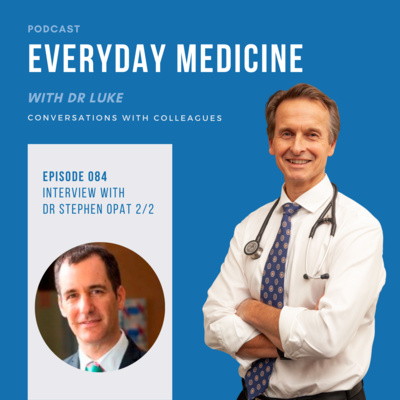
Everyday Medicine with Dr LukeEpisode 84. Lymphoma with Professor Stephen Opat (Part 2)Lymphoma is a clonal neoplastic proliferation of lymphoid cells (B cells, T cells and NK cells) and is the sixth most common malignancy reported in this country which makes it the most common hematologic malignancy with over 5000 cases diagnosed each year in Australia putting lifetime risk at 1 in 50.
There are over 70 different types of lymphoma which are divided into 2 main groups: Hodgkin's lymphoma accounts for 10% of cases and non-Hodgkin's lymphoma accounts for 90% of cases.
Hodgkin's lymphoma named after Thomas Hodgkin (1832) is more common in men, and tends to occur at a younger age than non-Hodgkin's...
2022-07-1231 min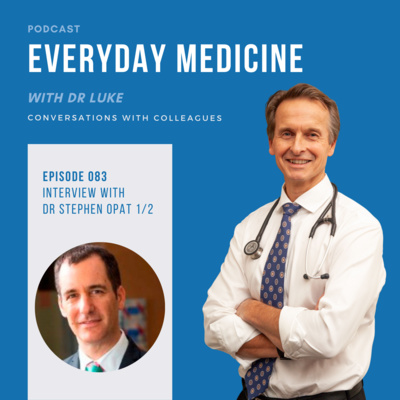
Everyday Medicine with Dr LukeEpisode 83. Lymphoma with Professor Stephen Opat (Part 1)Lymphoma is a clonal neoplastic proliferation of lymphoid cells (B cells, T cells and NK cells) and is the sixth most common malignancy reported in this country which makes it the most common hematologic malignancy with over 5000 cases diagnosed each year in Australia putting lifetime risk at 1 in 50.
There are over 70 different types of lymphoma which are divided into 2 main groups: Hodgkin's lymphoma accounts for 10% of cases and non-Hodgkin's lymphoma accounts for 90% of cases.
Hodgkin's lymphoma named after Thomas Hodgkin (1832) is more common in men, and tends to occur at a younger age than non-Hodgkin's...
2022-07-0530 min
Everyday Medicine with Dr LukeSpecial Episode 10. Monkeypox and Japanese Encephalitis with Dr Alex TaiIn May this year, new cases of the rare infection - Monkey Pox - typically limited to Africa, began spreading within Europe and North America.
More than 780 cases have now been reported across 15 countries with Australia recently reporting 8 cases.
www1.racgp.org.au - Monkeypox exposure, a member of the same family of viruses as smallpox and typically is spread through close physical contact with skin lesions, body fluids, respiratory droplets, and conta minated materials such as bedding and is much less infectious than respiratory illnesses such as Covid 19. Transmission of Monkey pox virus by...
2022-06-2839 min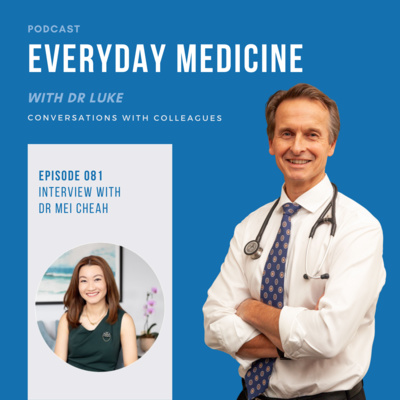
Everyday Medicine with Dr LukeEpisode 81. Polycystic ovary syndrome (PCOS) with Dr Mei CheahPCOS is the most common endocrinopathy of reproductive age women affecting about 1 in 10. Characteristically the condition presents with menstrual irregularity, excess androgens, and polycystic ovarian morphology. More common in women with a family history and type 2 diabetes the condition is associated with obesity, infertility, pregnancy complications and metabolic derangements as well as a number of psychological consequences.In this podcast we have a conversation with obstetrician and gynaecologist Dr Mei Cheah founder of Create Health a leading group of specialists in women's health creating visions for a healthy future, better well-being, and more informed patients. Create Health...
2022-06-1423 min
Everyday Medicine with Dr LukeEpisode 80. Endometriosis with Dr Mei CheahEndometriosis is the presence of endometrial tissue outside the uterus or embedded within its muscular wall. This unusual condition is known to induce a chronic inflammatory reaction that may be associated with pelvic pain and infertility. In women of reproductive age the estimated prevalence is 7 to 10% and up to one third of women undergoing laparoscopy for pelvic pain are diagnosed with endometriosis. Endometrial deposits may be deeply infiltrating, found in the abdomen and pelvic region may be invading the ovary but also found in the lungs, pleura and on the diaphragm. Ectopic endometrial tissue within the uterine myometrium is...
2022-06-0729 min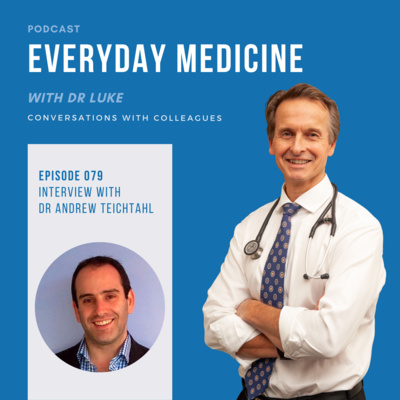
Everyday Medicine with Dr LukeEpisode 79. Investigations in Rheumatology with Dr Andrew TeichtahlIn this episode we explore investigations in rheumatology-what is helpful and what is not?
A clinician faced with a patient complaining of myalgias and generalised rheumatic aches may be tempted to order a host of immunological and inflammatory tests whilst also assessing multiple other differential diagnoses that need considering. There are a host of serological tests available each with different degrees of sensitivity and specificity for rheumatological conditions, furthermore it is important to understand the sensitivity (ability to rule out condition) and specificity (ability to rule condition in) is applied to such tests. Fortunately, we had the opportunity...
2022-05-3119 min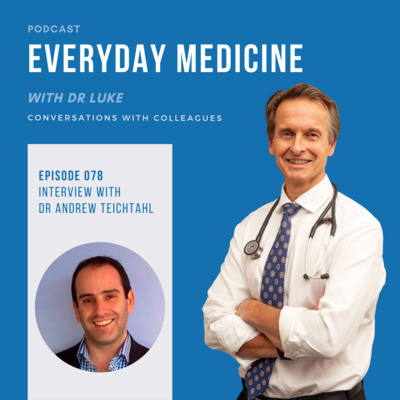
Everyday Medicine with Dr LukeEpisode 78. New Agents in Rheumatology with Dr Andrew TeichtahlThe past two decades have witnessed dramatic changes in the approach to managing rheumatologic conditions, born of a wider understanding of cellular biology, immunology, and the pathophysiology of inflammation we have consequently seen an explosion in the development and availability of both Biologic medications and small molecules for medical applications.
Some of these products are designed to interfere with cytokine function or production and include:
· TNF inhibitors
· TNF receptor fusion proteins
· IL6 inhibitors
· IL-17 inhibitors
· IL-12/23 inhibitors
· T-cell modulators
· B cell modulators
In addi...
2022-05-2440 min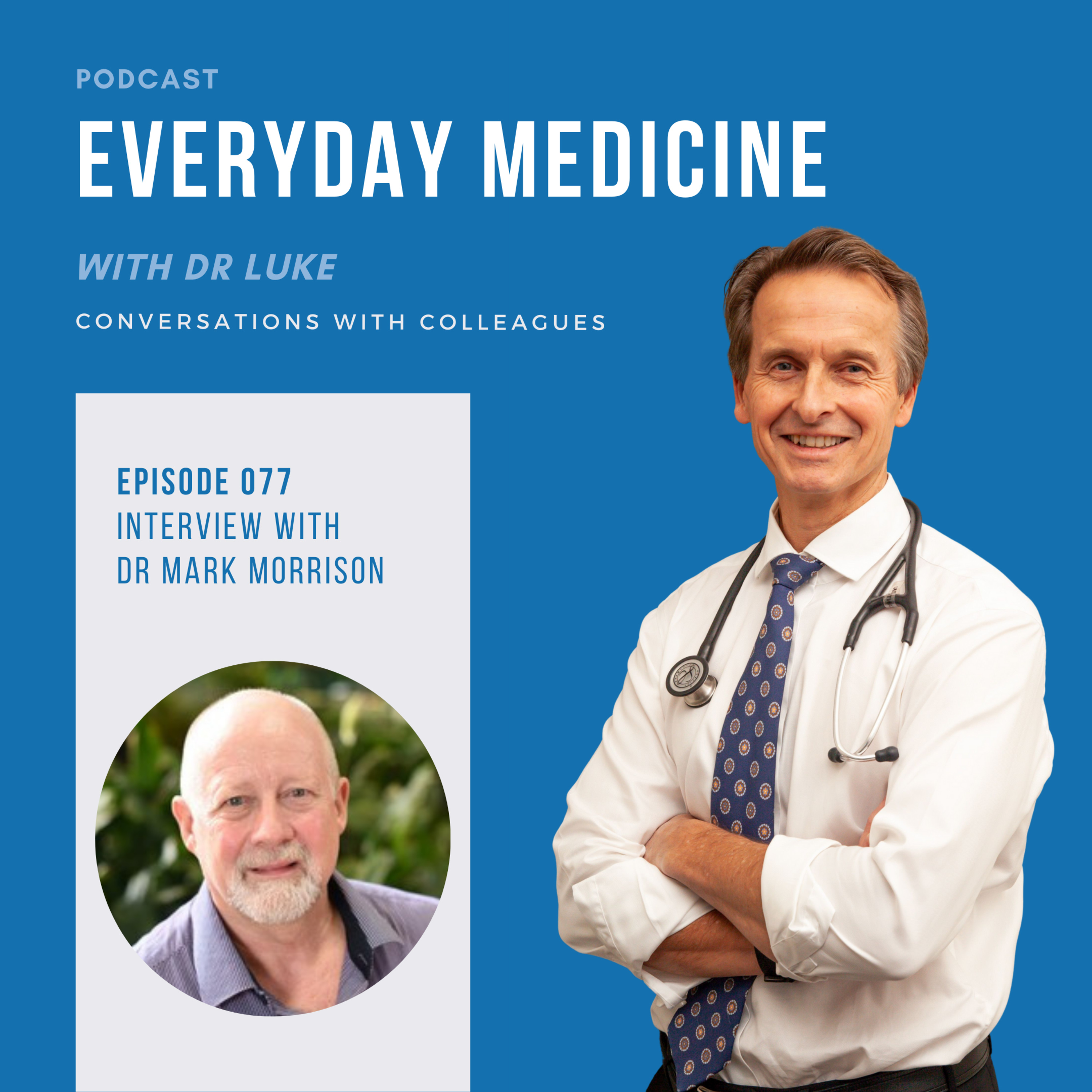
Everyday Medicine with Dr LukeEpisode 77. The Microbiome with Dr Mark MorrisonTrillions of microbes are living in and on us, a thriving ecosystem of bacteria, viruses, archaea and fungi. Collectively these microbes form the human microbiome and this microbiome appears to play a key role in many aspects of health, crowding out harmful microbial invaders, breaking down fibrous food into digestible compounds and producing some essential vitamins such as B12 and vitamin K. New research is exploring the relationship between the gut microbiome and immunogenicity, autoimmune inflammatory diseases, neoplasia and brain development and is searching ways to correct dysbiosis.
In this episode with Professor Mark Morrison, Chair of...
2022-05-1745 min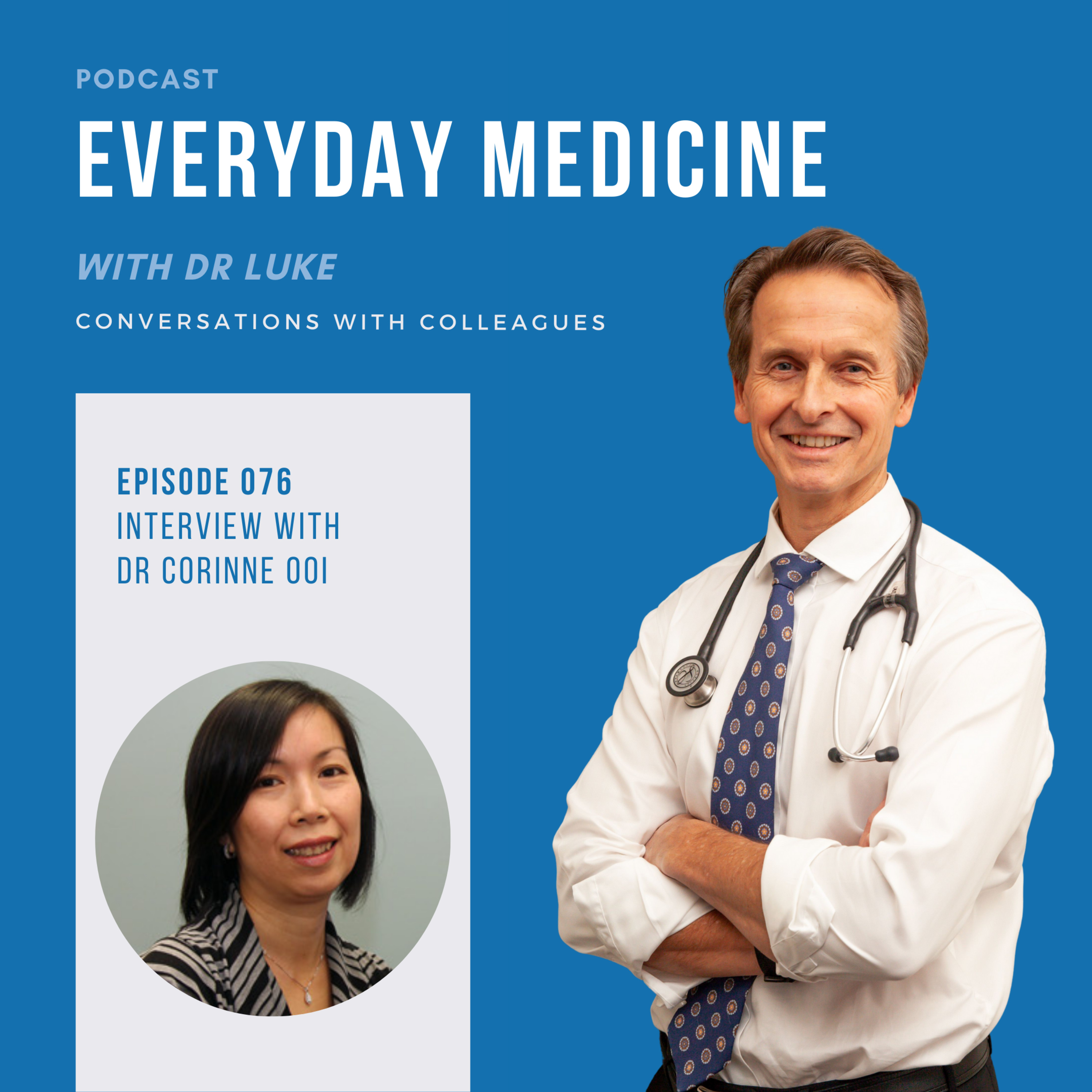
Everyday Medicine with Dr LukeEpisode 76. Breast Cancer with Dr Corinne OoiBreast cancer affects 1 in 7 women and remains the most diagnosed cancer in Australia with 57 new cases diagnosed each day, 1000 new cases per year and tragically 2000 deaths annually. Men are not excluded, for every 100 breast cancers one is diagnosed in a male. Genetic links for breast cancer such as the BRCA 1 and 2 genes receive significant attention but account for only 5% of total cases,75% of patients have no family history and additionally 75% of breast cancers are diagnosed in patients 50 years or older. Multiple risk factors including family history, young age of menarche and older age of menopause are frequently cited but...
2022-05-1045 min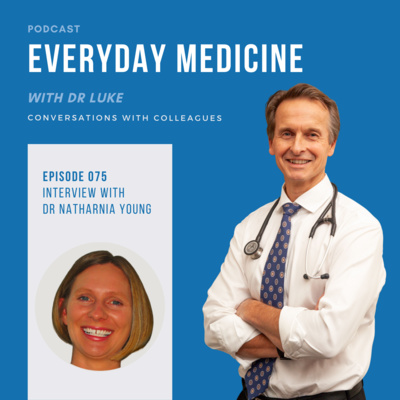
Everyday Medicine with Dr LukeEpisode 75. Urinary Incontintence in Women with Dr Natharnia YoungDr Natharnia Young is a leading urogynaecologist servicing South Eastern Melbourne’s suburbs and joins this conversation to discuss urinary incontinence in women, a condition associated with significant personal and social stigmatisation and affecting up to 1:2 women over the age of 70.
Rates of presentation by woman seeking management for stress incontinence and urge incontinence are low, perhaps on account of feelings of embarrassment and shame however there are many effective management strategies that Natharnia discusses in this very informative podcast episode. Please enjoy the conversation.
Useful references include:
Dr Natharnia Young – Australian Pelvic Floor Insti...
2022-05-0334 min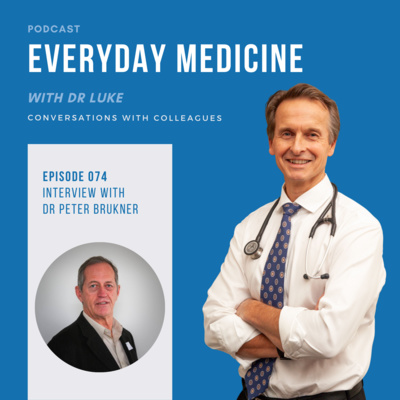
Everyday Medicine with Dr LukeEpisode 74. Sports Medicine and Supplements with Dr Peter BruknerDr Peter Brukner OAM is Professor of Sports Medicine at the Latrobe Sport and Exercise Medicine Research Centre and is one of Australia’s most respected and best-known specialist sports physicians with a wide breadth of knowledge of the subject. He has extensive experience, having enjoyed a stellar career with elite sports teams and Olympians over multiple decades in his professional capacity.
In this episode we discuss, several questions related to commonly used supplements taken by amateur and high-level athletes as well as delving into the darker realm of banned substances including anabolic steroids such as DHEA, te...
2022-04-2623 min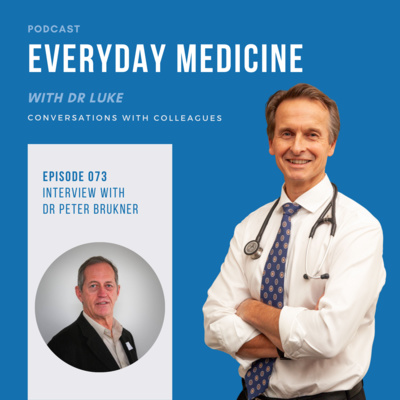
Everyday Medicine with Dr LukeEpisode 73. Sports Medicine and Low Carbohydrate Diet with Dr Peter BruknerDr Peter Brukner OAM is Professor of Sports Medicine at the Latrobe Sport and Exercise Medicine Research Centre at Latrobe University and is one of Australia’s most respected and best known specialist sports physicians. He has a deep breadth of knowledge and experience and was a founding partner at the Olympic Sports Medicine Centre in Melbourne as well as a sports physician to the Collingwood and Melbourne AFL clubs, Liverpool Football Club and has served as team doctor to the Australian cricket team, Socceroos and several Olympic teams. He has authored multiple best-selling books on sports medicine and mo...
2022-04-1932 min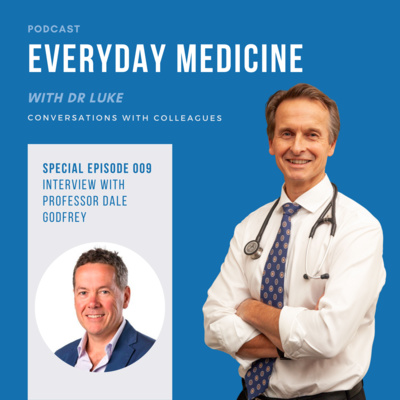
Everyday Medicine with Dr LukeSpecial Episode 9. New Vaccines with Professor Dale GodfreyThe Peter Doherty Institute was the first Australian laboratory to establish a Covid 19 PCR test and diagnose the first SARS-Cov 2 infection on Australian shores, its research scientist is heavily involved in developing novel diagnostic tools applied across many areas of medical science and the institute plays a key leadership role in advising state and federal government on best medical practice. It’s no great surprise therefore that we have learned of their ground-breaking development of a new subunit Covid 19 vaccine utilising the receptor binding domain at the tip of the virus’s spike proteins. This is the region responsible for...
2022-04-1220 min
Everyday Medicine with Dr LukeEpisode 72. Breaking Bad News and Admitting Error with Dr Bill Shearer and Dr Alan SaunderDelivering hard news to a patient or their relatives and admitting error can be one of the most difficult duties encountered by a doctor. Significant effort is now spent in teaching young training doctors techniques and strategies to avoid miscommunication and uncertainty in undertaking this complicated task whilst also remaining emotionally engaged and empathetic to their situation.
Rabow and McPhee have written eloquently on the subject of breaking difficult or bad news and have devised a mnemonic using the letters ABCDE as an excellent guide to this subject.
Accepting responsibility and apologising genuinely to a...
2022-04-0529 min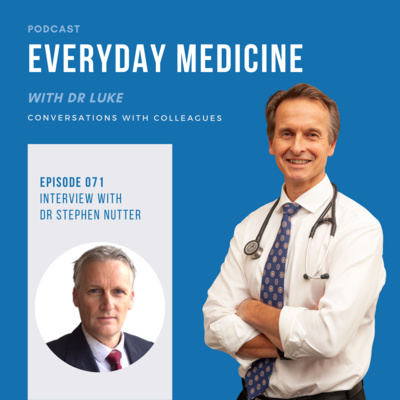
Everyday Medicine with Dr LukeEpisode 71. Chronic Pain with Dr Stephen NutterChronic pain affects about 1 in 5 people in Australia and is a common reason for patients to see their doctor and to seek treatment. As patients seek ever increasingly strong pharmacological therapies they may become increasingly depressed, fatigued and dislocated from society.
In this episode we have a very interesting conversation with Dr Stephen Nutter, we follow Stephen’s journey from anaesthetist to pain management consultant at Metro Pain Clinic and discuss his approach to:
· Non-pharmacological
· Pharmacological
· Interventional approaches to chronic pain management
Stephen provides us with his p...
2022-03-2819 min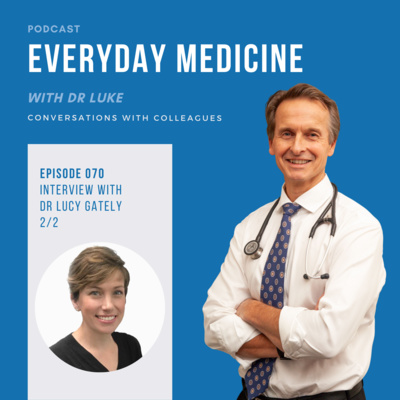
Everyday Medicine with Dr LukeEpisode 70. Familial Cancer Screen with Dr Lucy Gately - Part 2Genetic testing for cancer is important for a small number of families at increased risk due to the inheritance of genetic mutations. Most commonly this involves the inheritance of breast cancer genes such as the BRCA 1 and 2 or colorectal cancer genes such as the Lynch syndrome genes. Although these only represent a small percentage of total cancers reported there is significant public interest in these syndromes.
We have a further discussion with Dr Lucy Gately from the Cabrini Family Cancer Clinic in this episode in regard to the BRCA 1 and 2 genes on chromosome 17 inherited by 1:400 women and...
2022-03-2321 min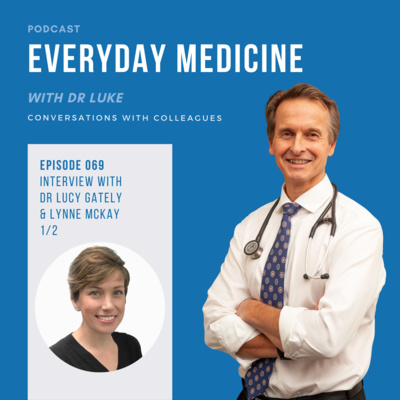
Everyday Medicine with Dr LukeEpisode 69. Familial Cancer Screening with Dr Lucy Gately and Lynne McKay - Part 1In the context of family cancer screening, genetic testing looks for specific inherited changes or variants in a person’s genes which may predispose them to an increased risk of developing a neoplasm. Harmful variants in some genes are known to be associated with an increased risk of developing specific cancers such as mutations to the BRCA 1 and 2 genes associated with breast and ovarian cancer and the Lynch genes associated with colorectal and endometrial cancer.
Alterations in tumour suppressor genes (loss of function) and proto-oncogenes (gains of function) are fundamental to our understanding of the science associated wi...
2022-03-1522 min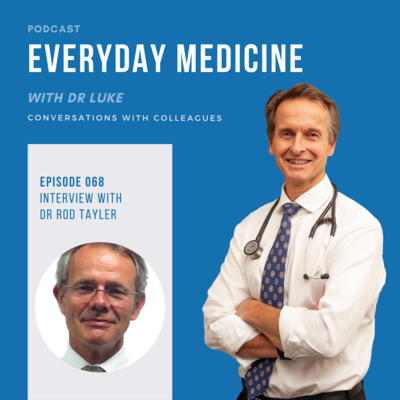
Everyday Medicine with Dr LukeEpisode 68. The Ketogenic Diet with Dr Rod TaylerThe ketogenic diet has recently become popular as an effective dietary approach to weight loss. The diet restricts carbohydrates to just 5-10% of total calories and relies on caloric intake from fats (55-60%) and proteins (30-35%) forcing metabolism to shift from gluconeogenesis to ketogenesis with the production of acetoacetate, beta-hydroxybutyrate and acetone – ketone bodies – as the usable energy source. People adopting this diet report a significant reduction in hunger, increase in energy, clarity of thought and reduction in chronic inflammatory conditions. Some are concerned the diet is difficult to maintain long term and may be risky in patients that are...
2022-03-0733 min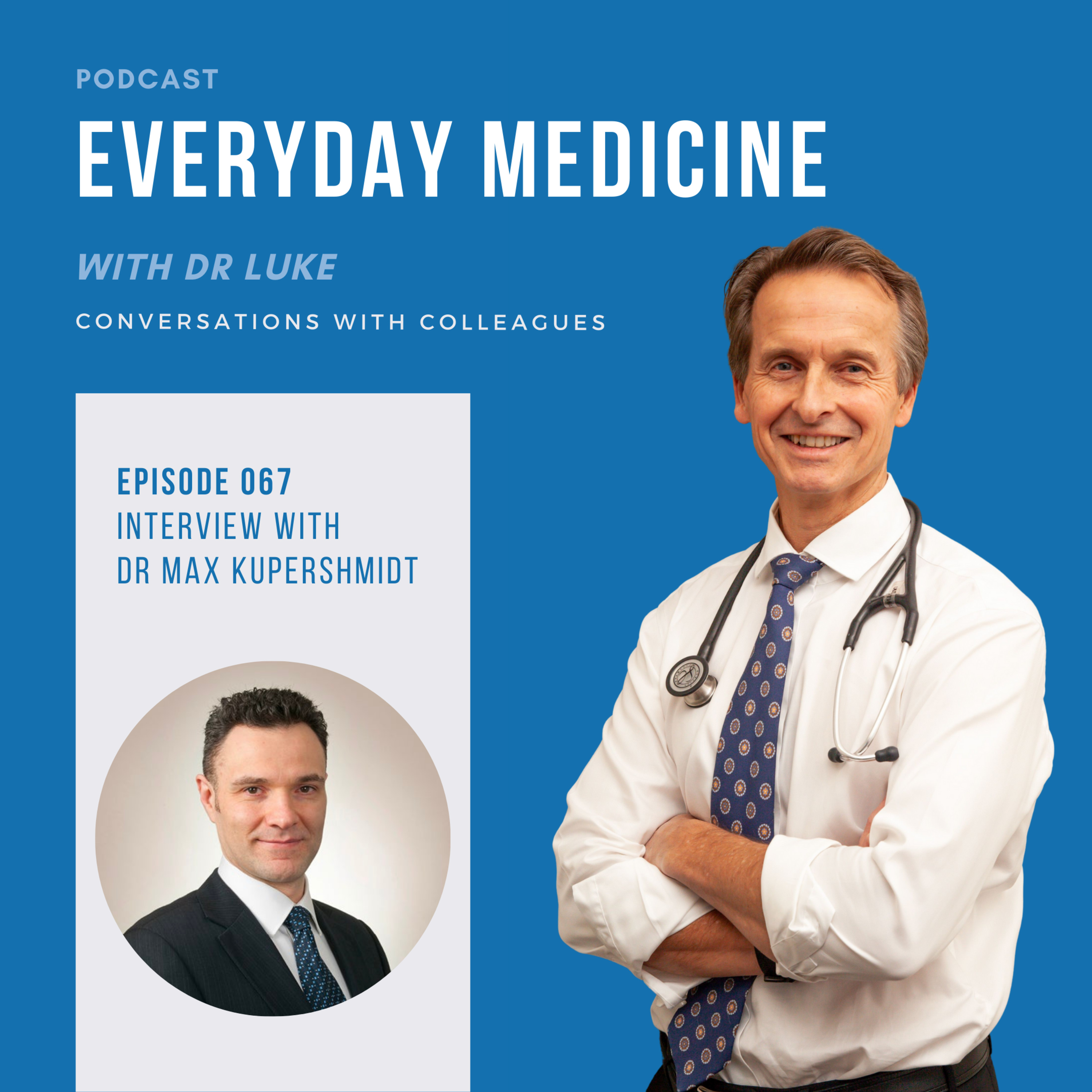
Everyday Medicine with Dr LukeEpisode 67. Back Pain with Dr Max KupershmidtBefore proceeding, we apologise for the audio quality in this week's episode. Unfortunately, we experienced some technical difficulties and we will endeavour to resolve these problems in future episodes of Everyday Medicine.
It is estimated that up to 80% of the population will experience back pain sometime in their lives with presentations from adolescent age to the elderly. Back pain is the third most common reason for visits to a medical practitioner and in many instances treatment strategies have already been sought elsewhere from chiropractors, physiotherapist myotherapists, personal trainers and osteopaths.
Radiological interrogation is often required to...
2022-02-2843 min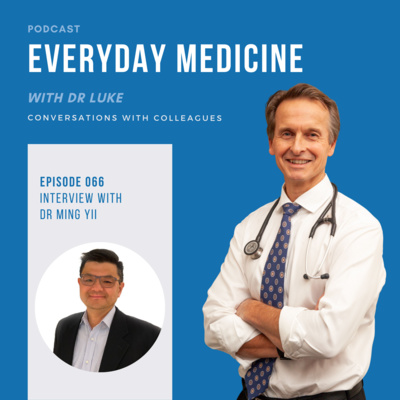
Everyday Medicine with Dr LukeEpisode 66. Diabetic Foot with Dr Ming YiiDiabetic foot is the name given to the condition commonly experienced by people with diabetic peripheral neuropathy and results in an insensitive and often deformed foot. Found in both type I and type II diabetic patients (of which there are 1.8 million living in Australia-one new diagnosis is made every 5 minutes), even minor trauma in the diabetic foot may lead to the development of an ulcer. The combination of impaired vascular supply from micro and macro vascular disease and neuropathy presents real challenges for healing. Consequently, diabetic foot ulcer is a major event in 85% of subsequent amputations and is the...
2022-02-2326 min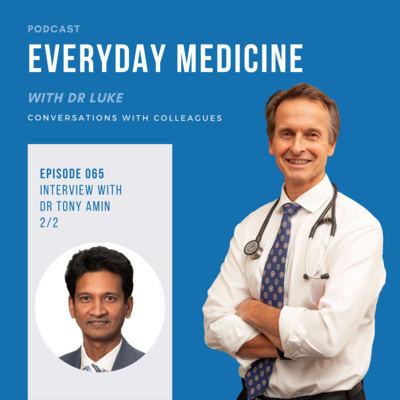
Everyday Medicine with Dr LukeEpisode 65. Renal Impairment with Dr Tony AminIt is common in clinical practice to identify patients with impaired renal function as determined by diminished glomerular filtration rate and elevated creatinine. The decision to undertake thorough work-up and investigation of such patients or to observe and monitor, removing any potential offending nephrotoxic agent, is a clinical problem we address in this podcast with expert nephrologist Dr Tony Amin, who considers:
· Acute kidney injury
· Chronic kidney injury
· Appropriate management and work up
· Intravenous contrast nephrotoxicity
This is a complex subject with multiple considerations which Tony outlines with great clar...
2022-02-1528 min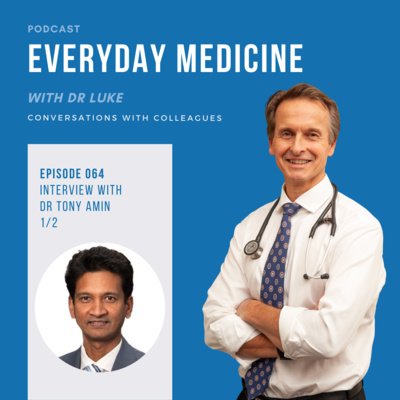
Everyday Medicine with Dr LukeEpisode 64. Hypo and Hypernatraemia with Dr Tony AminSodium is a major extracellular cation. Normal sodium concentrations range between 135 and 145 mmol/L. Alterations in sodium concentration, particularly hyponatraemia is the most common electrolyte disorder doctor’s encounter in clinical practice. Up to 20% of people admitted to hospital have hyponatraemia and it is estimated that 1.7% of population also have hyponatraemia.
It was enlightening to review this subject with Dr Tony Amin, nephrologist and public educator who discusses:
· The importance of assessment of serum and urine osmolality in conjunction with serum sodium and urinary sodium
· Assessment of patient’s volume status (hyper/hypovolemic)
...
2022-02-0835 min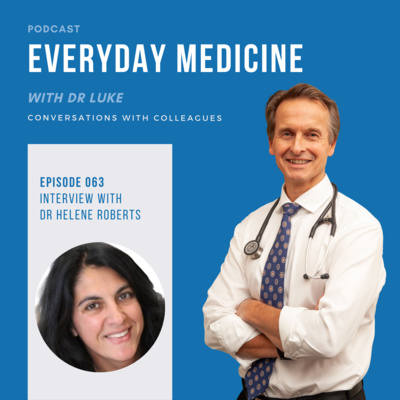
Everyday Medicine with Dr LukeEpisode 63. Dementia with Dr Helene RobertsThe consequences of dementia with short term memory loss, visuospatial dysfunction, executive dysfunction, apathy, word-finding difficulty and apraxia is devastating both to the patient and family. It is estimated that 1% of Australians aged 65 years have dementia and that almost half of our population over 85 years have dementia to varying degrees. Alzheimer’s (60% of cases), vascular dementia (15% of cases), Lewy body and frontotemporal (each 5% of cases) and other forms of dementia secondary to alcohol, trauma and neurodegenerative disorders reflect the main forms of dementia seen in our society.
In this podcast we engage expert neurologist and cognitive specialist Dr...
2022-02-0134 min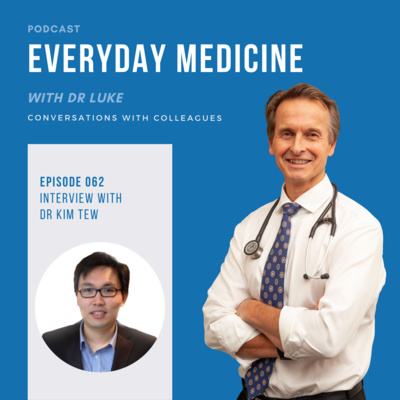
Everyday Medicine with Dr LukeEpisode 62. Falls in the Elderly with Dr Kim TewEach year in Australia, over 125,000 of our more elderly population are admitted to hospital consequent to a fall. About a third of people over the age of 65 years fall each year and this figure rises exponentially with age. In up to 10% of falls, serious injuries such as fractures (a third of which are hip), soft tissue injuries and direct brain injuries arise. Falls and injuries from falls have serious implications and consequences.
In this podcast episode we are joined by geriatrician Dr Kim Tew who discusses:
· The complex relationship between balance, ambulation, cognitive function, neuromuscular f...
2022-01-2422 min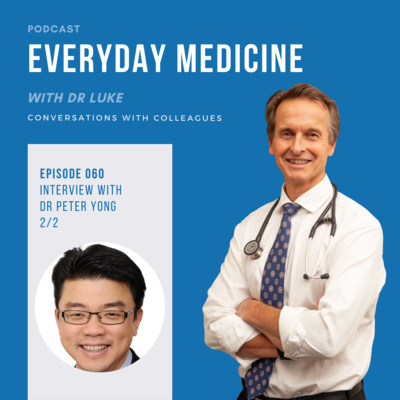
Everyday Medicine with Dr LukeEpisode 61. Infertility with Dr Peter YongCouples are said to be infertile if pregnancy does not result after a year of carefully timed sexual activity without the use of contraceptives and is estimated to affect up to one in six Australian couples. It is also estimated that male partners contribute approximately 40% to cases of infertility, the same percentage as women. In a third of couples, a combination of male and female factors both need consideration. Today, women in Australia are 31 years of age before their first child is born compared to a generation ago where women on average were 24 years of age, this change in...
2022-01-1724 min
Everyday Medicine with Dr LukeEpisode 60. Altered Uterine Bleeding with Dr Peter YongAltered uterine bleeding is estimated to affect 10-30% of women in midlife and constitutes about a third of outpatient gynaecological reviews. There are many aetiologies to consider including leiomyomas (fibroids), endometrial pathologies, polyps, malignancy, platelet dysfunction and coagulopathies.
In this conversation, we are joined by expert obstetrician and gynaecologist Dr Peter Yong who completed his undergraduate medical training in Singapore before undertaking postgraduate training in obstetrics and gynaecology in Scotland. He has a special interest in infertility and assisted conception and was awarded the gold medal in the membership examination at the Royal College of Obstetricians and...
2022-01-1015 min
Everyday Medicine with Dr LukeEpisode 60. Altered Uterine Bleeding with Dr Peter YongAltered uterine bleeding is estimated to affect 10-30% of women in midlife and constitutes about a third of outpatient gynaecological reviews. There are many aetiologies to consider including leiomyomas (fibroids), endometrial pathologies, polyps, malignancy, platelet dysfunction and coagulopathies.
In this conversation, we are joined by expert obstetrician and gynaecologist Dr Peter Yong who completed his undergraduate medical training in Singapore before undertaking postgraduate training in obstetrics and gynaecology in Scotland. He has a special interest in infertility and assisted conception and was awarded the gold medal in the membership examination at the Royal College of Obstetricians and...
2022-01-1015 min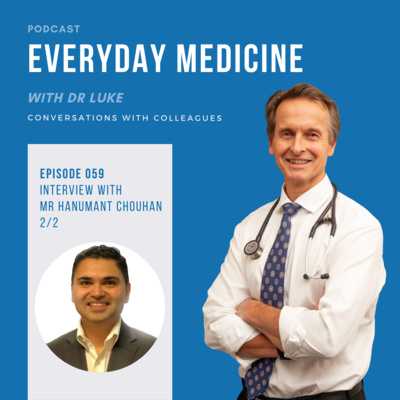
Everyday Medicine with Dr LukeEpisode 59. The malignant polyp with Mr Hanumant ChouhanThe detection of colorectal polyps is of critical importance in the prevention of colorectal cancer. Studies have demonstrated that colorectal cancer arises from colorectal polyps in more than 95% of cases. Fortunately most polyps do not become malignant (less than 1%) and it is known that less than 5% of all colonic adenomas harbour malignancy. The National Bowel Cancer Screening Program has been a government initiative to assist in the detection of early cancers and malignant polyps through the detection of occult haemoglobin in stool and some larger clinical trials have demonstrated the benefits of screening population this way. Once a malignant...
2022-01-0318 min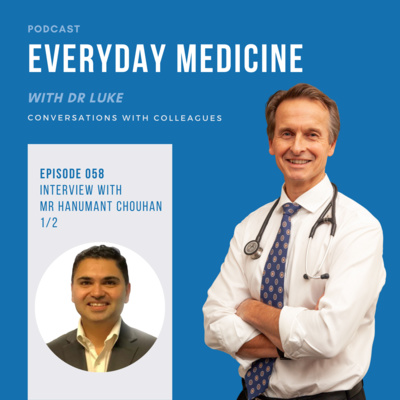
Everyday Medicine with Dr LukeEpisode 58. Rectal Bleeding with Mr Hanumant ChouhanRectal bleeding is a very important clue to the possibility of serious internal colonic pathology. Whilst our approach to work up of patients with rectal bleeding is determined by the description of blood, the age of the patient and background history, it is extremely important not to overlook rectal bleeding as a possible early sign of a malignant polyp, premalignant polyp, colorectal malignancy or inflammatory bowel disease.
To discuss this subject in more depth we are joined by the very well-trained colorectal surgeon Hanumant Chouhan who discusses:
· Approach to rectal bleeding guided by patients’ age and...
2021-12-2719 min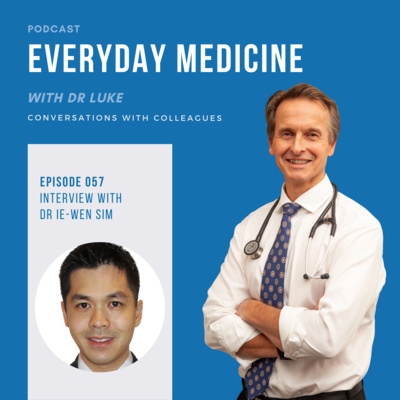
Everyday Medicine with Dr LukeEpisode 57. Metabolic Bone Disease with Dr Ie-Wen SimMetabolic bone disease is common, it is estimated that about 4.75 million Australians have either osteopenia or osteoporosis. Osteoporosis affects up to 23% of women and 6% of men over the age of 50 with a markedly increased risk of minimal trauma fractures including hip fracture with increased morbidity and mortality. Osteoporosis is characterised by microscopic architectural deterioration of bone structure, loss of bone mass and a change in bone metabolism and can be confirmed by dual-energy x-ray absorptiometry (DEXA scan). Until recently 70-85% of patients presenting with a minimal trauma fracture have tended to be both under investigated for osteopenia and osteoporosis...
2021-12-2140 min
Everyday Medicine with Dr LukeEpisode 56. Central mediated abdominal pain syndrome with Dr Olivia OngCentrally mediated abdominal pain syndrome is a chronic recurrent condition that is not related to bowel function, diet or definite organic pathology such as inflammatory bowel disease, diverticulosis, vascular syndromes nor neoplasia.
It appears to be secondary to nerve sensitisation and may develop after significant emotional trauma or gastrointestinal infections.
The syndrome may be highly intrusive and distressing but can be managed by a multipronged approach drawing upon hypnosis, cognitive behavioural therapy and pharmacotherapy including antidepressants with deliberate avoidance of narcotics.
In this episode, we have a conversation with an amazing pain physician-Dr O...
2021-12-1331 min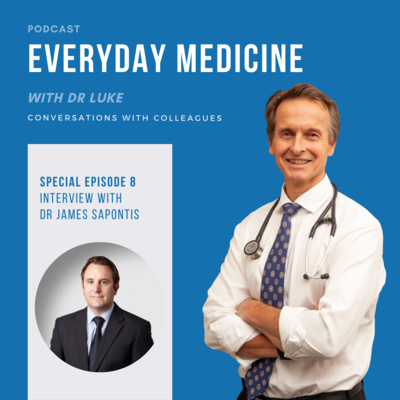
Everyday Medicine with Dr LukeSpecial Episode 8. Myocarditis and Pericarditis in COVID19 patients with Dr James SapontisCovid vaccine induced Pericarditis-Myocarditis
Since the release of mRNA vaccines medical practitioners around the world have been receiving calls from patients complaining of chest discomfort typical of pericarditis some of these patients have also had associated ECG changes and cardiac enzyme elevation consistent with myocarditis. This phenomenon does not appear to be related to the non mRNA vaccines available.
As of the 14th of November Australian data shows there have been 329 reports of likely myocarditis from 23.4 million delivered mRNA vaccine doses, a further 592 suspected but not confirmed cases and 1370 episodes of pericarditis. Based on this t...
2021-12-0620 min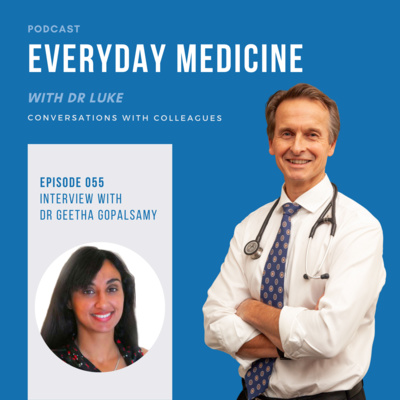
Everyday Medicine with Dr LukeEpisode 55. Polyps with Dr Geetha GopalsamyPolyps are discreet mass lesions that protrude into the intestinal lumen and represent a very important precancerous pathology to be identified and removed at colonoscopy. Up to 95% of adenocarcinomas arise from polyps, such cancers develop either after inactivation of the APC gene (for adenomas) or by KRAS mutation or BRAF oncogene activation with methylation of promoter regions for the serrated polyp pathway. As colorectal cancer is one of the most commonly diagnosed cancers in Australia, with up to 1 in 18 males and 1 in 25 females developing cancer in their lifetime, identification and removal of polyps as demonstrated by the National Polyp...
2021-11-2923 min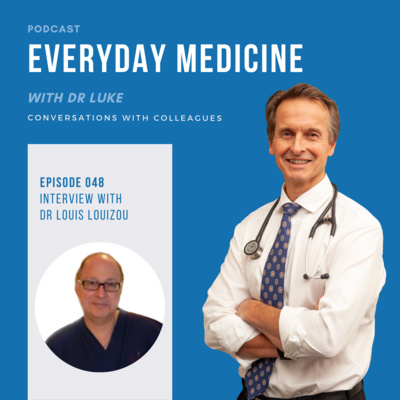
Everyday Medicine with Dr LukeEpisode 54. Varicose Veins with Dr Louis LouizouUp to 23% or more of Australians have varicose veins which may include small spider telangiectasias to large cosmetically challenging varicosities. In this episode we talk with phlebologist Louis Loizou who runs a very successful vein solution clinic in the community where he manages patients with all presentations of varicose veins, large, small, spider veins – he is able to find a solution for all. Louis is a past vice president and honorary secretary of the Australian College of Phlebology.
Louis discusses how he manages patients at his busy outpatient clinic that has been providing services to patients in Me...
2021-11-2220 min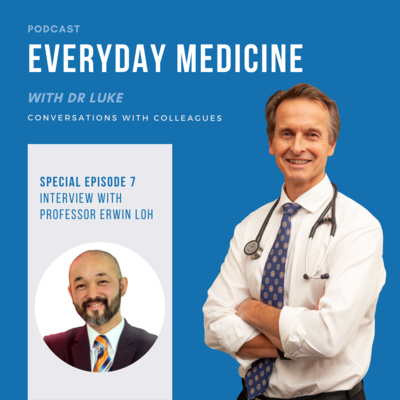
Everyday Medicine with Dr LukeSpecial Episode 7: COVID19 now and in the future with Professor Erwin LohNewfound freedom from lockdown in both Victoria and New South Wales will undoubtedly lead to greater COVID-19 exposure. Whilst widespread vaccination uptake has been achieved a significant number of adults and our children remain unvaccinated and vulnerable to the Delta strain. What can we expect from the health perspective for those exposed?
What are the health departments rules governing exposure? Is there a plan for rapid antigen testing in our community and what about version 2.0 of the vaccines?
Join me with Professor Erwin Loh, Chief Medical Officer from St Vincent’s health who has a su...
2021-11-1528 min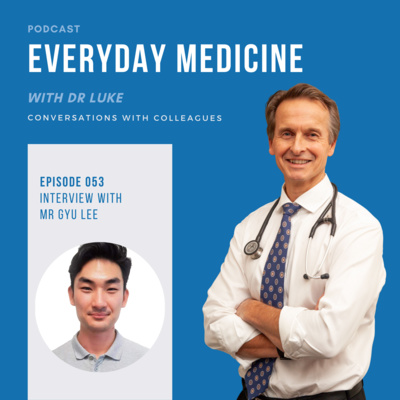
Everyday Medicine with Dr LukeEpisode 53. Drug Harm Reduction with Gyu LeeIn this podcast we have a conversation with Gyu Lee who works with Victoria Alcohol and Drug Counselling Service as a harm reduction practitioner managing patients in the community who have developed addictions to both alcohol and drugs. Management techniques include close engagement with referred clients and an approach based on:
· Behavioural modification
· Pharmaceutical intervention
· Job rehabilitation
Whilst there has been a reduction in methamphetamine use in Australia from 2001 to 2019 use of cocaine and methylenedioxymethamphetamine (MDMA – ecstasy) have both increased. These drugs combined with alcohol addiction pose major social problems for our c...
2021-11-0823 min
Everyday Medicine with Dr LukeEpisode 52. Globus with Mr Adnan SafdarGlobus pharyngeus in an intermittent or persistent non-painful sensation of a lump or foreign body in the throat. First described 2,500 years ago by Hippocrates who thought the condition was secondary to pressure on the thyroid cartilage from contractions of the strap muscles of the neck, we now know that globus is a relatively common condition representing up to 4% of ENT referrals and may be seen in just less than half of healthy individuals at some point in time. Gastro-oesophageal reflux disease and hypertonicity of the upper oesophageal sphincter are very important contributors to the sensation.
In this...
2021-11-0215 min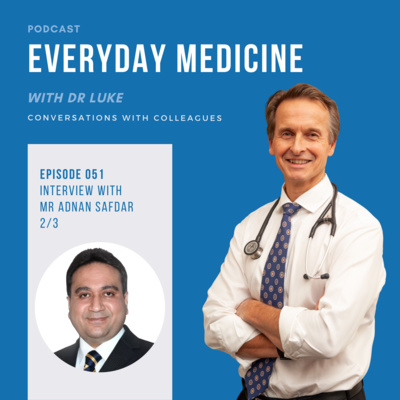
Everyday Medicine with Dr LukeEpisode 51. Facial Pain with Mr Adnan SafdarFacial pain is a common presenting complaint in primary practice, in many cases the aetiology can be ascertained from a detailed history and examination, however the source of pain may also be obscure including referred pain from the oral cavity as well as neurological, vascular and psychogenic disorders.
We are joined today by experienced ENT surgeon Mr Adnan Safdar, Head of the ENT Unit at Monash Health, to discuss a logical approach to facial pain management.
Adnan covers:
· Common aetiologies
· Involvement of the sinuses
· Practical management and tips
Pl...
2021-10-2512 min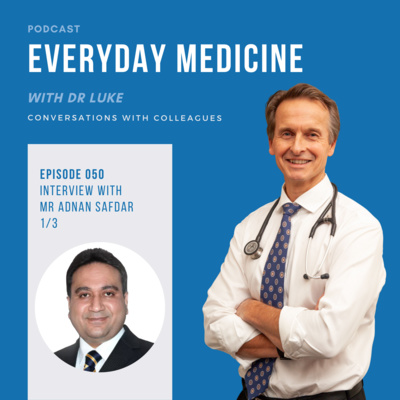
Everyday Medicine with Dr LukeEpisode 50. Otalgia with Mr Adnan SafdarEar pain or otalgia as a diagnostic problem presents commonly to primary health physicians. Otalgia may be primary, arising from the external auditory canal (otitis externa) or the middle ear (otitis media) or secondary. As the sensory innervation of the ear is richly supplied by branches of the trigeminal, facial, glossopharyngeal, vagal nerve as well as upper cervical nerves it is not surprising that many secondary causes of earache including TMJ dysfunction, dental infections and neoplasias may also be responsible for otalgia.
We are joined today by experienced ENT surgeon and head of ENT unit at Monash H...
2021-10-1822 min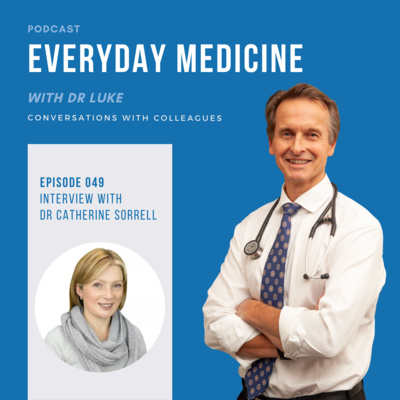
Everyday Medicine with Dr LukeEpisode 49. IBS with Dr Catherine SorrellIrritable bowel syndrome is an idiopathic clinical entity characterised by chronic (more than six months) abdominal pain that occurs in association with altered bowel habits. In 2016 the Rome IV Consensus report adjusted the diagnosis to include symptoms occurring at least once a week from a previous definition of three times a month and include the notation of abdominal pain rather than discomfort related to defaecation. In practical terms, irritable bowel syndrome is in part a diagnosis of exclusion, however, in younger patients without alarm symptoms a simple stool test for calprotectin rather than extensive endoscopic work up may be...
2021-10-1132 min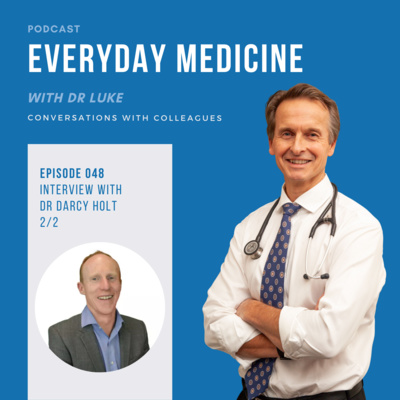
Everyday Medicine with Dr LukeEpisode 48. Eosinophilic Oesophagitis with Dr Darcy HoltNow recognised as one of the most common conditions underlying food impaction events, eosinophilic oesophagitis (EOE) has an estimated prevalence of 0.4% among both children and adults. EOE is a chronic inflammatory disorder characterised by oesophageal dysfunction and eosinophil predominant inflammation. Relatively recently described we may speculate as to whether this is a truly new disease or a more recently recognised one.
To discuss EOE in more detail we are joined by experienced gastroenterologist Dr Darcy Holt. In this conversation Darcy includes:
· Description of EOE (endoscopic and histologic findings)
· Common presentation
· Appropriate man...
2021-10-0420 min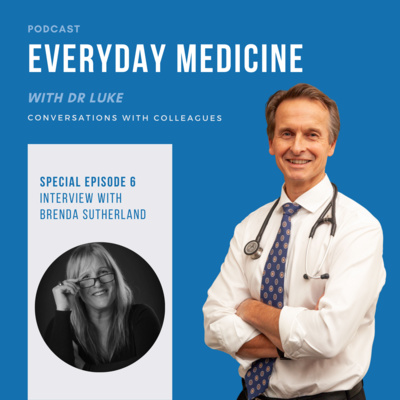
Everyday Medicine with Dr LukeSpecial Episode 6. Mental Health in a time of Covid (and the polyvagal ladder) with Brenda SutherlandMental health has become a major casualty of the Covid pandemic that has swept across the globe and been responsible for rolling lockdowns throughout Australia restricting personal freedoms, social contact and the ability to prosper financially. No one is exempt from this unprecedented event and the anxiety, depression and anguish wrought is having a major effect on the health and wellbeing of our communities.
To discuss the indicators that a patient or friend may be experiencing evolving or established mental health difficulties and learning methods for shifting patients holistically out of collapse we have a conversation with...
2021-09-2728 min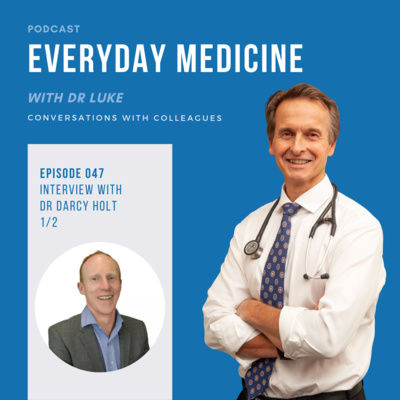
Everyday Medicine with Dr LukeEpisode 47. Helicobacter Pylori with Dr Darcy HoltHelicobacter pylori is a gram-negative curved bacillus that may colonise the gastric and proximal duodenal mucosa. Its significance was first described by Barry Marshall and Robin Warren in 1982 both of whom were awarded the Nobel prize in 2005 after the Nobel community described the discovery as the most impacting in medical sciences. Most medical practitioners are aware of the pathophysiological consequences of Helicobacter which is responsible for gastritis, gastric and duodenal ulcer disease, and may be associated with gastric adenocarcinoma as well as mucosa associated lymphoid tissue hyperplasia (MALT lymphoma). Its eradication has largely hinged on standard triple therapy including...
2021-09-2019 min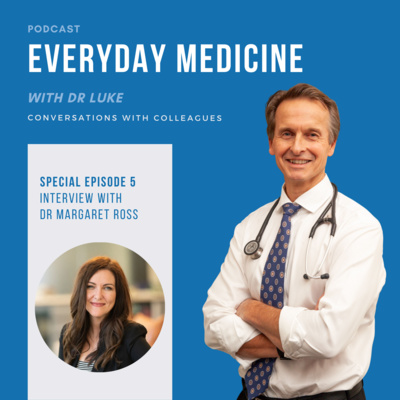
Everyday Medicine with Dr LukeSpecial Episode 5. Psilocybin assisted psychotherapy with Dr Margaret RossThe burden of mental health to Western society ranks amongst the leading causes of overall clinical presentations and the impact of anxiety, depression, addiction, substance abuse and PTSD can be devastating both to individuals and society. Recognition that psychedelic therapies may offer a profound benefit in the treatment of these conditions has rekindled a renaissance in their use, in particular of psilocybin from Psilocybe cubensis or “magic” mushrooms. The Australian Psilocybin Assisted Psychotherapy study at St Vincent’s focusing on end of life anxiety and depression is providing fascinating insights into the place and future use of these compounds.
...
2021-09-1436 min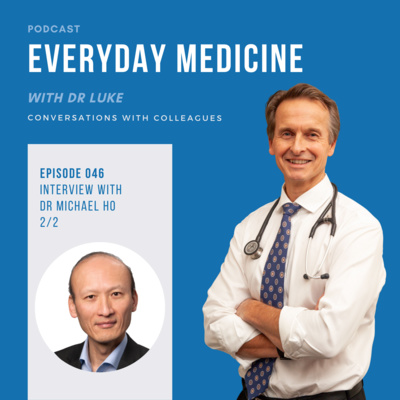
Everyday Medicine with Dr LukeEpisode 46. Obstructive Sleep Apnea with Dr Michael HoObstructive sleep apnoea is common, it is estimated that 49% of men aged 40-69 have obstructive sleep apnoea rising to 62% above the age of 70. Up to 1 in 10 have undiagnosed obstructive sleep apnoea which may present with snoring, daytime somnolence, depression and significant hypoxemia during sleep with associated cardiac arrhythmias.
To discuss this subject in more detail we are joined by experienced respiratory physician Dr Michael Ho in a conversation including:
· Definition of obstructive sleep apnoea
· Associated conditions and sequela
· Polysomnography
· Appropriate management
Please join me in this interesting podc...
2021-09-0620 min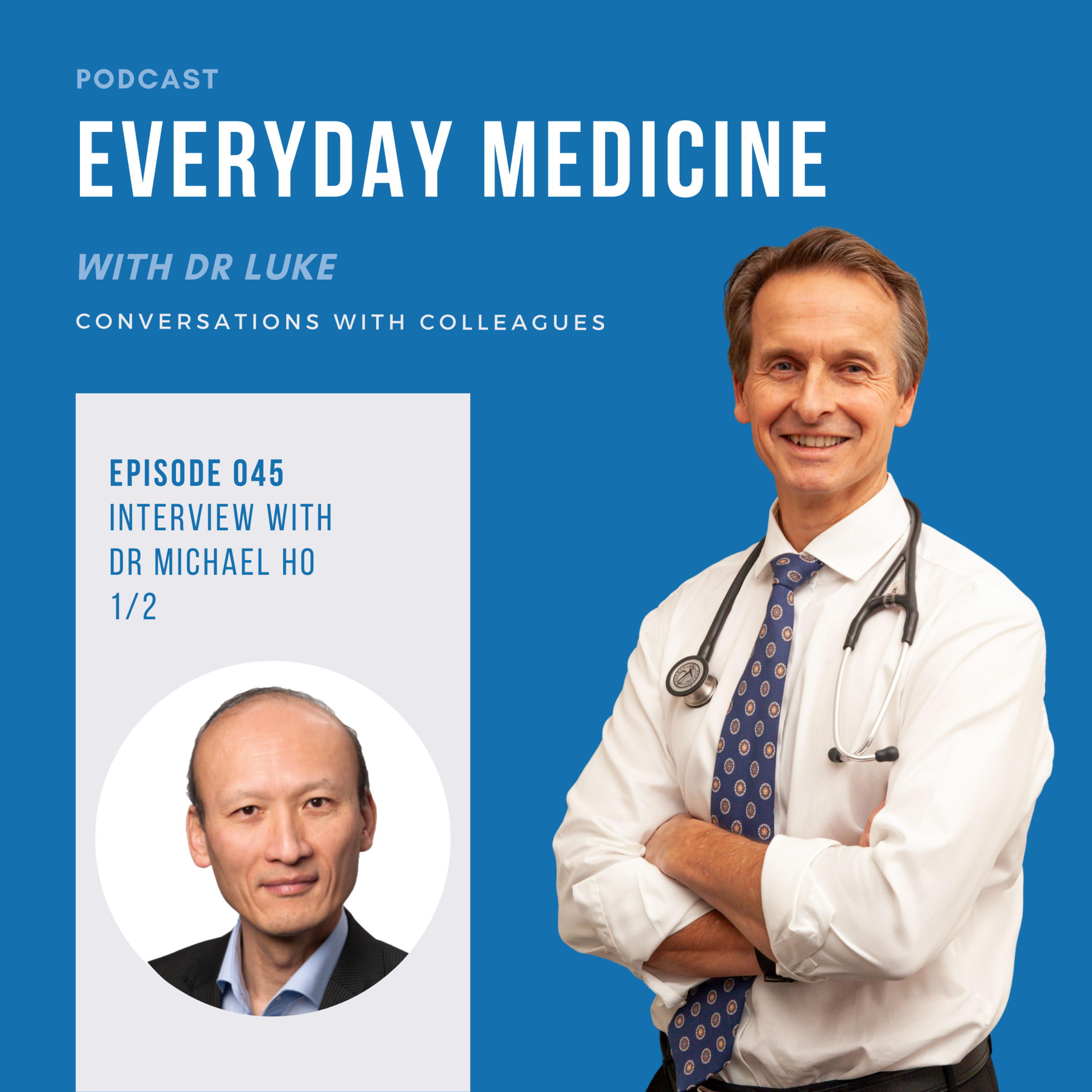
Everyday Medicine with Dr LukeEpisode 45. Asthma with Dr Michael HoAustralia has one of the highest rates of asthma in the world affecting about 11% of the population and in 2017/18 was responsible for 38,792 hospital admissions and 389 deaths, many of which may have been preventable. Asthma occurs when there is reversible expiratory constriction of the airways, especially the bronchioles and smaller bronchi, in response to various stimuli associated with a chronic inflammatory process. Today we are joined by Dr Michael Ho, an experienced respiratory physician who discusses:
· Aetiology of asthma
· Non-drug approaches to management
· Pharmacological approaches to treatment
· Thunderstorm asthma
Please join...
2021-08-3034 min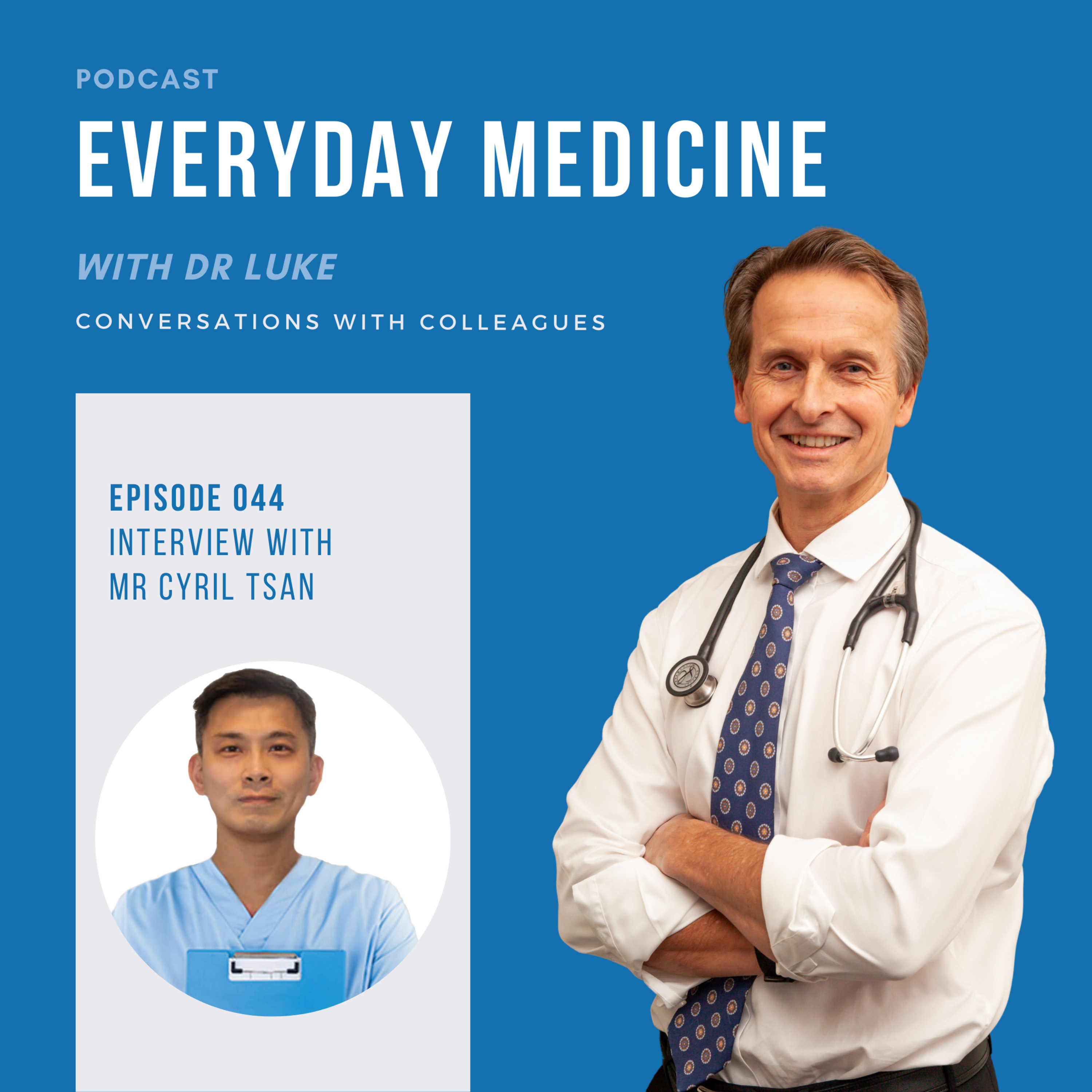
Everyday Medicine with Dr LukeEpisode 44. Thyroid Nodules with Mr Cyril TsanThyroid nodules are common, in some ultrasound series at least 30% of adults are found to have nodules and 4-7% of adults will have a palpable nodule. Whilst the overall risk of malignancy within a nodule is less than 5%, this is dependent on thyroid imaging reporting and data system (TI-RADS) which reflects features such as size of the nodule, presence of microcalcification, cyst complexity, whether the cyst is taller than wider and the presence of intranodular vascular images.
We are joined by expert thyroid and breast surgeon Mr Cyril Tsan in this episode, who provides clarity in discussing a...
2021-08-2325 min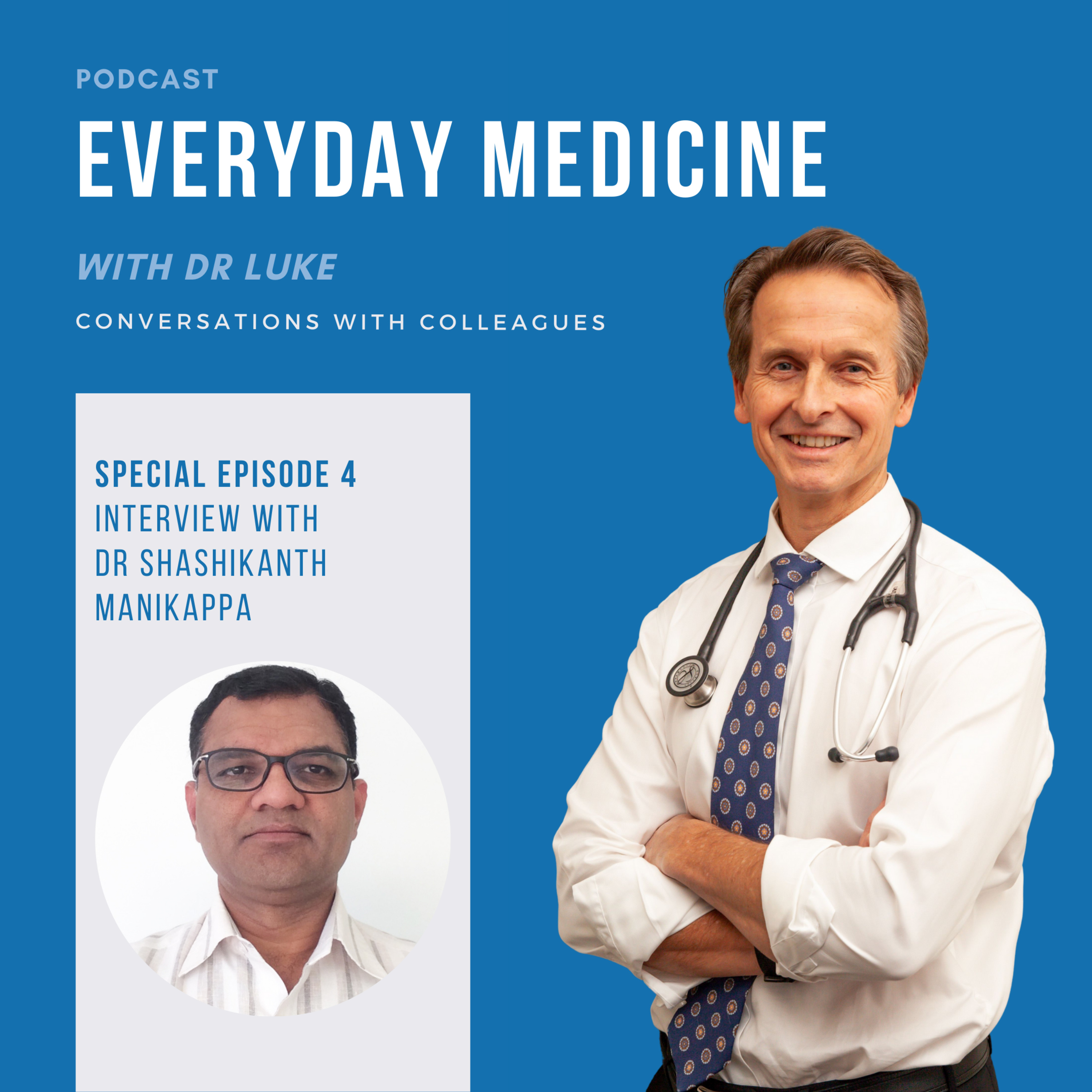
Everyday Medicine with Dr LukeSpecial Episode 4. Covid-19: My Indian Experience with Dr Shashikanth ManikappaIn this episode, we share an intimate conversation with Dr Shashi Manikappa who has spent the past 18 months in India’s heartland volunteering medical care to those affected by the Covid pandemic. Whilst over 400 million Indians have received at least one dose of vaccine to date, on the ground in India treatment protocols embracing the use of Ivermectin in combination with other drugs have gained significant popularity and anecdotal support as an effective treatment. Shashi discusses the value of these protocols as used in India and the medical experience and perspective gathered during his time there. It is acknowledged th...
2021-08-1650 min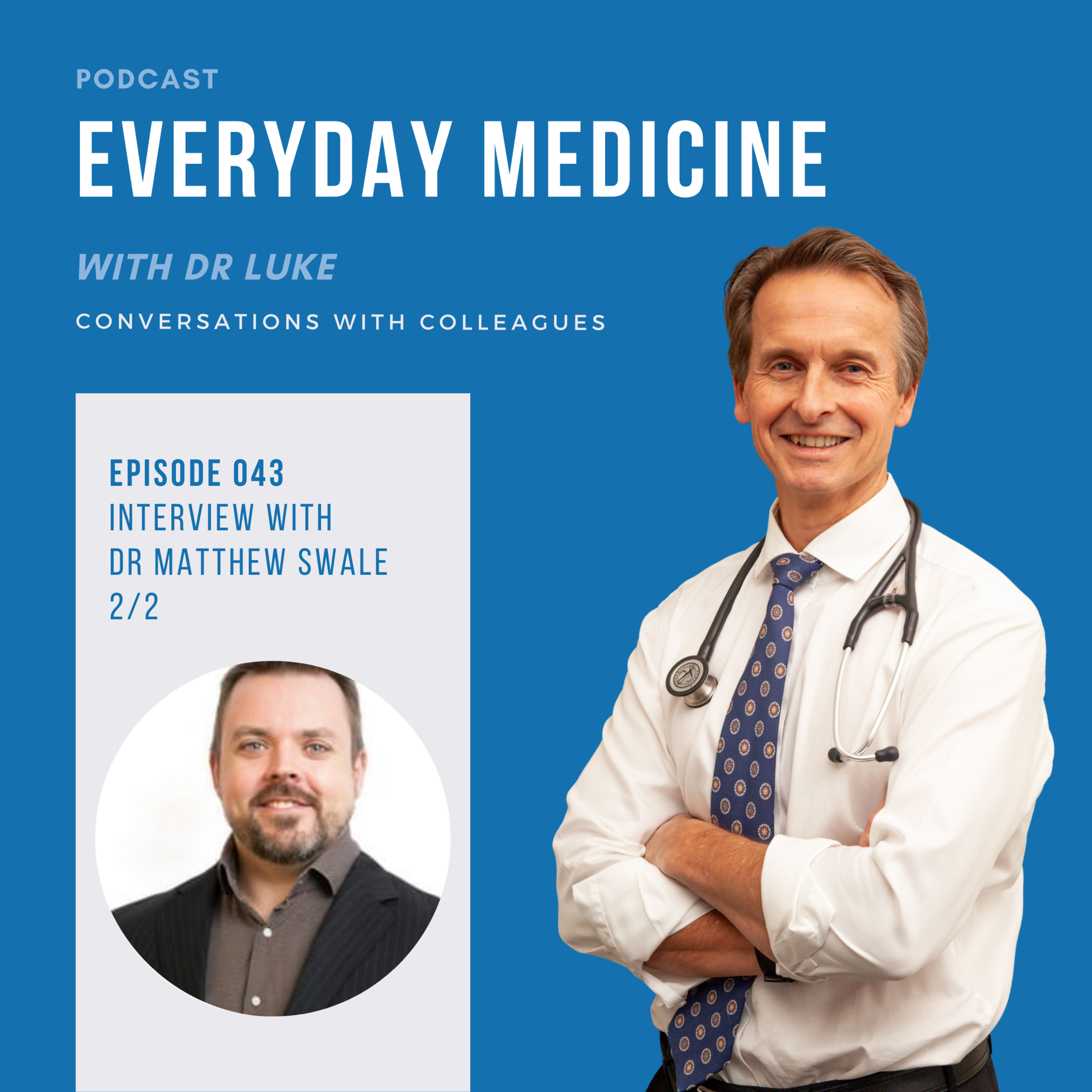
Everyday Medicine with Dr LukeEpisode 43. Radiofrequency Ablation with Dr Matthew SwaleRadiofrequency ablation (RFA) has revolutionised treatment for tachyarrhythmias and has become first line treatment for some tachycardias. Some arrhythmias are relatively common, atrial fibrillation for example affects up to 9% of our population over the age of 80 years and provides a very significant risk for thromboembolic stroke, haemorrhagic stroke as well as impairment of quality of life whilst also contributing to heart failure.
Since the pioneering work in 1998 of Michel Haissaguerre, RFA has become widely accepted therapy and we are fortunate to have a discussion today with expert electrophysiologist and cardiologist Matthew Swale regarding:
· RFA
2021-08-0920 min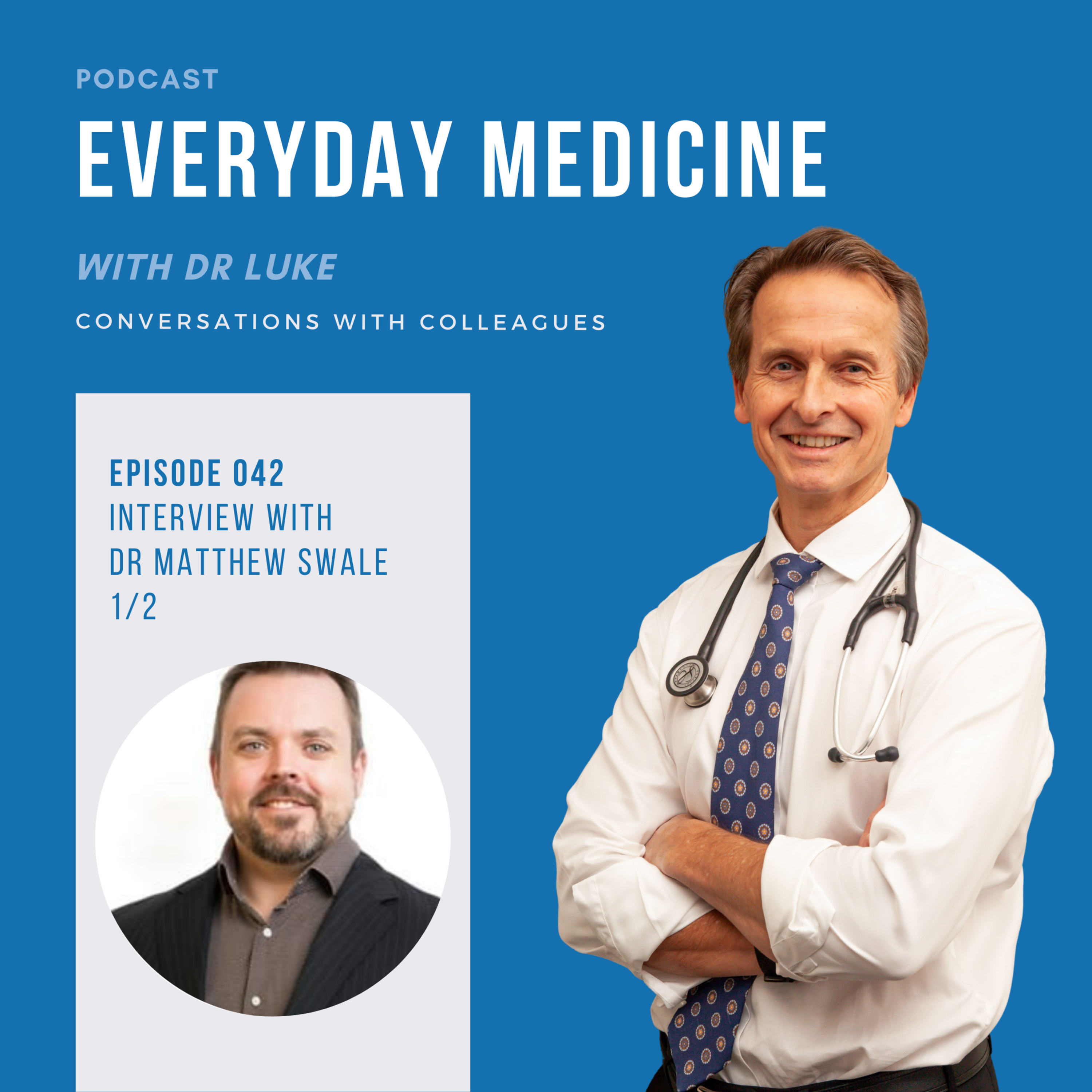
Everyday Medicine with Dr LukeEpisode 42. Atrial Fibrillation and DOAC's with Dr Matthew SwaleAtrial fibrillation is the most commonly experienced arrhythmia increasing in prevalence with age. It is estimated that 3 in 1000 under the age of 65 years have atrial fibrillation rising to 9% of people reaching the age of 80 years. The rate of stroke in untreated atrial fibrillation ranges from 5% per year with minimally associated risk factors up to 15-20% per year with associated risk factors such as hypertension, diabetes mellitus, heart failure and a history of vascular disease. The mortality of atrial fibrillation related to stroke is high and estimated at 25% in 12 months.
Not only is it very important to recognise...
2021-08-0231 min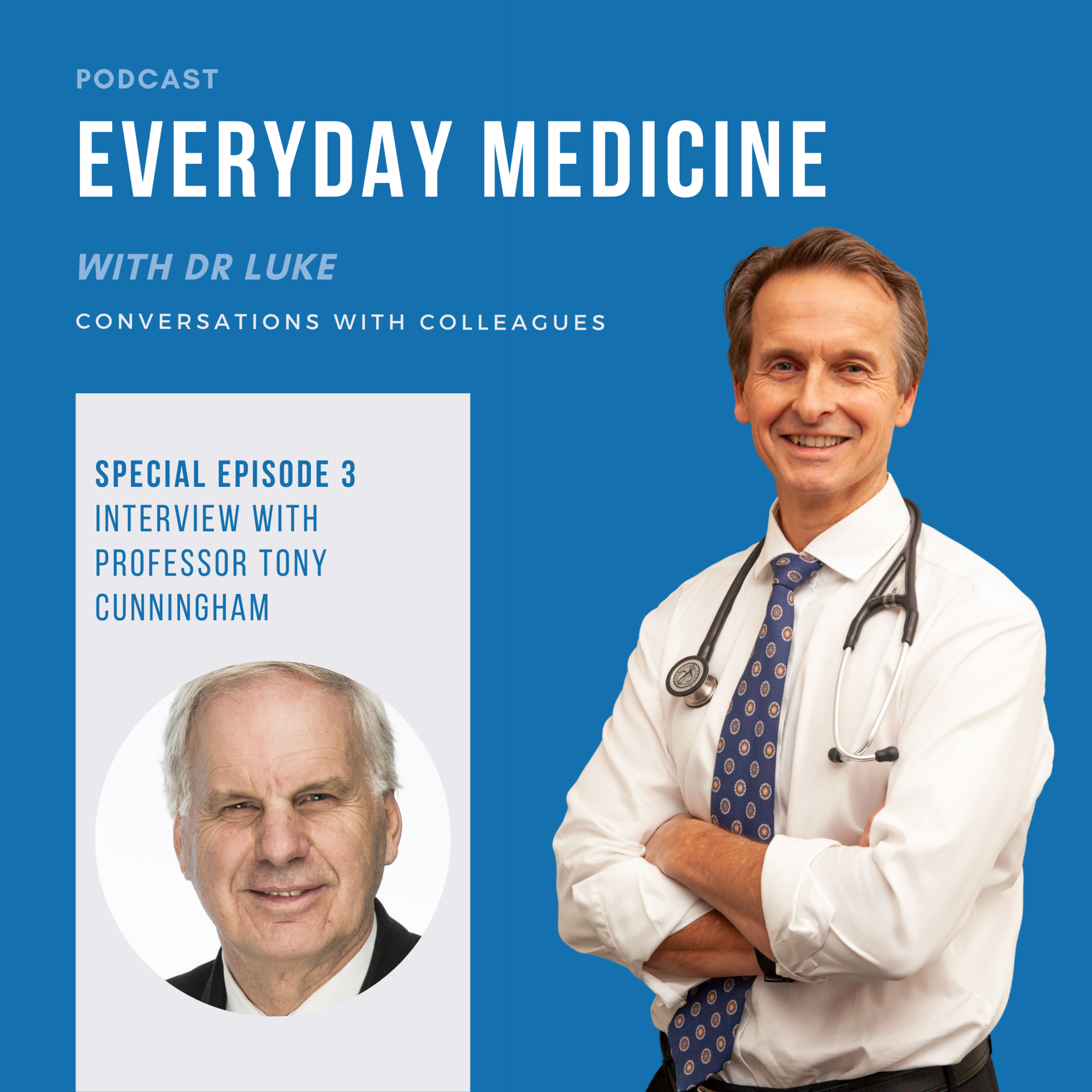
Everyday Medicine with Dr LukeSpecial Episode 3. COVID-19 Vaccines with Professor Tony CunninghamAs the Covid pandemic continues to spread around the world with over 187 million recorded infections and 4 million deaths, countries including Australia have embarked upon vaccination programs including the use of mRNA (Pfizer and Moderna), viral vector (Astra Zeneca), and subunit protein vaccines (Novovax).
In Australia currently, less than 10% of our population have been fully vaccinated leaving our population exposed and subject to repeat widespread population lockdowns and contact tracing via local health departments.
Hesitancy to receive vaccination in part relates to perceived side-effects from vaccines as much as from difficulties relating to supply delivery.
2021-07-2631 min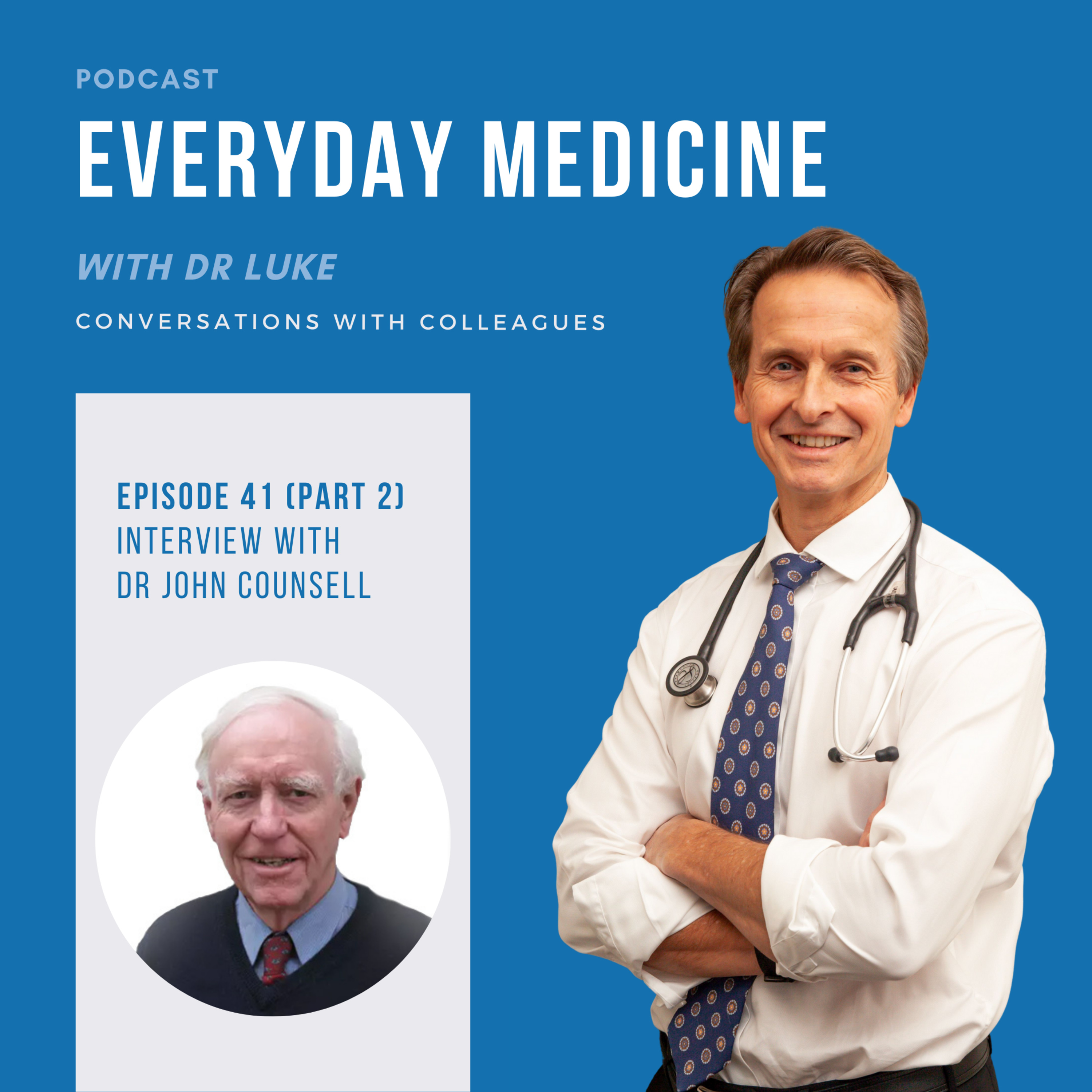
Everyday Medicine with Dr LukeEpisode 41. Secondary Prevention of Cardiovascular Disease with Dr John Counsell [Part 2]Part 2.
Heart disease affects one in six Australians with an AMI occurring every 10 minutes and accounts for one in four of all deaths, so primary and secondary prevention are very important considerations in relation to any patient presenting with heart disease or at risk of heart disease. Risk factors including family history, lipid abnormalities, diabetes mellitus, hypertension, smoking or those with elevated BMI all need consideration. Whilst there have been significant controversies regarding lipids management and the use of statins, the evidence for their use, particularly in secondary prevention of heart disease is clear.
To...
2021-07-1929 min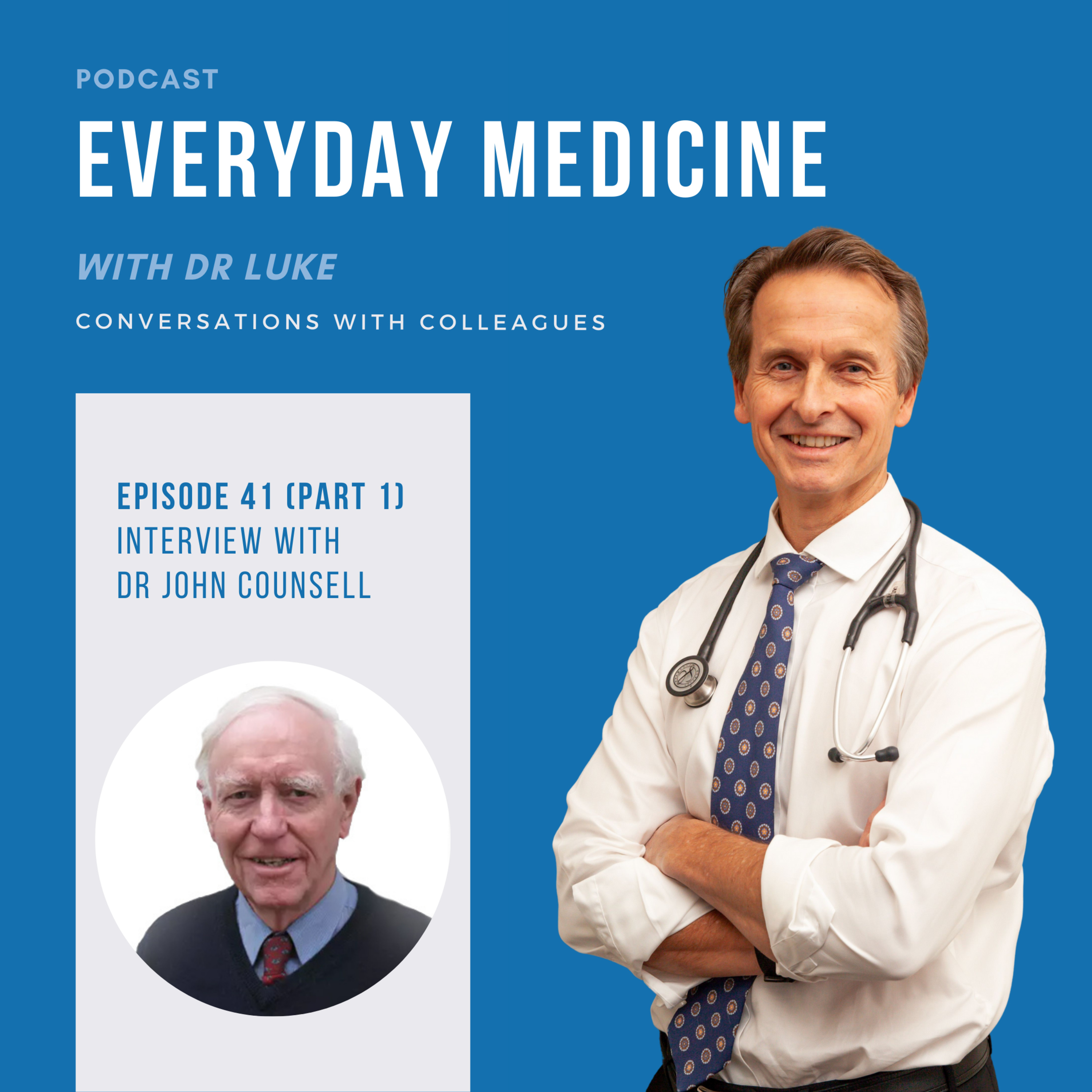
Everyday Medicine with Dr LukeEpisode 41. Primary Prevention of Cardiovascular Disease with Dr John Counsell [Part 1]Heart disease affects one in six Australians with an AMI occurring every 10 minutes and accounts for one in four of all deaths, so primary and secondary prevention are very important considerations in relation to any patient presenting with heart disease or at risk of heart disease. Risk factors including family history, lipid abnormalities, diabetes mellitus, hypertension, smoking or those with elevated BMI all need consideration. Whilst there have been significant controversies regarding lipids management and the use of statins, the evidence for their use, particularly in secondary prevention of heart disease is clear.
To discuss this interesting...
2021-07-1248 min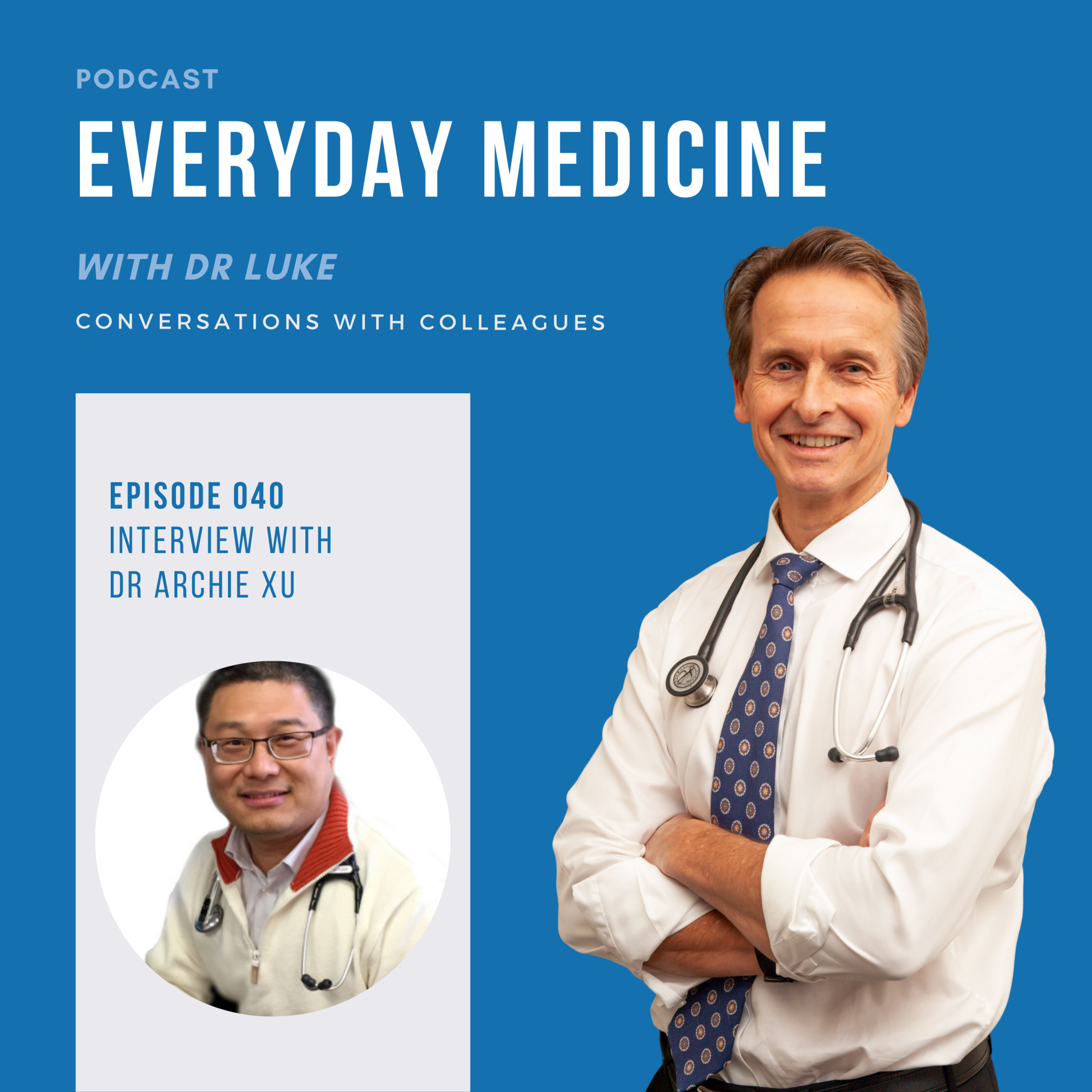
Everyday Medicine with Dr LukeEpisode 40. Mole mapping and skin cancer surveillance with Dr Archie XuNon-melanotic skin cancers and melanoma are the most common cancers affecting humans. At least two in three Australians will be diagnosed with skin cancer before the age of 70 years and the risk is higher for men than women. Whilst basal cell carcinomas and squamous cell carcinomas are more common they are not as lethal as melanomas which are referred to as Australia’s “national cancer”. Indeed in 2020 it is estimated that 16,200 will be diagnosed with melanoma, that is one new case every half hour and a death every five hours.
Skin clinics have emerged embracing mole mapping to ass...
2021-07-0624 min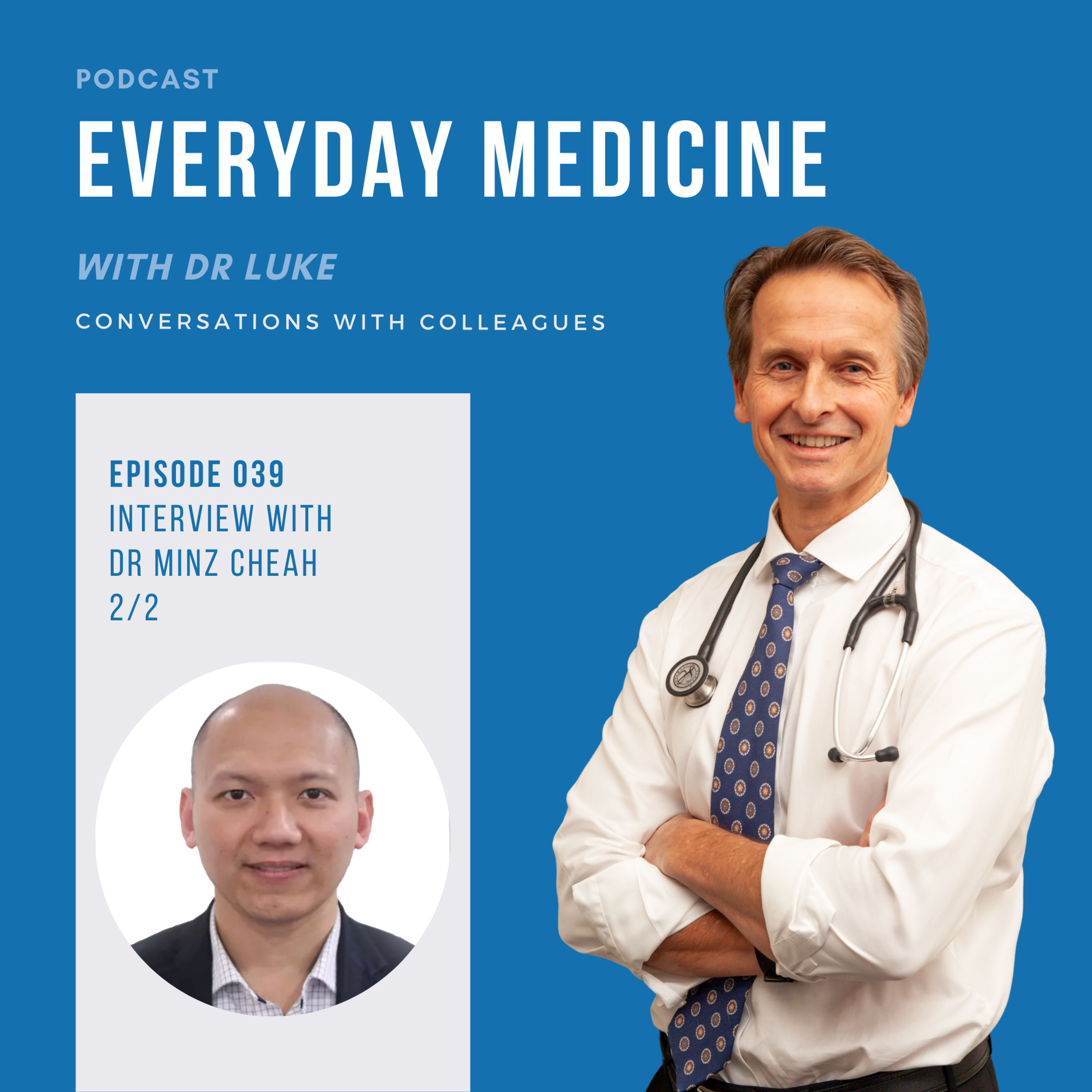
Everyday Medicine with Dr LukeEpisode 39. Muscle Joints Aches and Pains with Dr Minz CheahChronic joint and muscle pain affects many millions of patients with more than one in four adults affected by some form of arthritis. Arthritis is the most common chronic condition among long-term users of opioids with fibromyalgia, polymyalgia, osteoarthritis, reactive arthritis, psoriatic arthritis and other forms of connective tissue disease such as rheumatoid arthritis contributing in a very significant way to morbidity.
We are joined in this episode with experienced general physician Dr Minz Cheah to discuss his experience of joint aches and pains in private practice including:
· A personalised approach to fibromyalgia and arthritis
2021-06-2815 min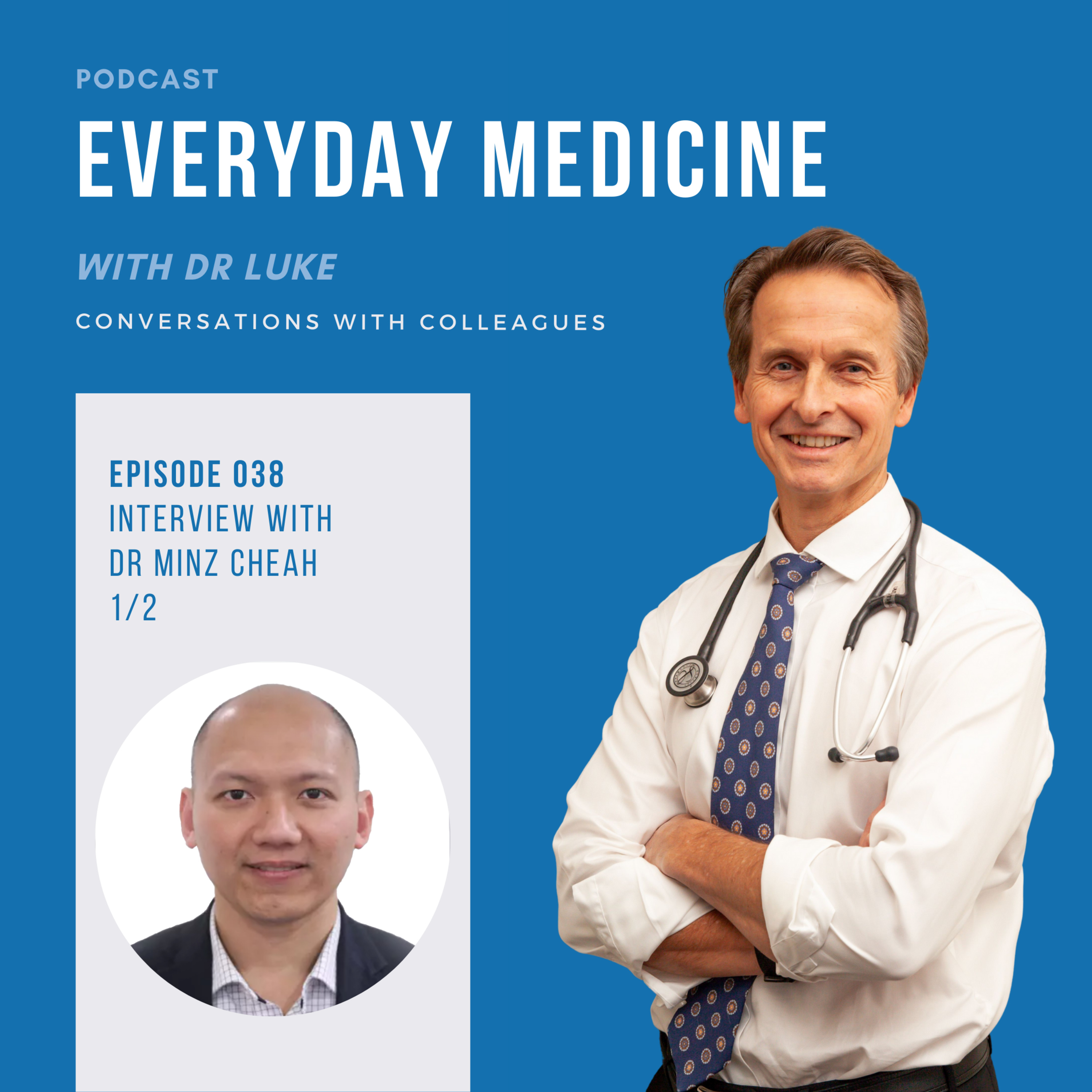
Everyday Medicine with Dr LukeEpisode 38. Hypertension with Dr Minz CheaBased on the Australian Bureau of Statistics National Health Survey data about one in three people over the age of 18 living in Australia have hypertension or were taking blood pressure lowering medications. A staggering number requiring therapy for a condition which impacts on cerebrovascular disease, coronary artery disease, chronic kidney disease, heart failure and mortality.
The National Heart Foundation guidelines are available for careful perusal, but to walk us through an intelligent approach to management of systemic hypertension we are joined by expert general physician Dr Minz Cheah who will discuss:
· Blood pressure targets
2021-06-2130 min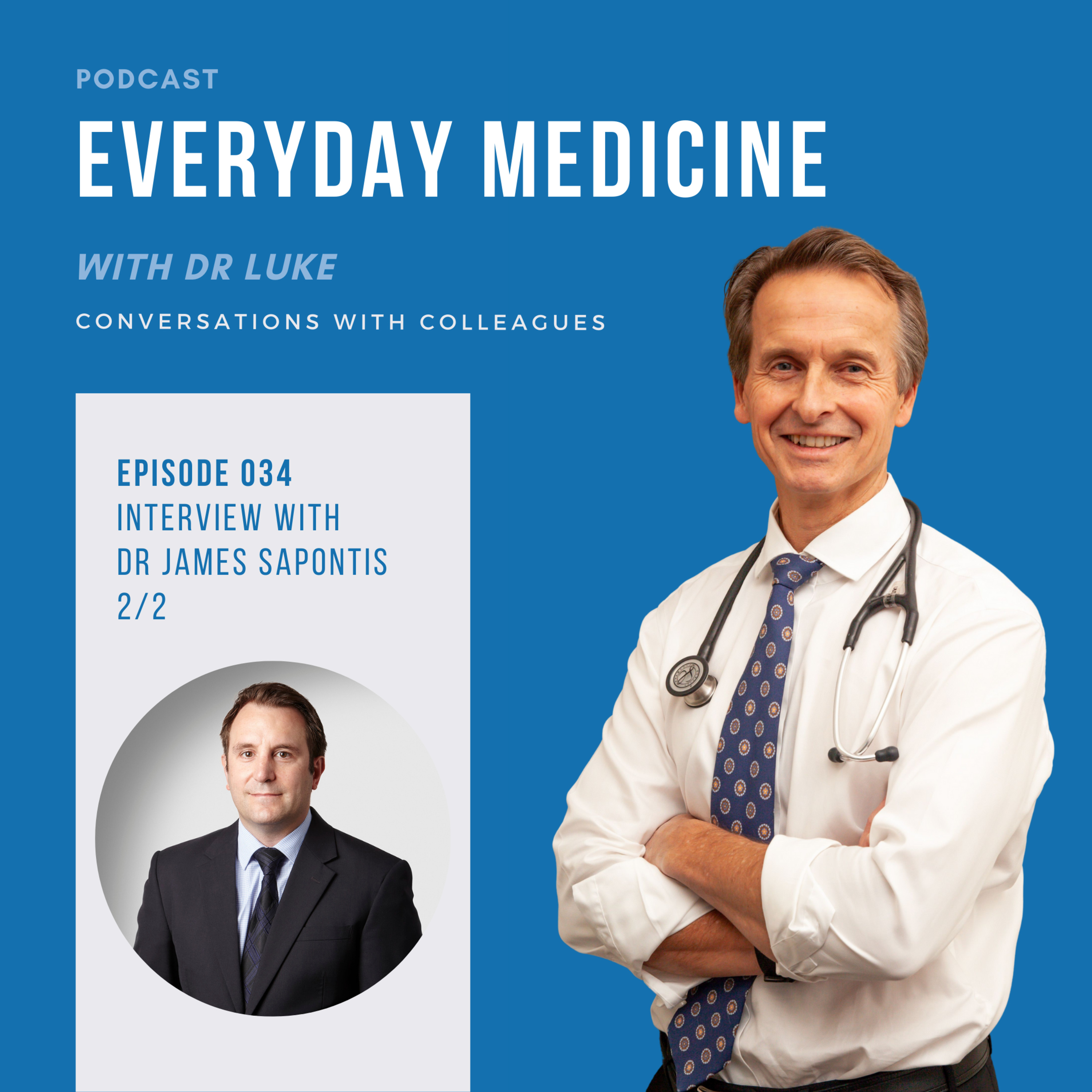
Everyday Medicine with Dr LukeEpisode 34. Atherosclerosis with Dr James SapontisCoronary artery disease caused by atherosclerosis is responsible for one heart attack every ten minutes in Australia. Not all plaques however are equally dangerous or vulnerable, and stable plaques may be asymptomatic and associated with low risk of coronary events contrasted with the unstable or ruptured plaque. To discuss this very interesting subject in more detail we are joined by Dr James Sapontis, experienced cardiologist and head of complex coronary intervention at Monash Heart who will consider:
· Concepts of atherosclerosis
· Pathologies of angina vs acute myocardial infarction
· How to recognise the vulnerable plaque
...
2021-06-1621 min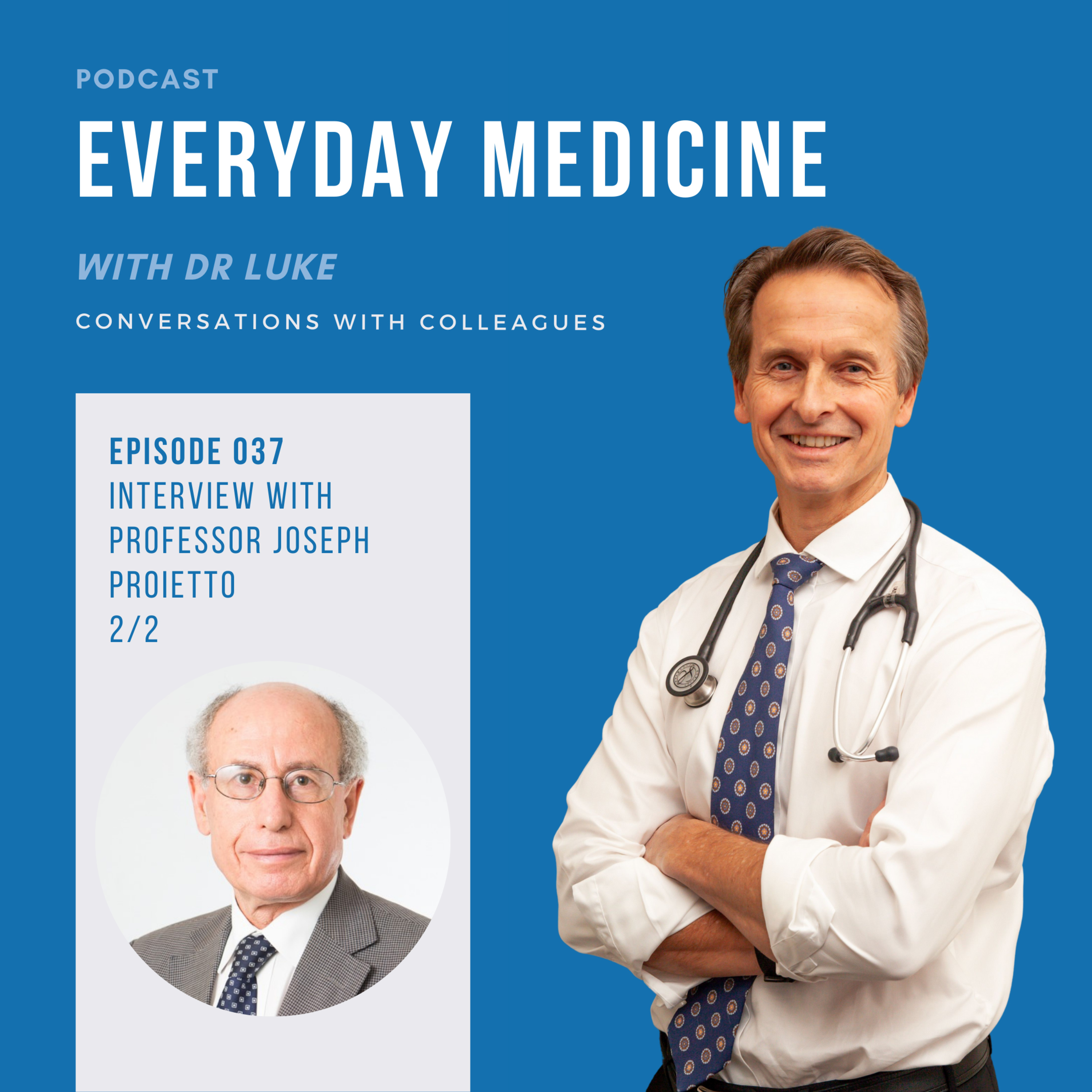
Everyday Medicine with Dr LukeEpisode 37. Why We Get Fat And What We Can Do About It with Professor Joseph ProiettoThe western world faces a very significant obesity epidemic. In Australia, two-thirds of our population or 12.5 million are either overweight or obese and as a consequence may experience many medical sequelae including development of the metabolic syndrome, type 2 diabetes, cardiovascular disease, cerebrovascular disease, osteoarthritis and depression, contributing significantly to our health burden. In the first part of this series, we were joined by Joseph Proietto, Professor Emeritus at the University of Melbourne, the Department of Medicine at Austin Health and an endocrinologist specialising in diabetes and obesity to discuss why we become obese. Professor Proietto joins us again to...
2021-06-1437 min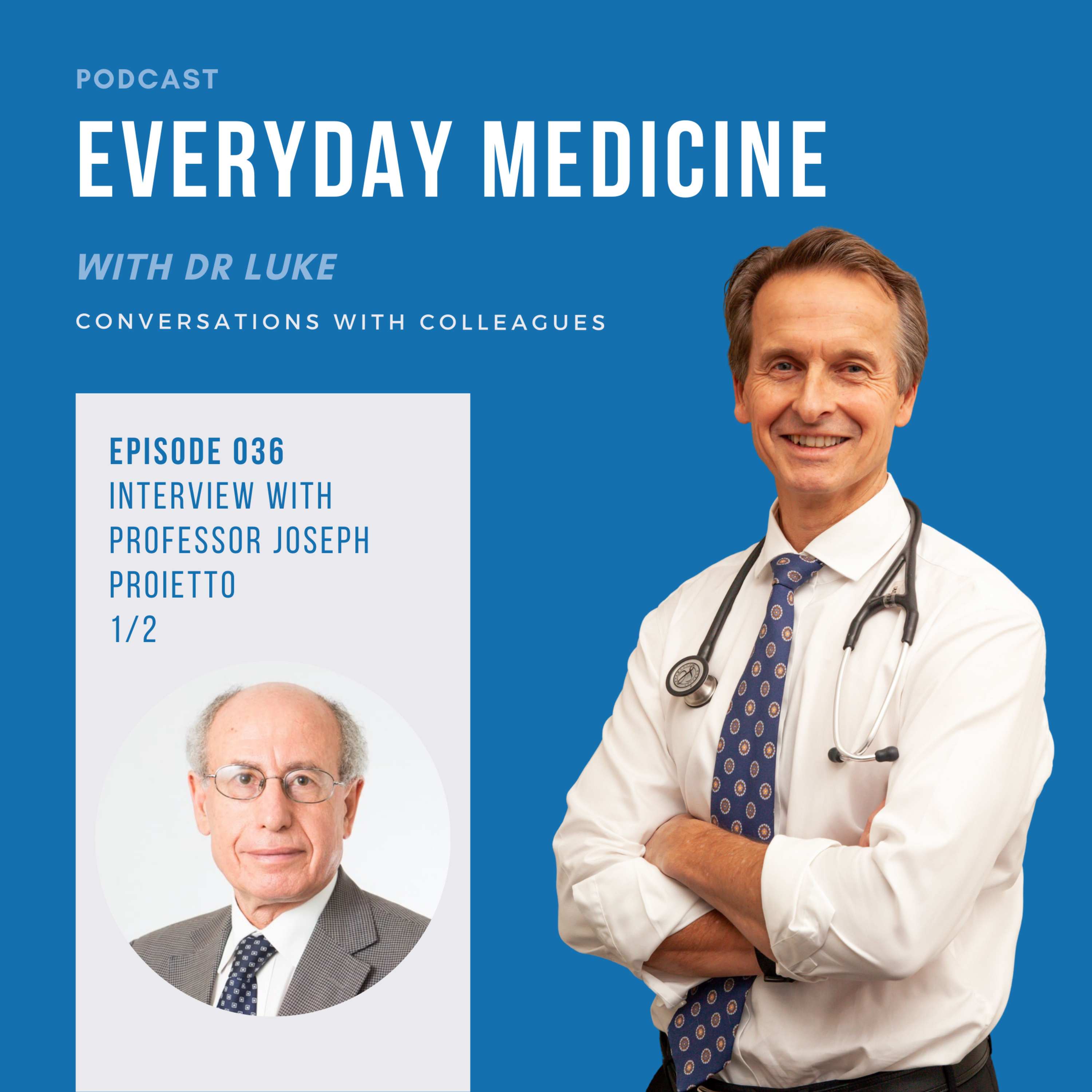
Everyday Medicine with Dr LukeEpisode 36. Why We Get Fat with Professor Joseph ProiettoUp to two thirds of Australians are either overweight or obese as defined by body mass index (overweight: BMI 25-29.9, obese: BMI >30) with subsequent significant medical consequences including cardiovascular disease, type 2 diabetes, cerebrovascular disease (metabolic syndrome), osteoarthritis and depression. Becoming overweight and obese involves complex interactions between neurohormonal systems of the gut, neurobiology of the brain (particularly the hypothalamus) and leptin production from adipose sites coupled with an environment where there is an abundance of high glycaemic energy dense foods. Science demonstrates that the overarching controls of obesity are genetic (70%) rather than environmental (30%). Adoption studies relating to monozygotic twins d...
2021-06-0730 min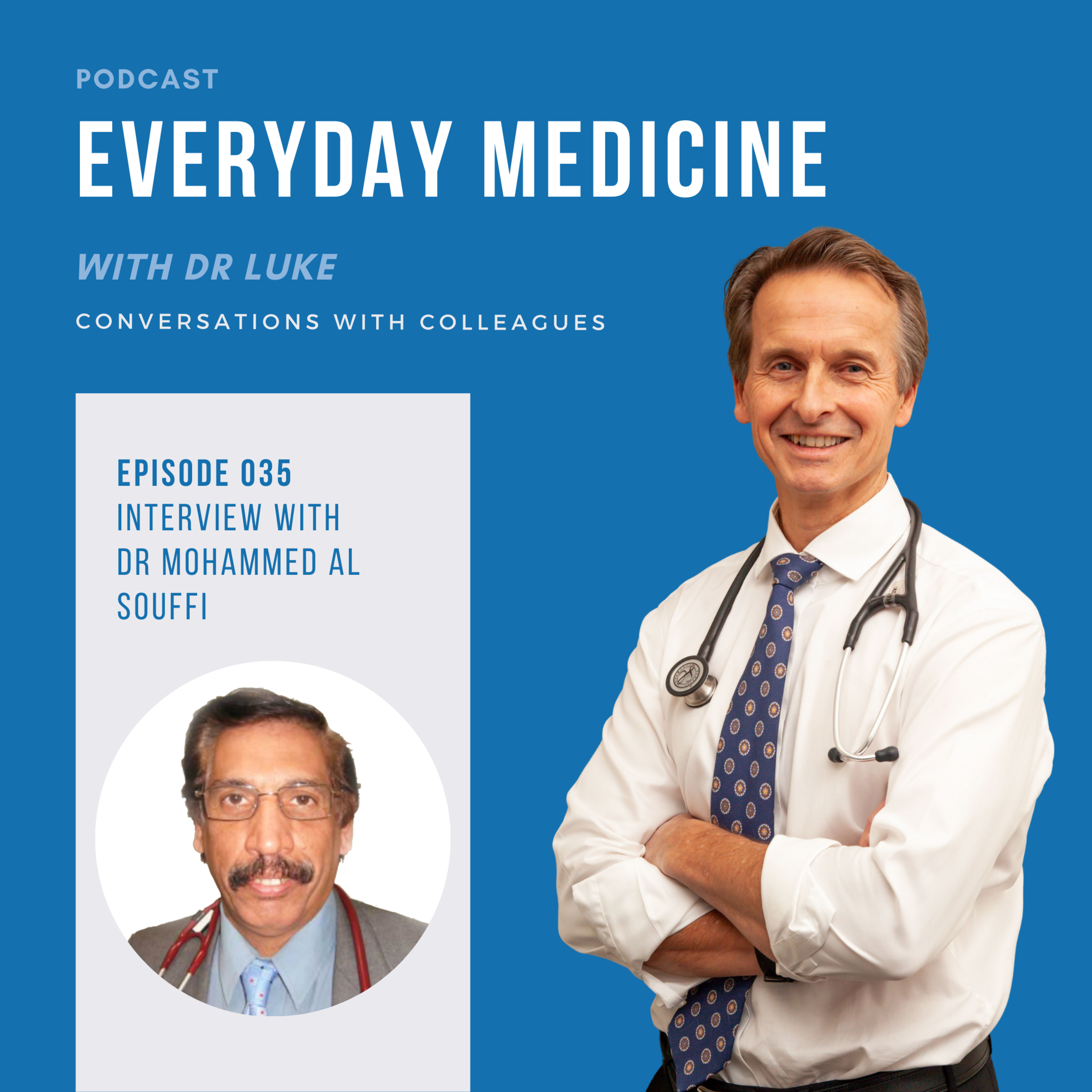
Everyday Medicine with Dr LukeEpisode 35. The spleen and postsplenectomy syndrome with Dr Mohammed Al SouffiThe spleen performs a large number of important functions including processing and removal of opsonized pathogens, cellular maintenance, immunoglobulin production and the removal of effete worn out red blood cell. When removed either through trauma or for therapeutic indications the risk of overwhelming post splenectomy infection (OPSI) increases significantly; up to 58 times the general population in the setting of trauma and up to 1,100 times increased risk when for thalassaemia.
The risk of OPSI is particularly high in the first 2-5 years for capsulated bacteria such as Strep pneumonia, Haemophilus influenzae and Neisseria meningitidis. To discuss the functions o...
2021-05-3128 min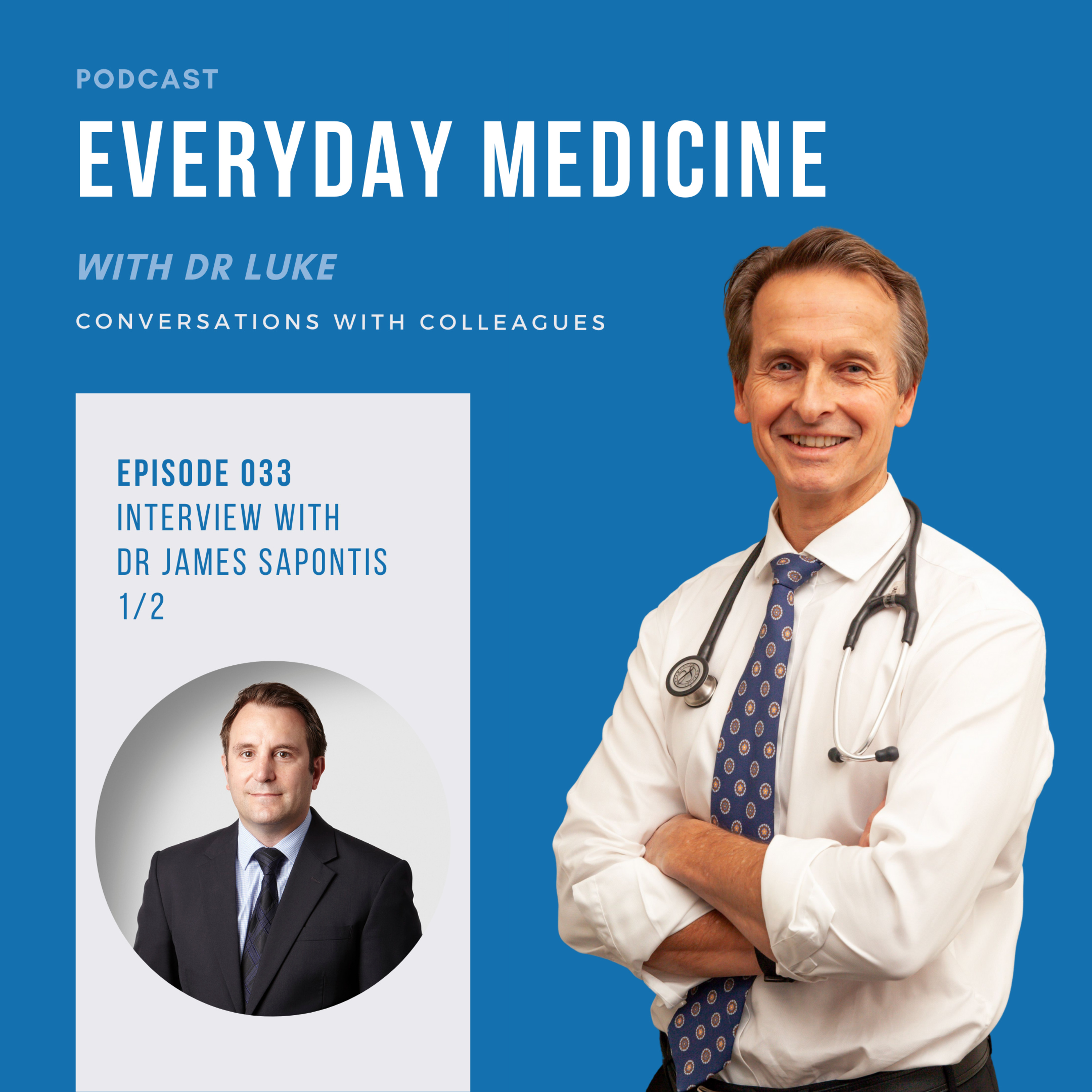
Everyday Medicine with Dr LukeEpisode 33. New Advances in Cardiology with Dr James SapontisThere have been many new advances in the field of cardiology.
Since I was a trainee the incredible developments we now take for granted in this field have been exponential. Given the high incidence of heart disease in our community one in six Australians have heart disease) revascularisation and techniques to prevent thromboembolic events as well as methods to repair heart valves with a minimally invasive approach have all proven extremely valuable advances.
We are joined today by Dr James Sapontis, head of complex coronary intervention at Monash Heart and formerly trained through Mahi Missouri a...
2021-05-1730 min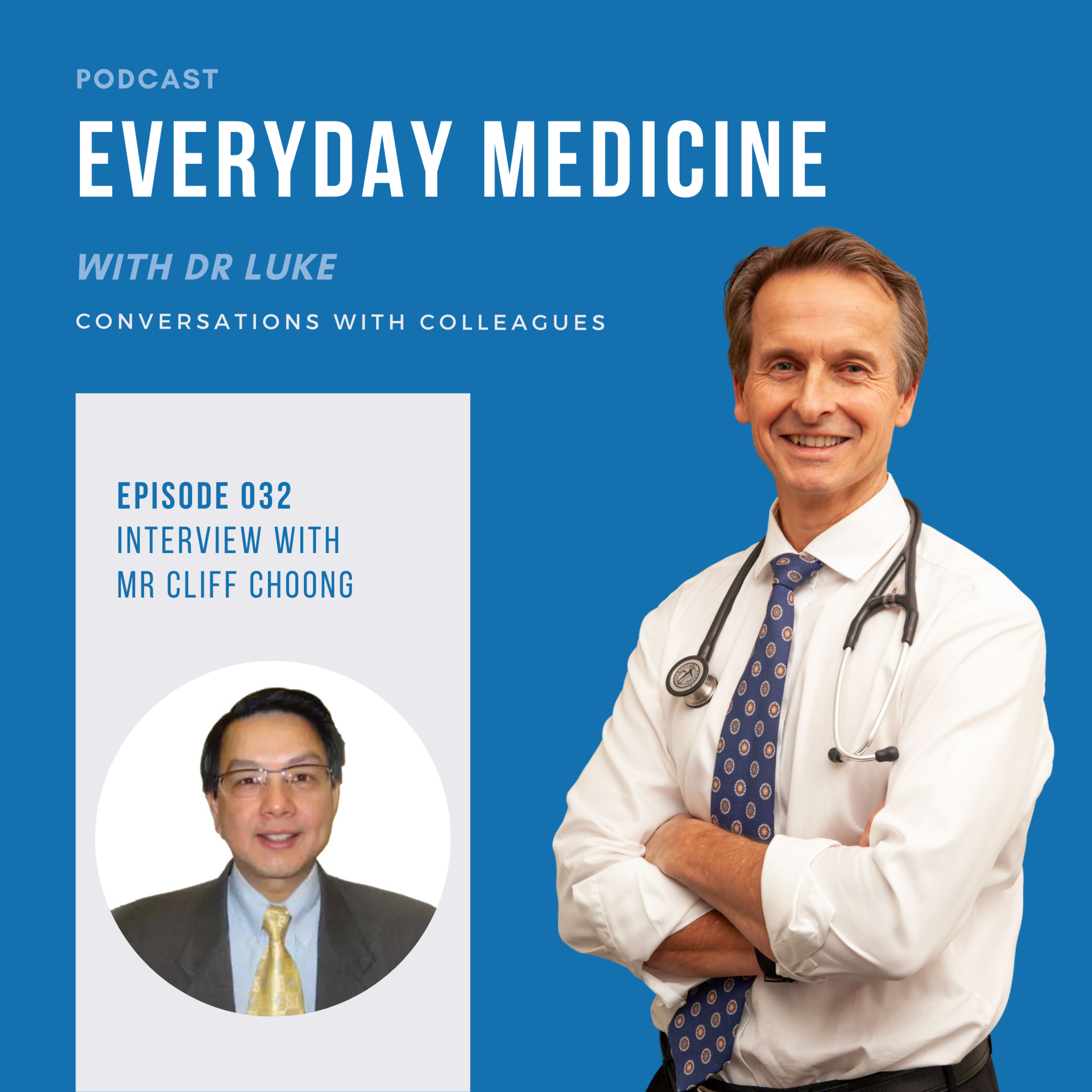
Everyday Medicine with Dr LukeEpisode 32. Lung Cancer with Mr Cliff ChoongLung cancer is a major problem facing Australian doctors representing 9% of all cancer diagnoses and with 12,200 new cases of lung cancer diagnosed each year it is the fifth most commonly diagnosed cancer, but the most common cause of cancer death in this country for both men and for women. The early presentation of lung cancer may be as subtle as a small coin lesion or nodule seen on chest imaging and there are a multitude of ways in which such nodules may be interrogated further. Whilst a wait and watch approach may be appropriate, further evaluation by VATS with a...
2021-05-1030 min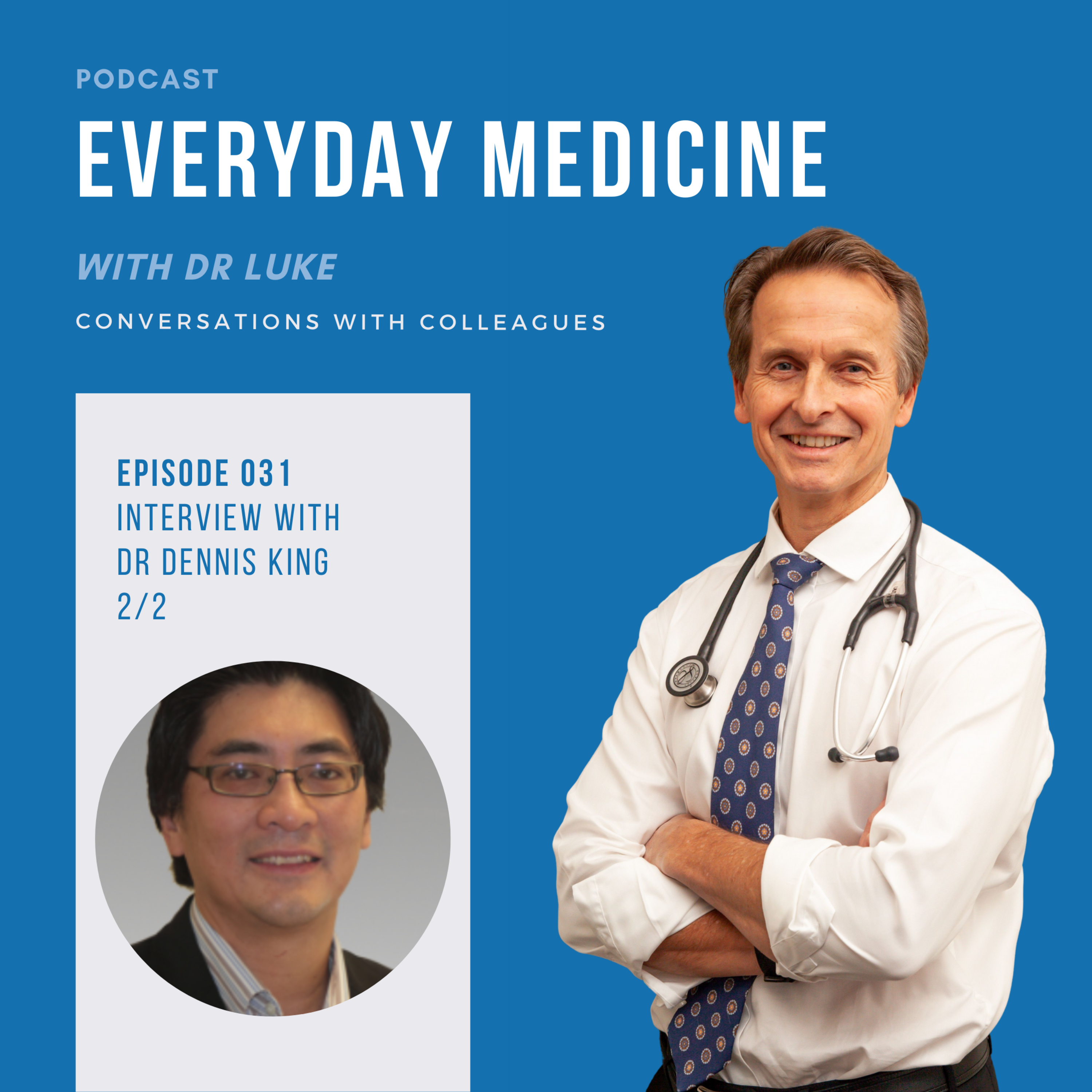
Everyday Medicine with Dr LukeEpisode 31. Benign Prostatic Hyperplasia with Dr Dennis KingBenign prostatic hyperplasia (BPH) is a common condition as men age and the most common benign tumour in men. Approximately half of all men between the age of 51 and 60 years have BPH and upto 90% of men over the age of 80 years have it. Prostate enlargement can be responsible for a variety of urinary symptoms including hesitancy with poor urinary flow, frequency, nocturia and incontinence. Where surgery was once a likely outcome for this condition many medical therapies have evolved to provide suitable alternatives including Alpha 1 adrenoceptor blockers resulting in smooth muscle relaxation in the prostate and bladder neck, 5-alpha...
2021-05-0311 min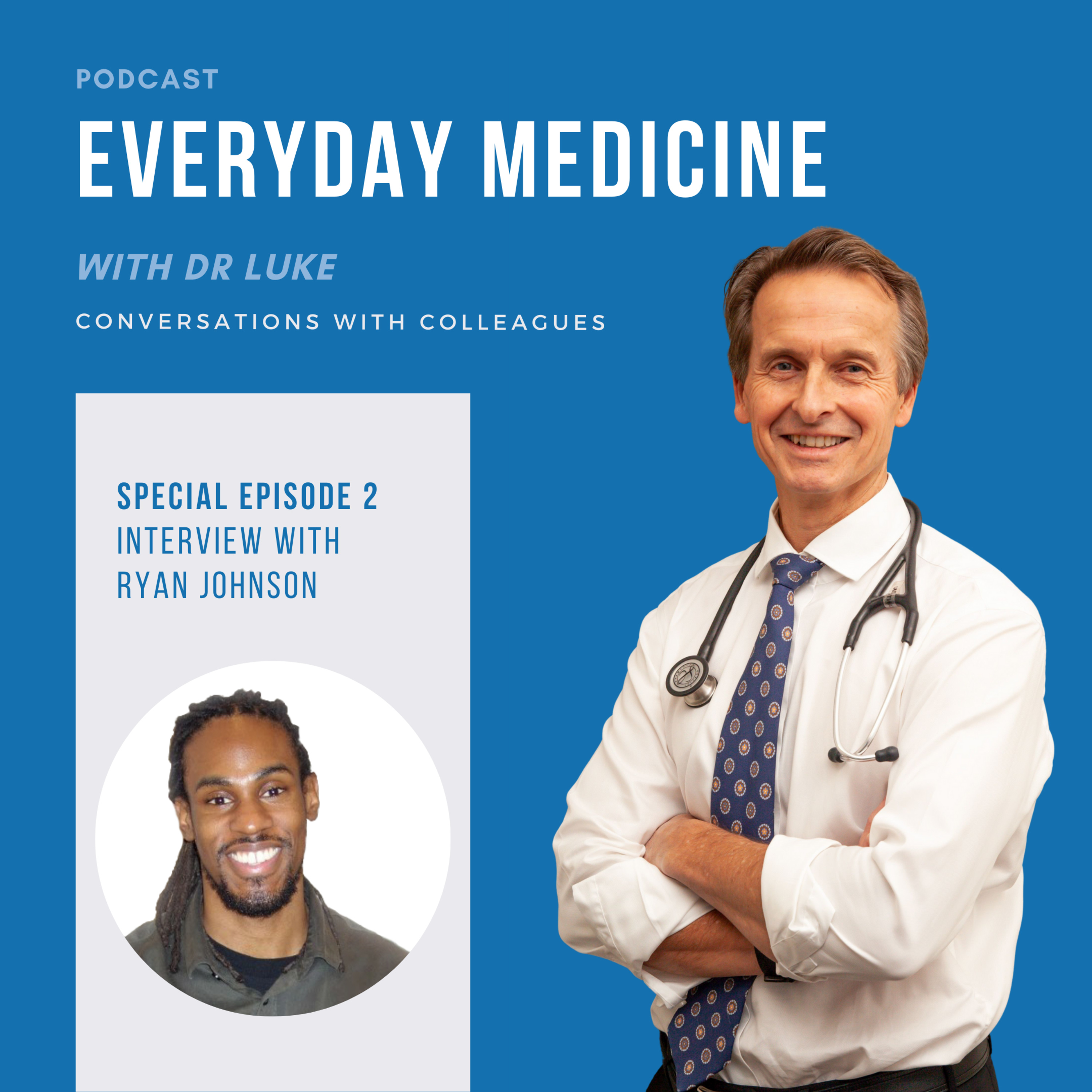
Everyday Medicine with Dr LukeSpecial Episode 2. The Way to Walk with Ryan JohnsonIn this podcast episode, we have a conversation with physiotherapist Ryan Johnson of R3 Physiotherapy in London who is passionate about gait correction and has written a book called The Way to Walk.
I looked forward to this conversation as Ryan’s strategies address some very major public health problems in our community with 20-37% of 45-year-olds and older estimated to be experiencing foot pain alone, additionally, many hip, knee, back and neck complaints may be traced back to gait disorder at their foundation.
In applying these techniques within his busy physiotherapy practice in London, Ryan...
2021-04-2729 min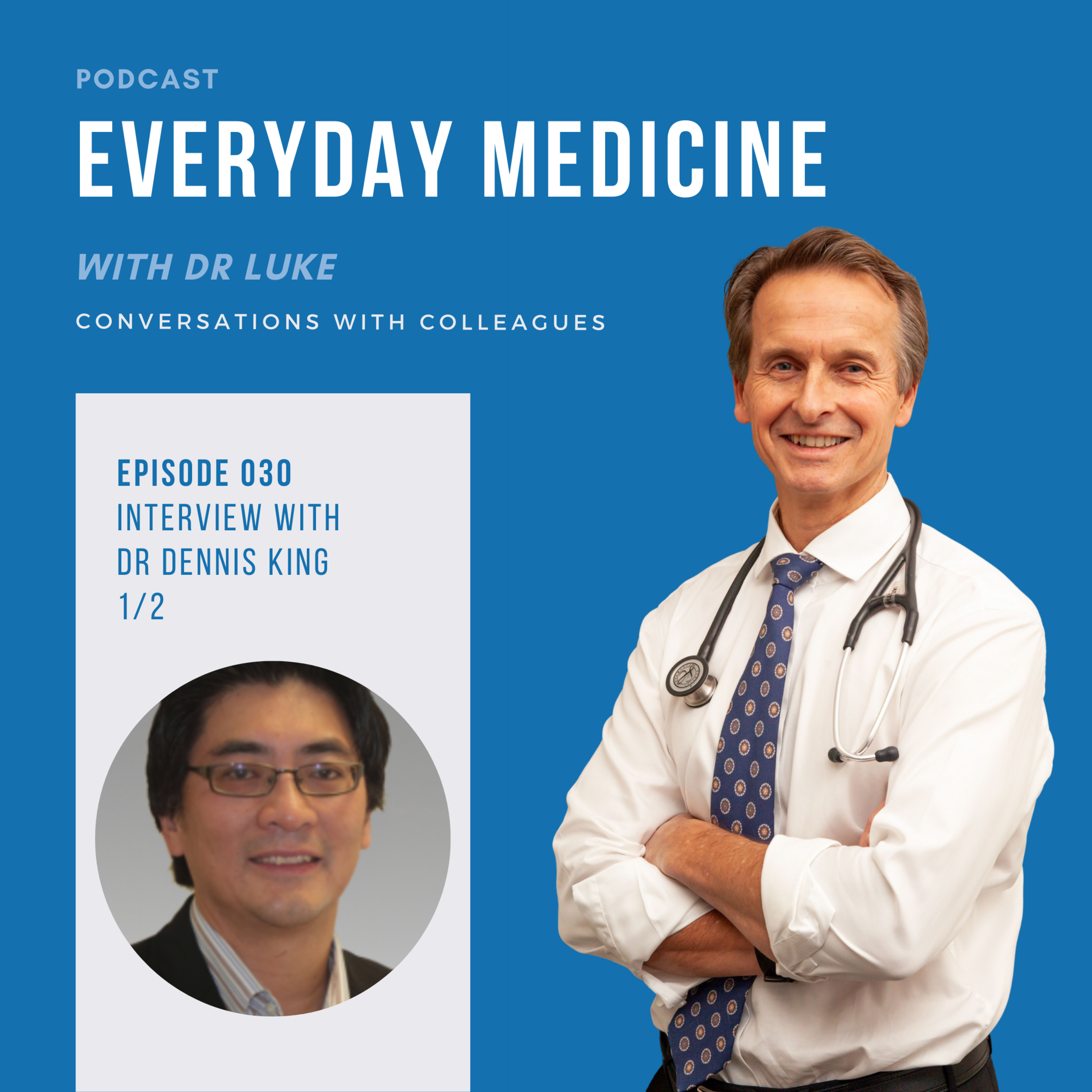
Everyday Medicine with Dr LukeEpisode 30. Controversies in Prostate Cancer with Dr Dennis KingProstate cancer is the second most commonly diagnosed cancer among men and the second most common cause of death from cancer in men, yet many prostate cancers are not fatal and some autopsy series have demonstrated up to 50% or more silent prostate cancers in men over the age of 70 years. At 50 years of age some studies suggest a 40% chance of harbouring a latent cancer, 16% chance of developing an apparent and invasive cancer and 2.9% risk of death from prostate cancer. These facts raise several controversies regarding management and the approach to surgical treatment is also subject to debate.
...
2021-04-2028 min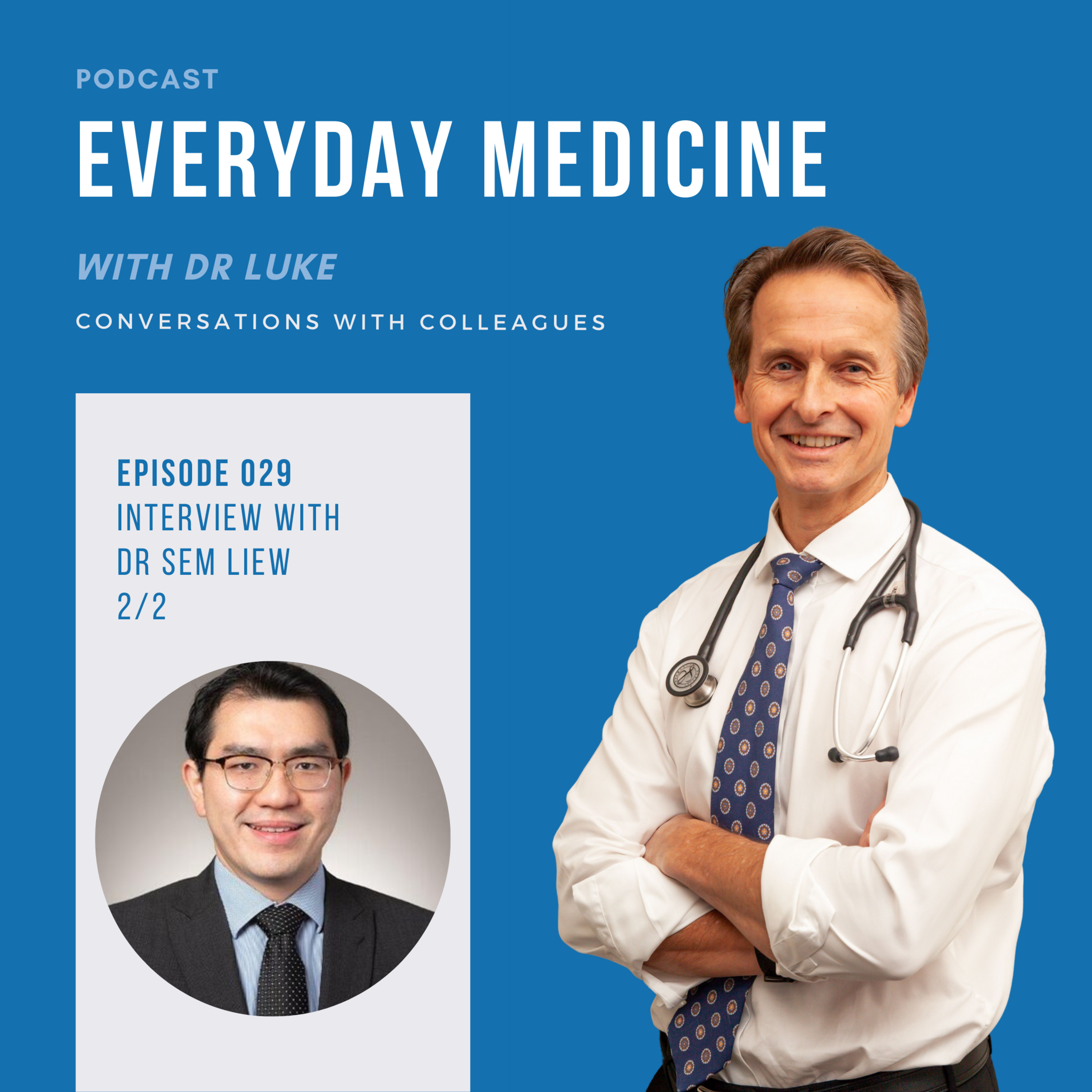
Everyday Medicine with Dr LukeEpisode 29. Personalised Medicine with Dr Sem LiewPersonalised medicine also known as precision medicine uses the knowledge of genetics to help predict disease development and to influence decisions about lifestyle choices and to tailor treatment to a particular individual’s tumour. The hope is that personalised medicine will allow more appropriate choices of targeted therapy and minimise side effects rather than choosing a “one size fits all” approach to prescription medication. Pharmacogenetics may now be used in some circumstances to minimise the likelihood for adverse reactions to a medicine and improve outcomes. To discuss this interesting subject as it applies to oncology, we are joined by Dr Sem...
2021-04-1408 min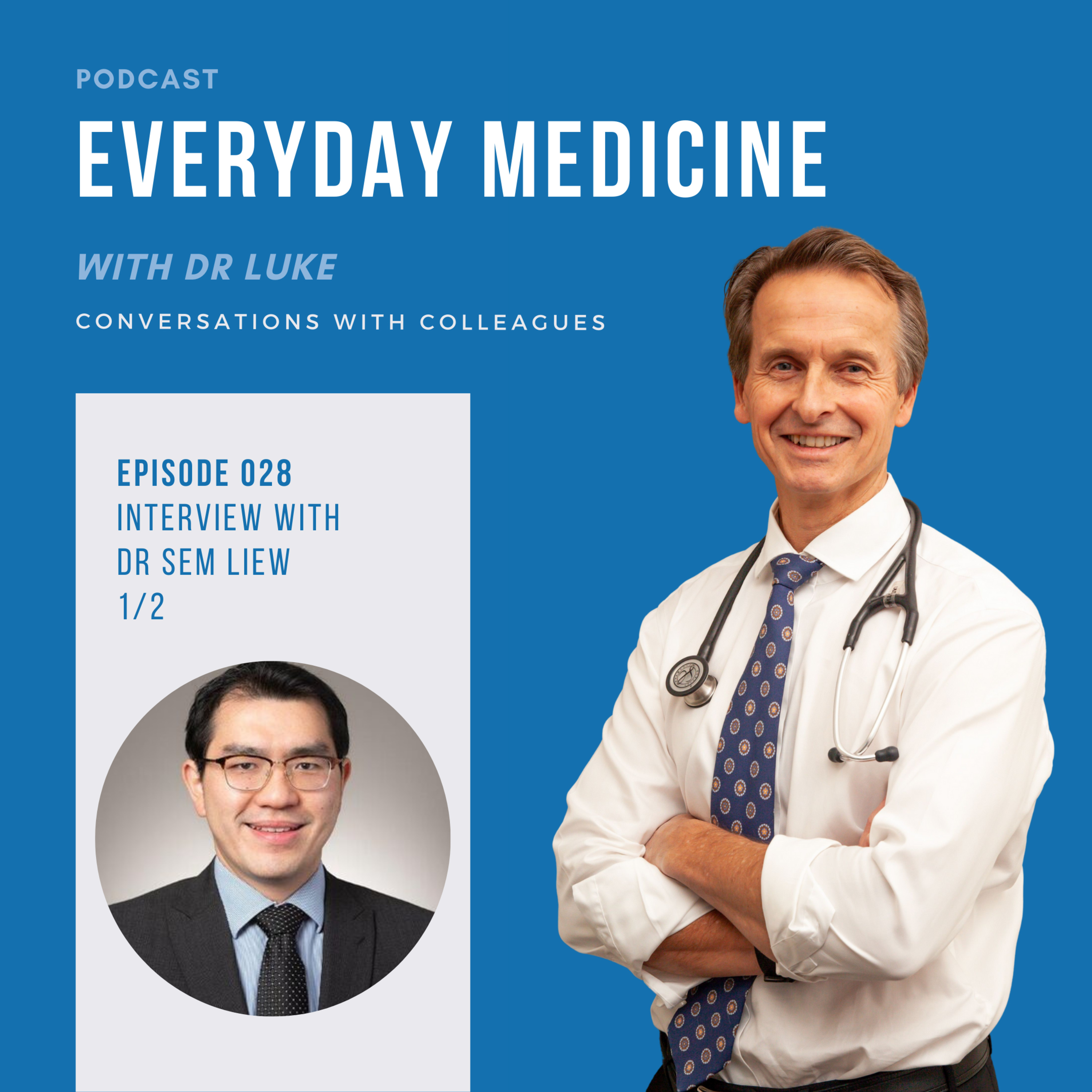
Everyday Medicine with Dr LukeEpisode 28. Immunotherapy with Dr Sem LiewCancer is responsible for over 40,000 deaths annually in Australia and has traditionally been managed by modalities including surgery, radiotherapy and chemotherapy. In 1992, Tasuku Honjo’s discovery of checkpoint proteins on tumour cells led to the birth of immunotherapy which has revolutionised the treatment of many cancers including bladder and kidney cancer, head and neck cancer, melanoma, non-small cell lung cancer and Hodgkin’s lymphoma. To broaden our appreciation of checkpoint inhibition chemotherapy in practice we are joined by expert oncologist Dr Sem Liew who discusses:
· Immunotherapy broadly
· Application
· Possible future developments
Please...
2021-04-0619 min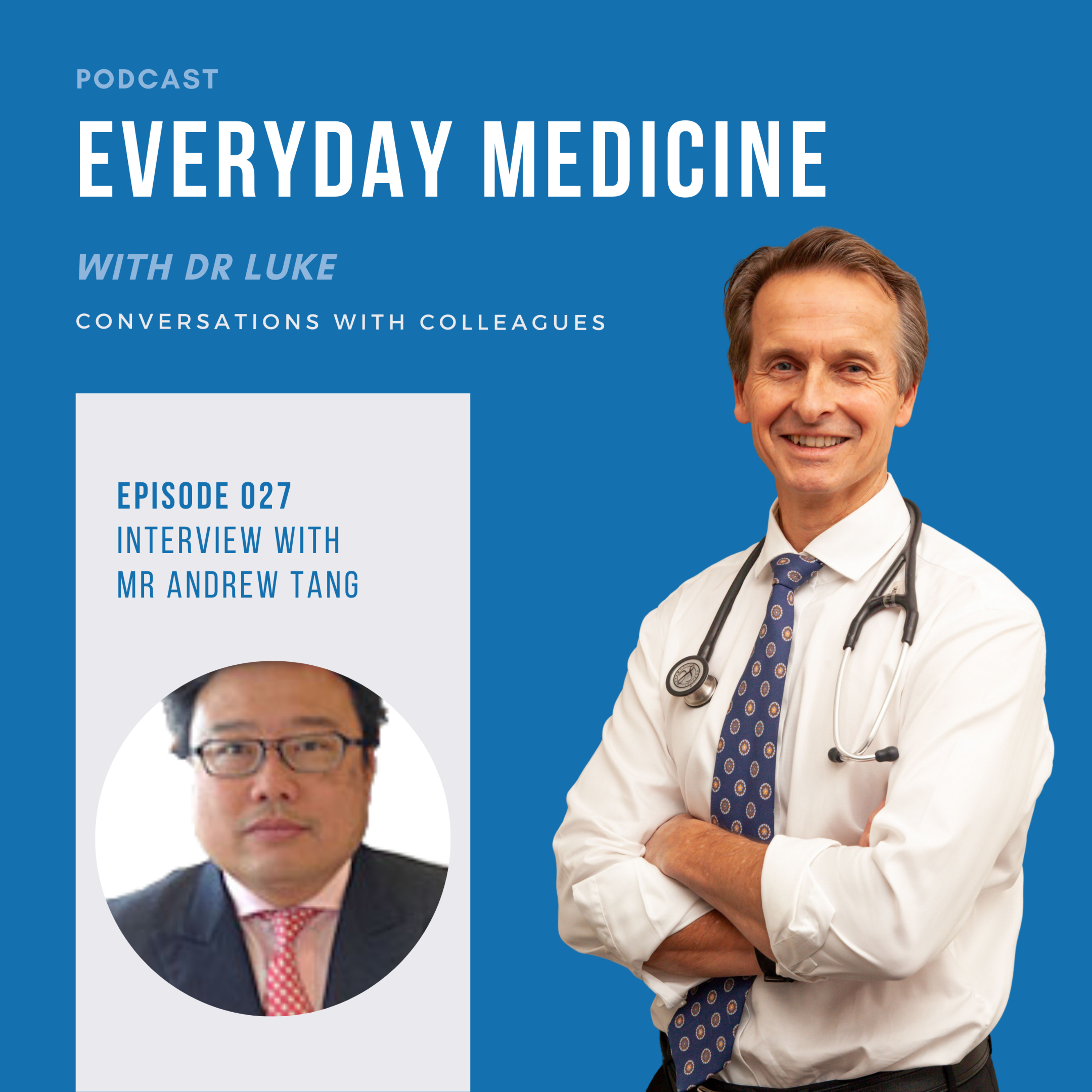
Everyday Medicine with Dr LukeEpisode 27. Robotic Knee Surgery with Mr Andrew TangIn this podcast episode we have a conversation with Mr Andrew Tang, Director of the Epworth Musculoskeletal Clinical Institute and an experienced orthopaedic surgeon operating at Epworth Richmond and St John of God Berwick since the early 1990’s. He has a particular interest in robotic knee surgery which allows improved accuracy with implant positioning and as the convenor of the Internal Orthopaedic Audit at Epworth Health he is in an excellent situation to review approaches to hip surgery, including the increasingly popular anterior approach. The ratio of knee to hip surgery currently being conducted in Australia is nearly 2:1 and it...
2021-03-3125 min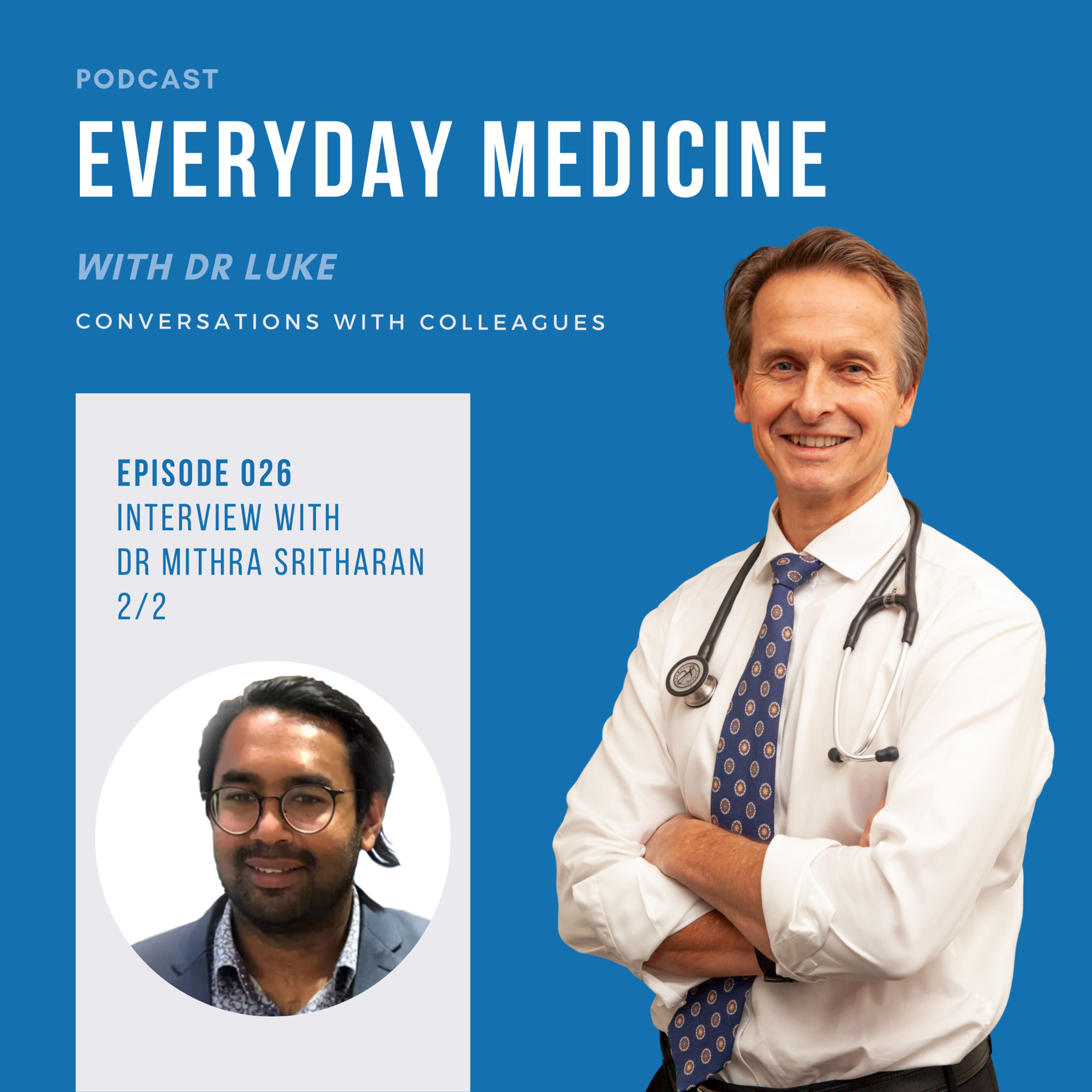
Everyday Medicine with Dr LukeEpisode 26. Pancreatic Cysts with Dr Mithra SritharanAs clinicians we are often faced with the dilemma of working up cystic structures in the pancreas. These may have been discovered incidentally but may also be clinically relevant and contributing to symptoms. In this podcast episode we are joined by Mithra Sritharan a hepatopancreaticobiliary and general surgeon with a particular interest in liver and pancreatic disease, but whose management skills and high level of competence is evident from this interview. Today Mithra shares his knowledge in discussing:
· Pseudocysts
· Pancreatic cystic neoplasms including serous cystadenomas
· Mucinous cystic neoplasms
· Intraductal papillary mucinous neop...
2021-03-2218 min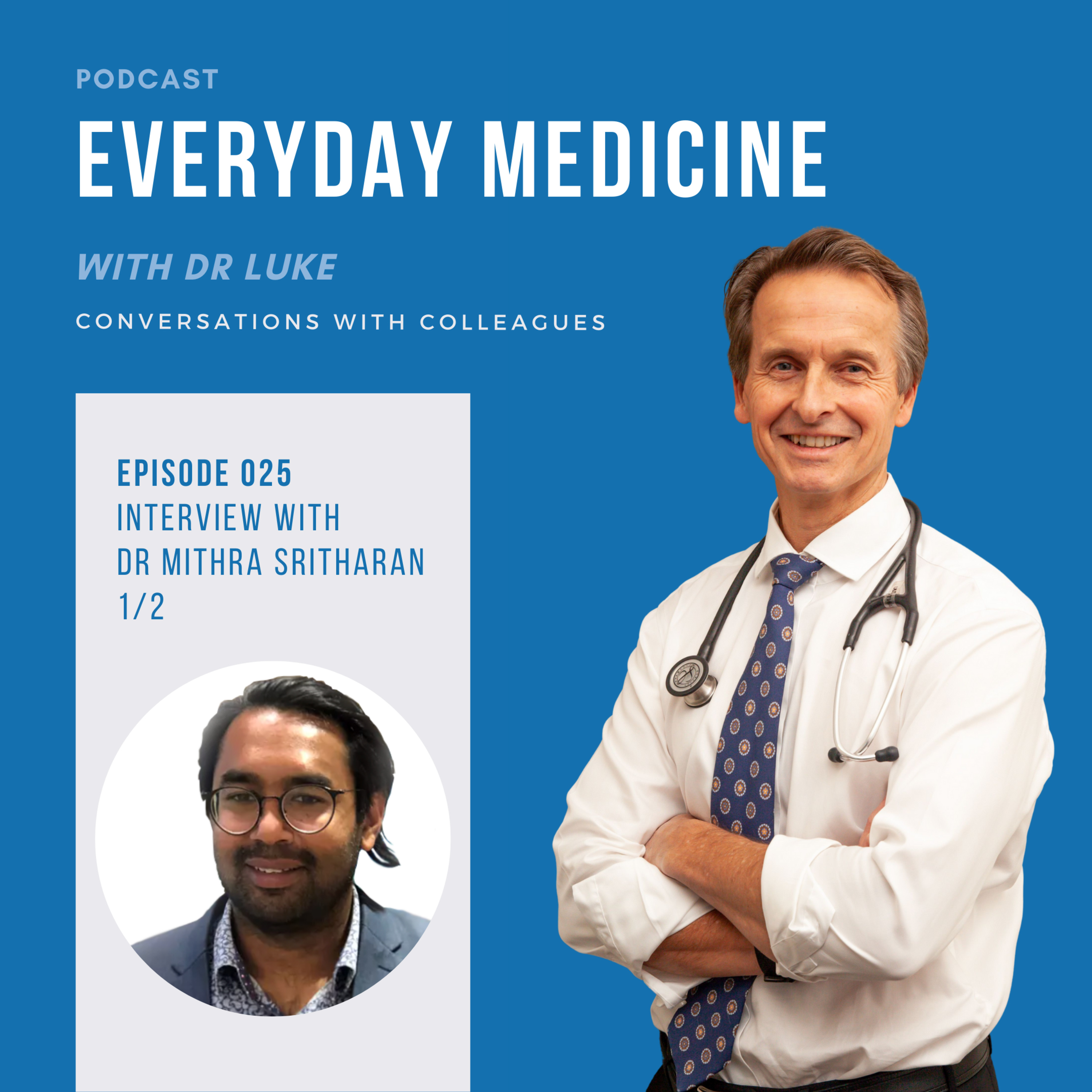
Everyday Medicine with Dr LukeEpisode 25. SOL's Liver with Dr Mithra SritharanOur approach to space-occupying lesions (SOL’s) in the liver is dependent on a firm knowledge of the potential pathology, the choice of imaging modality and the understanding of any background clinical liver disease in the index patient. We are joined today by expert hepatopancreaticobiliary and general surgeon Mr Mithra Sritharan, who carefully guides us through a logical approach to liver SOL’s including:
· Cysts
· Haemangiomas
· Focal nodular hyperplasia
· Adenomas
· Malignancies
This is an excellent and clear discussion by Mithra and I am very pleased to invite you to th...
2021-03-1517 min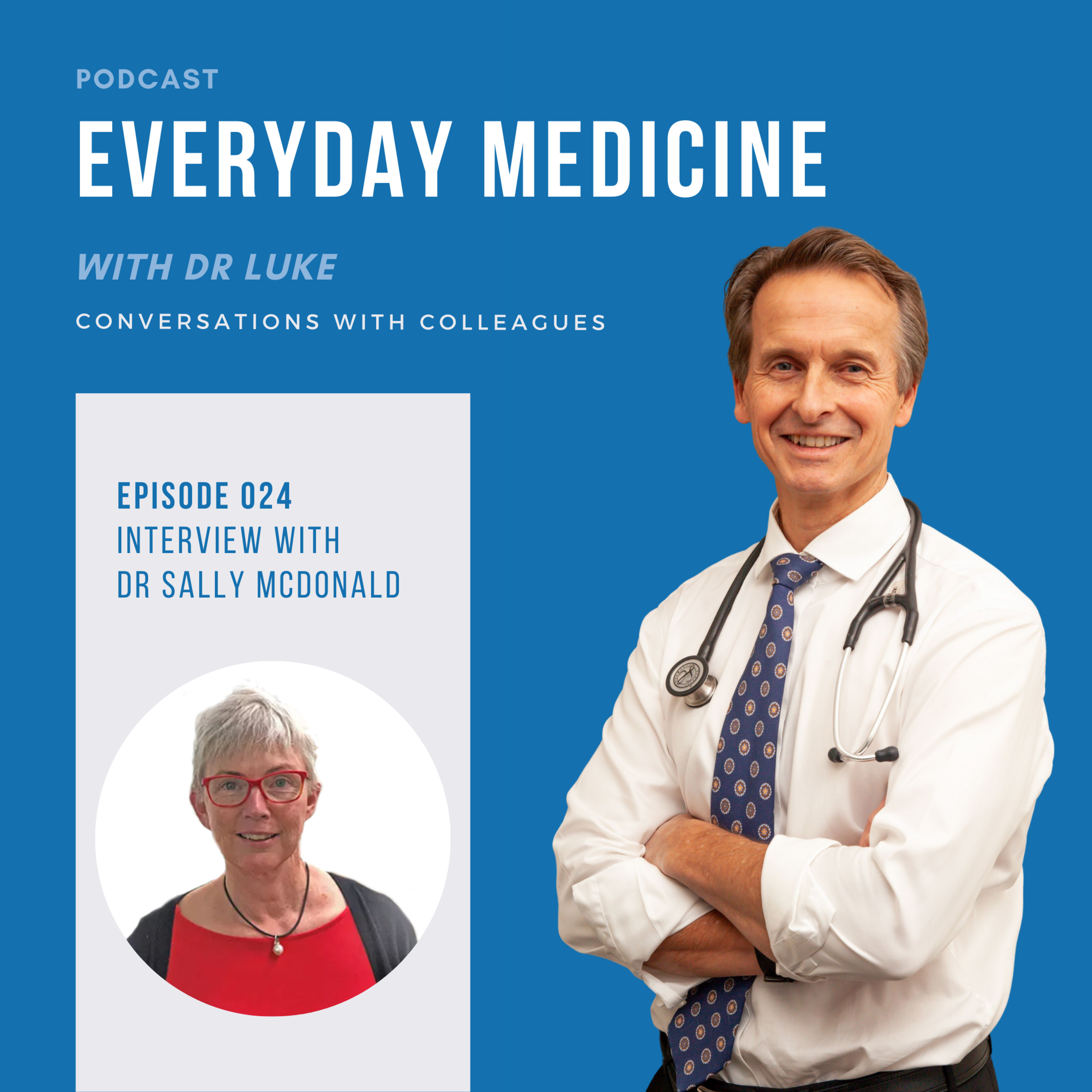
Everyday Medicine with Dr LukeEpisode 24. Palliative Care with Dr Sally McDonaldIn this episode, we talk with experienced general practitioner Dr Sally McDonald who has committed a large part of her time, energy and emotion providing palliative care for her local community. Palliative care is care focused on improving the quality of life for people and families with serious illnesses, directed at treating the symptoms of the patient, support for patient’s families and loved ones and aligning care with patient’s preferences, values and goals. Professor Ian Maddocks, a palliative care specialist, said “sometimes I think it’s better to step back and say you don’t need all that proce...
2021-03-0819 min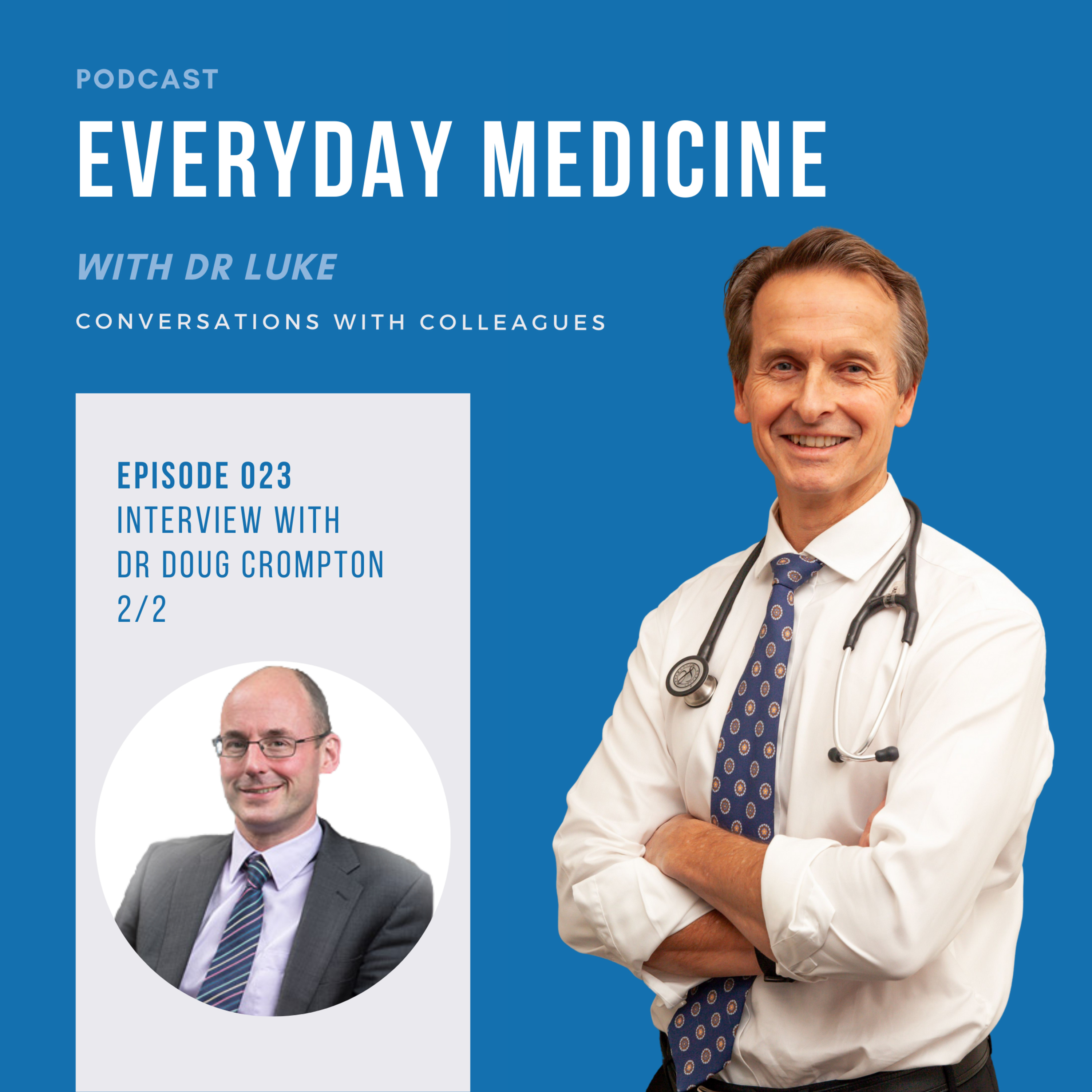
Everyday Medicine with Dr LukeEpisode 23. Epilepsy with Dr Doug CromptonSeizures may be defined as a transient disturbance of cerebral function due to abnormal paroxysmal neuronal discharge in the brain with epilepsy defined by any disorder characterised by recurrent (more than two) unprovoked seizures. It is estimated that 1-2% of the Australian population experience epileptic seizures in adult life and up to 4% of children experience epileptic seizures. With over 40 different types of epilepsy and epileptic syndromes the risks of death from this very important clinical problem is two to three times the average. It is estimated that 60-70% of patients with good epileptic care will be seizure free with...
2021-03-0147 min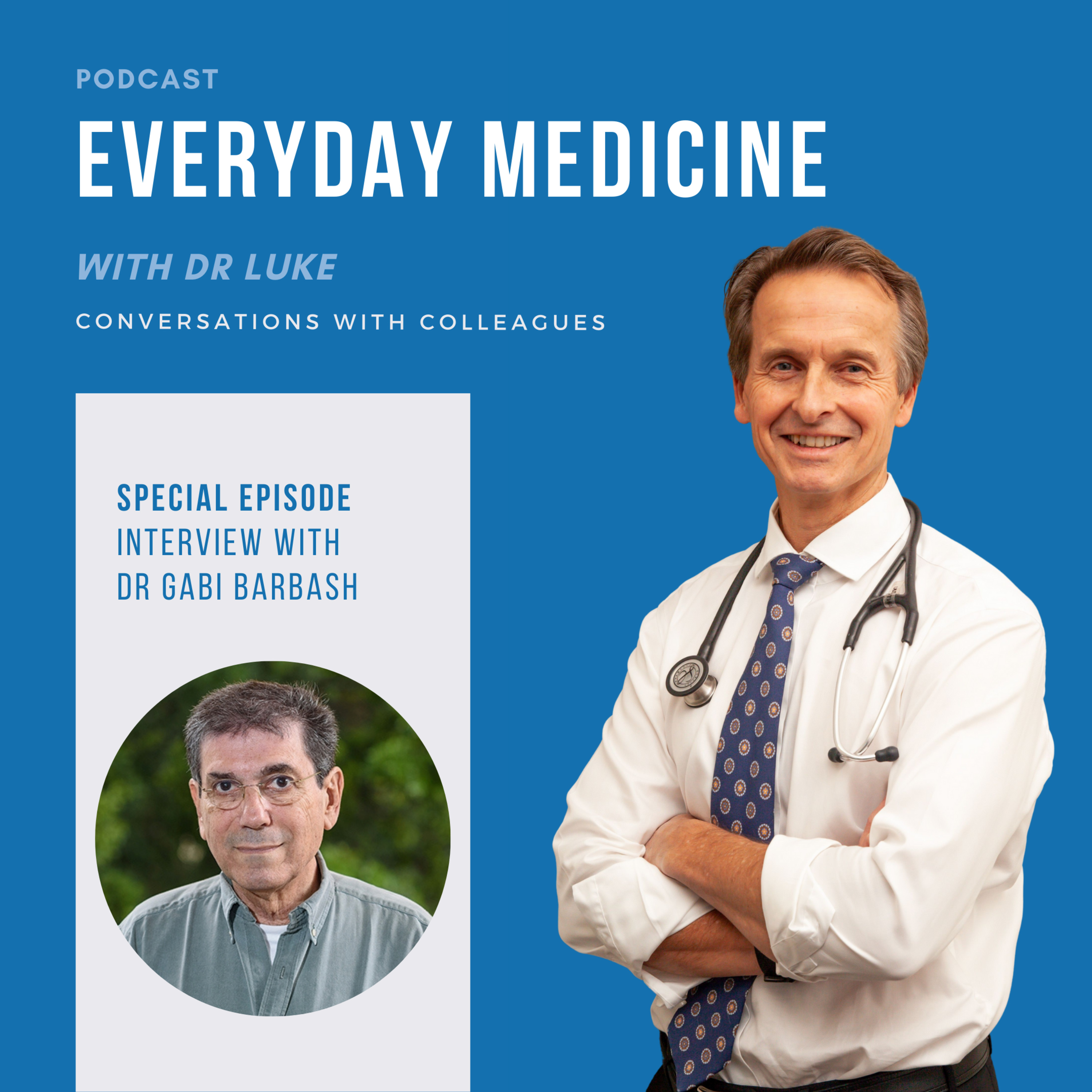
Everyday Medicine with Dr LukeSPECIAL EPISODE: COVID-19 Vaccinations with Professor Gabriel BarbashAustralia is in the dawn of its vaccination program against SARS-COV2, inoculations commenced this week among frontline health workers and aged care residents as well as our Prime Minister. By comparison, Israel’s vaccination rollout has been the fastest in the world, half the population has received one dose already and one third has received both inoculations.
In a sense, Israel has become a real-time global experiment watched by health authorities and governments across the locked down world as Israel opens itself up again to those vaccinated. Australia has much to learn from their experience. In this sp...
2021-02-2528 min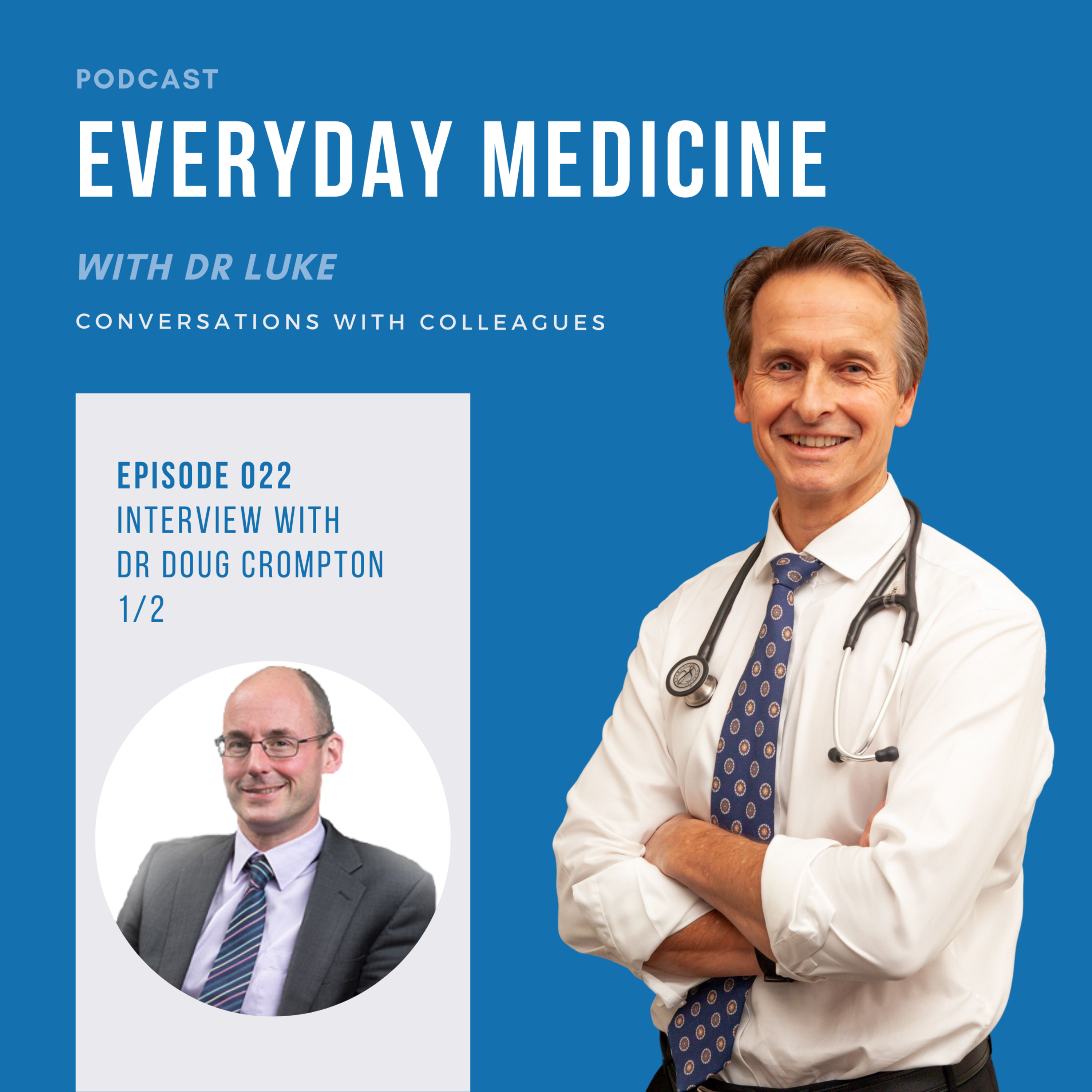
Everyday Medicine with Dr LukeEpisode 22. Stroke with Dr Doug CromptonIt is estimated that more than 56,000 strokes will be experienced by Australians this year (new and recurrent) and that half of Australians are living with the effects of a stroke which remains the third leading cause of death in Australia and kills more women than breast cancer and more men than prostate cancer. As more than 80% of strokes may be prevented and four in 10 stroke survivors have a recurrent stroke within a decade it is very important we understand the aetiology of strokes and how we may intervene effectively to reduce incidence and morbidity.
In this episode...
2021-02-2240 min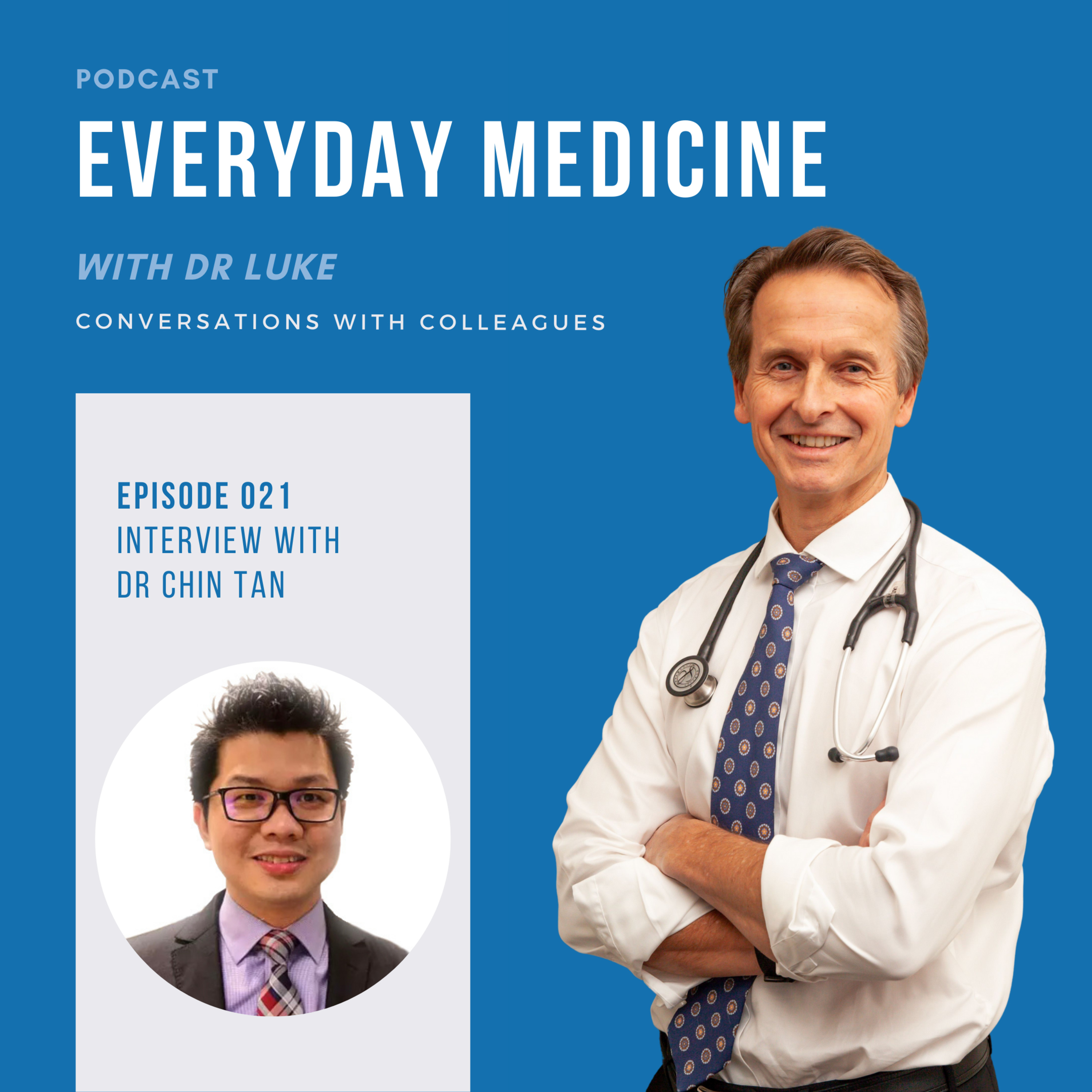
Everyday Medicine with Dr LukeEpisode 21. IDDM with Dr Chin TanIt is estimated that 130,000 Australians have been diagnosed with insulin dependent diabetes mellitus with about seven new cases per day. Approximately 60% of the diagnoses are in children and young adults under the age of 25 years. As IDDM is an autoimmune disease resulting in the destruction of insulin producing cells, glycaemic control is obtained through the administration of insulin. There have been several recent advances in continuous glucose monitoring and insulin delivery to review.
In this podcast episode we are joined by experienced endocrinologist Dr Chin Tan who will discuss:
· The importance of glycaemic control
2021-02-1521 min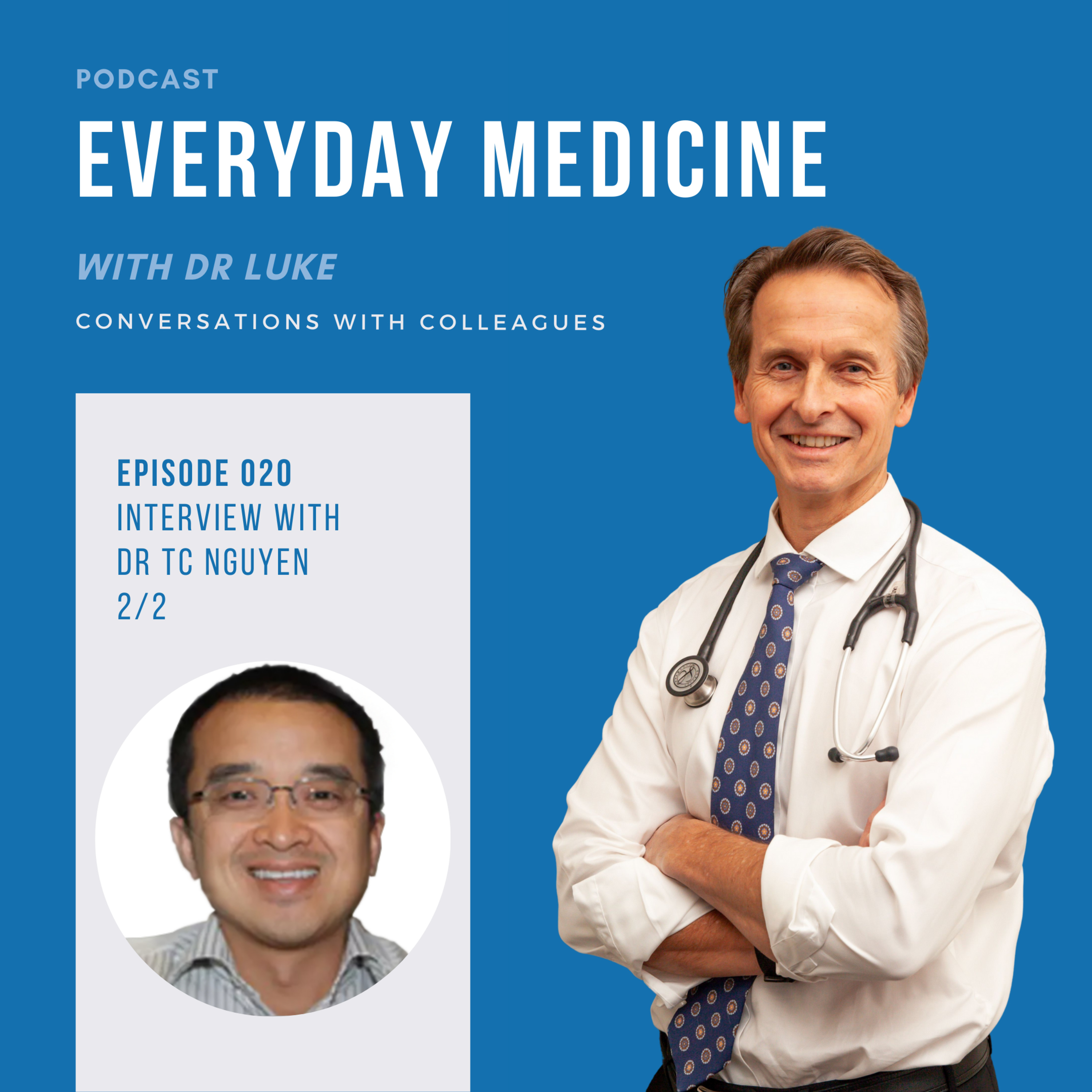
Everyday Medicine with Dr LukeEpisode 20. Endoanal ultrasound and anorectal physiology with Dr TC NguyenEndorectal ultrasonography combined with anorectal physiology allows the evaluation of the constituents of the wall of the anal canal and the scientific understanding of anorectal pathophysiology. It is very important to appreciate a patient’s anorectal dynamics before initiating an effective management strategy for what may be a wide variety of pelvic-anorectal disorders.
In this episode we are joined by expert colorectal surgeon Mr T C Nguyen as he discusses the application of endorectal ultrasound and anorectal physiology studies –
· The management of faecal incontinence
· Management of obstructed defecation (Anismus) and dyssynergia
These...
2021-02-0817 min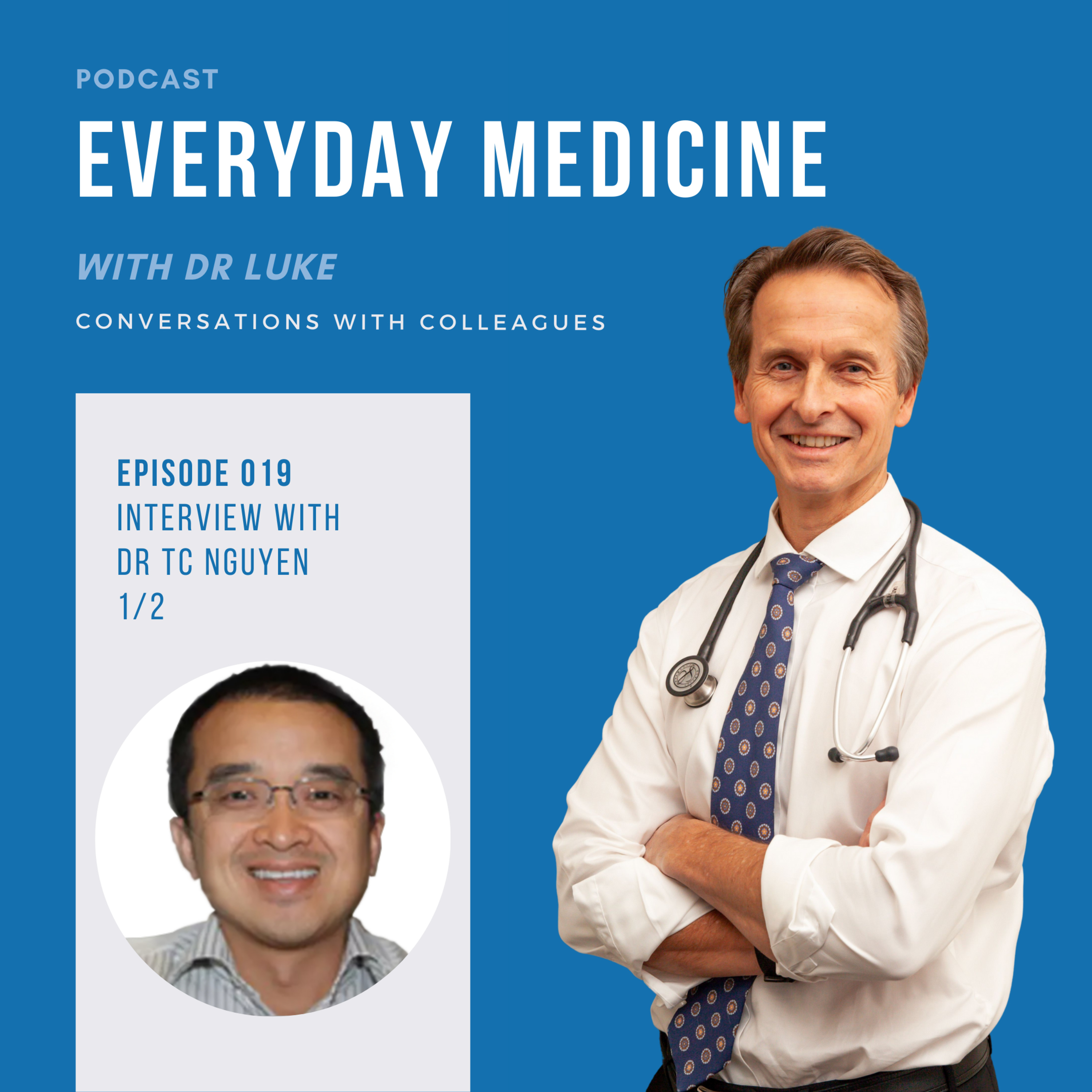
Everyday Medicine with Dr LukeEpisode 19. Robotic Surgery with Dr TC NguyenRobotic assisted surgery allows doctors to perform complex procedures with more precision, flexibility and control than is possible with conventional techniques. Now used in many forms of surgery including cardiac, prostatic and orthopaedic, in this episode we are joined by the dynamic and highly skilled Mr T C Nguyen who discusses –
· The application of robotic surgery to colorectal pathology
· Appropriate patient selection
· Outcomes and advantages
TC shares his personal journey from a young boy fleeing war torn Vietnam making his home in Melbourne, to highly skilled and respected surgeon in this excell...
2021-02-0121 min
Everyday Medicine with Dr LukeEpisode 18. Voluntary Assisted Dying (VAD) with Dr Frank HofmannWednesday 19th June 2019 was a historic day for Victoria after parliament introduced voluntary assisted dying legislation to the community for patients facing imminent death as a result of incurable disease, with that ruling a patient’s decision to end his or her life voluntarily became a possibility.
The legislation is complicated and coupled with many safeguards. VAD has understandably been debated with great emotion and considerable controversy before and since the legislation was introduced.
In this episode we discuss the legislation with Dr Frank Hofmann who approaches the subject with extreme sensitivity, consideration and empathy in...
2021-01-2522 min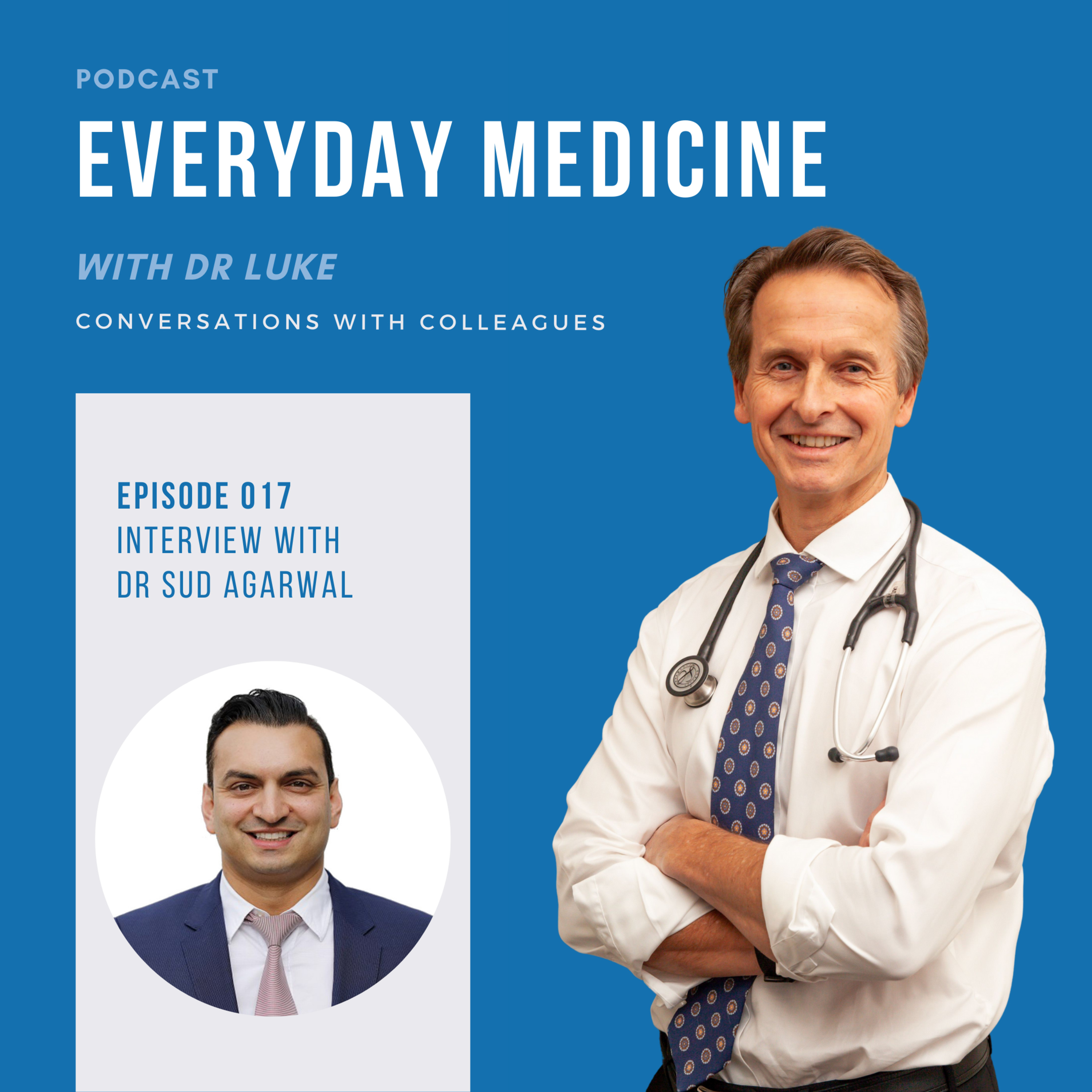
Everyday Medicine with Dr LukeEpisode 17. CBD with Dr Sud AgarwalMedical cannabinoids are derived from the cannabis sativa plant. There are 144 known cannabinoids, THC is perhaps the best known for its psycho-active effects, however cannabidiol (CBD) is now being recognised for its many medical applications. To discuss the role of cannabidiol in medicine we are joined by Dr Sud Agarwal, anaesthetist and CEO of one of Australia’s most interesting and emerging biotechs called Cannvalate. In this episode Sud discusses the uses of CBD -
· as an anticonvulsant and neuroprotective agent
· as an anti-inflammatory and
· as an immunomodulator
Sud also takes us on...
2021-01-1822 min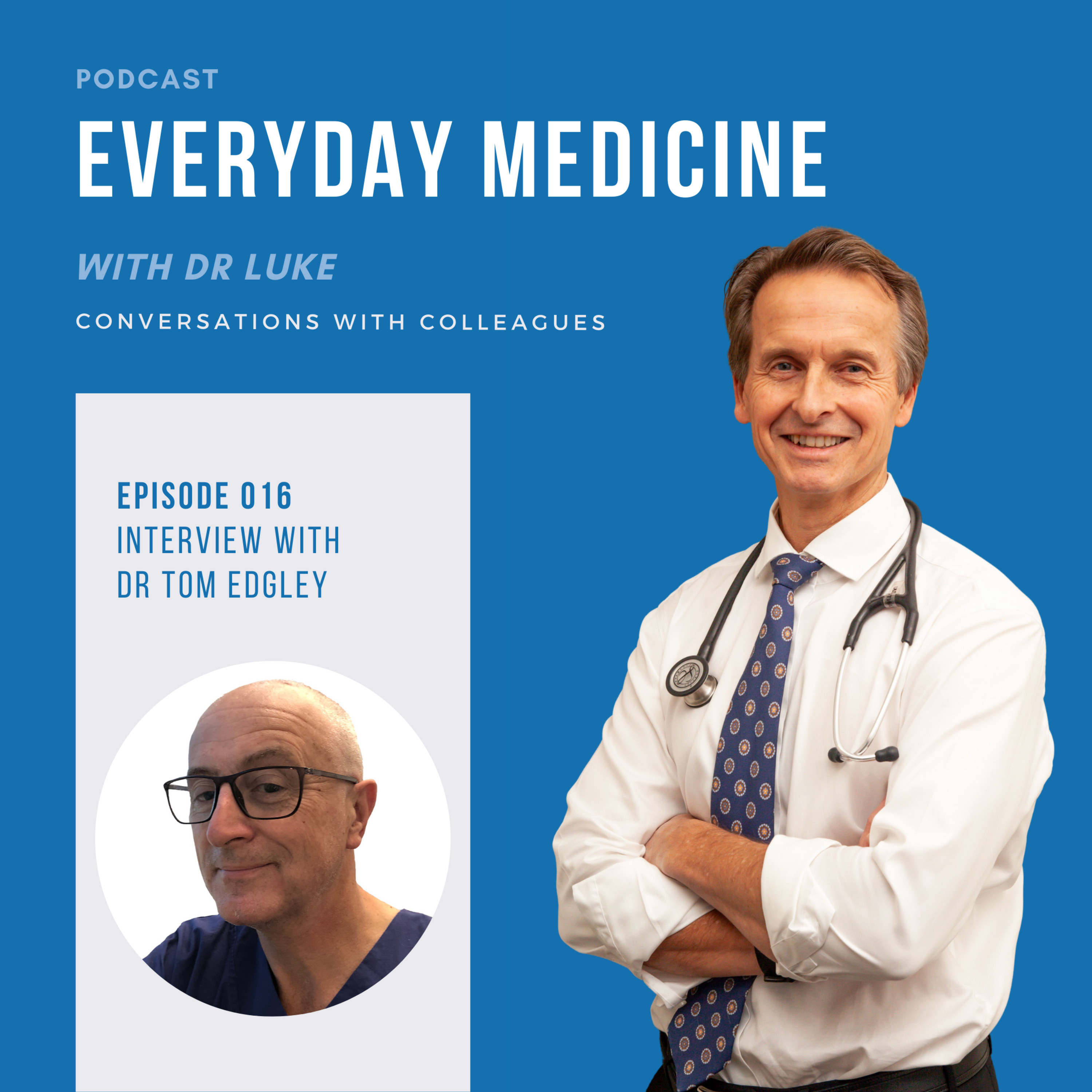
Everyday Medicine with Dr LukeEpisode 16. Trauma Courses with Dr Tom EdgleyIn 2019 experienced anaesthetist Dr Tom Edgley was left to defend his two properties in the rural and bushy enclave of Tonimbuk from the disastrous fires claiming over 26 properties in the region. Not only did Tom survive protecting his properties from the fire, but he also lent a major hand to his neighbours and was involved in the emotional rehabilitation of his community. He cited his attendance at emergency courses including –
· EMST (Early Management of Severe Trauma)
· Wilderness Medicine Utah
Both important resources in laying the foundation for him to follow effective strategies in the...
2021-01-1318 min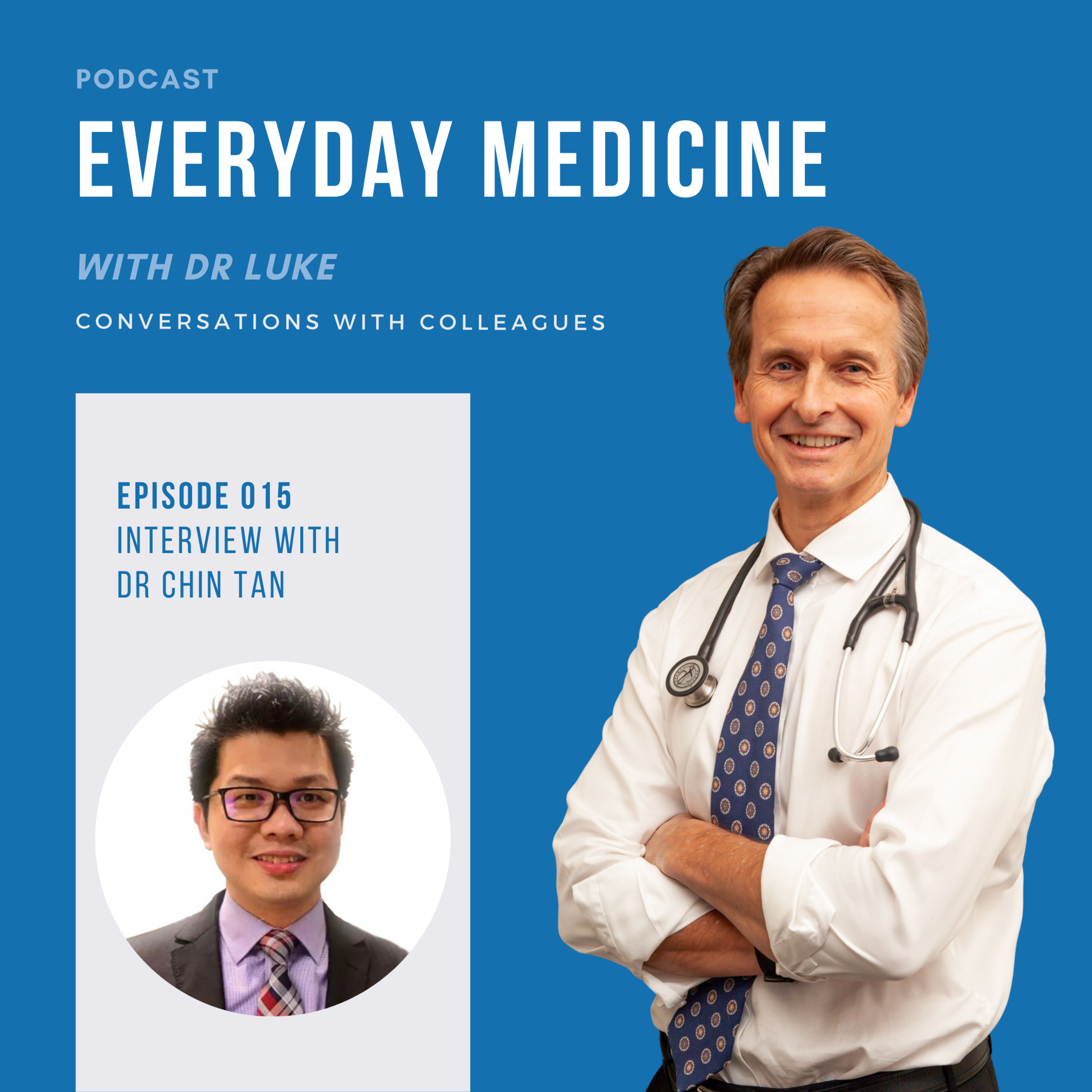
Everyday Medicine with Dr LukeEpisode 15. Type 2 Diabetes with Dr Chin TanIn this episode we have a conversation about Type 2 diabetes, a condition that affects at least 1.2 million Australians (5% of Australians) and for which there are a complex number of pharmacologic treatment strategies available.
We are joined by experienced and very popular Endocrinologist Dr Chin Tan who discusses –
· Oral hypoglycaemic agents that are available to us in Australia
· How to combine these agents for effective glycaemic control
· The place of insulin in type 2 diabetes
Chin also discusses the broader metabolic syndrome and the key requirement for BMI control in type 2 diabe...
2021-01-0328 min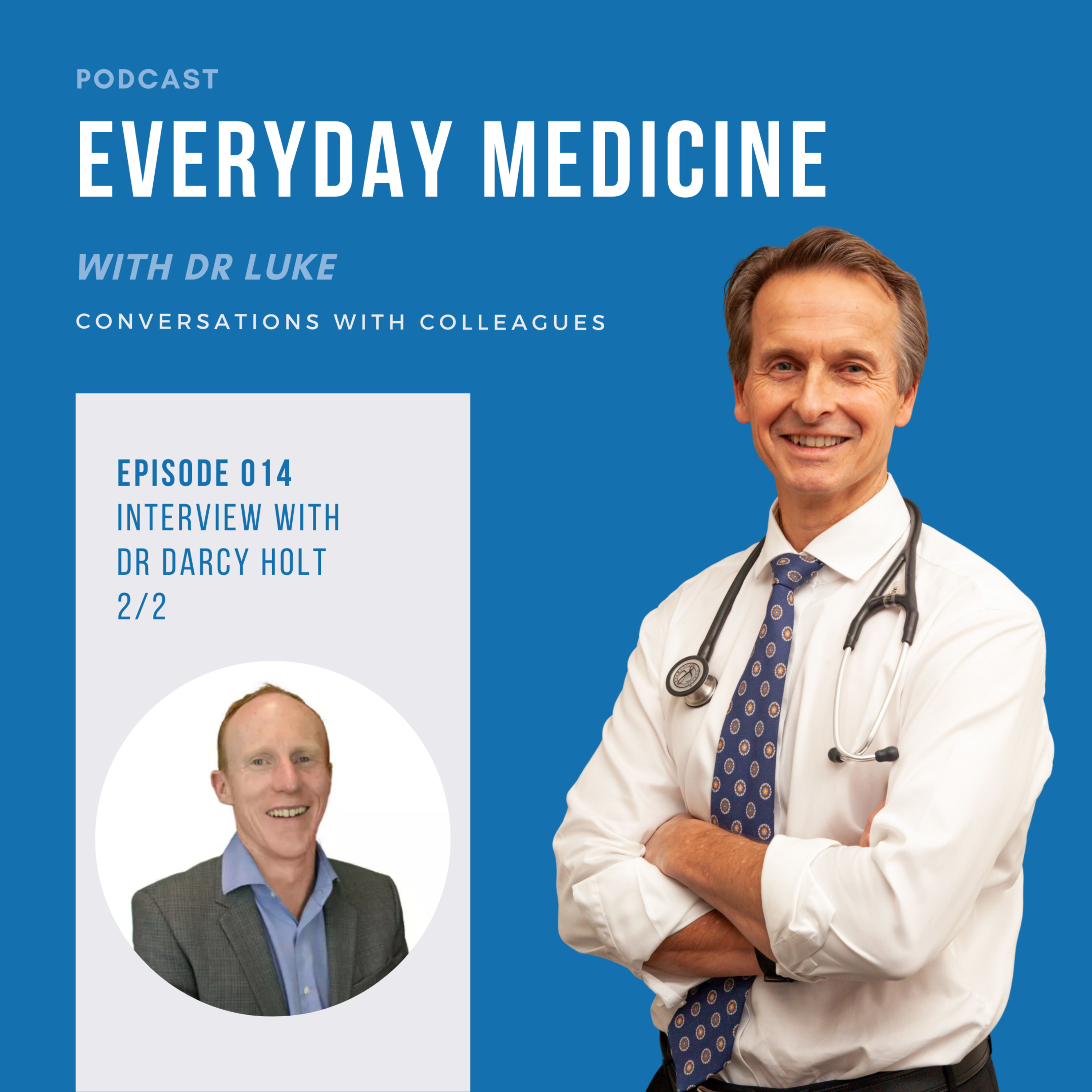
Everyday Medicine with Dr LukeEpisode 14. Faecal Microbiota Transplant with Dr Darcy HoltThe transfer of stool from a healthy donor into the gastrointestinal tract of a recipient (FMT) at first consideration does not seem like a reasonable or scientific approach to the treatment of gastrointestinal diseases. Historically however, it has been used by communities for over 3,000 years, gaining credibility in 1958 after a paper by Eisemen in Denver who described treating pseudomembranous colitis this way. More recently double-blind randomised control trials have demonstrated the efficacy of FMT in the treatment of severe clostridium difficile enterocolitis. To discuss this subject in more detail we are joined in a conversation with Dr Darcy Holt...
2020-12-2814 min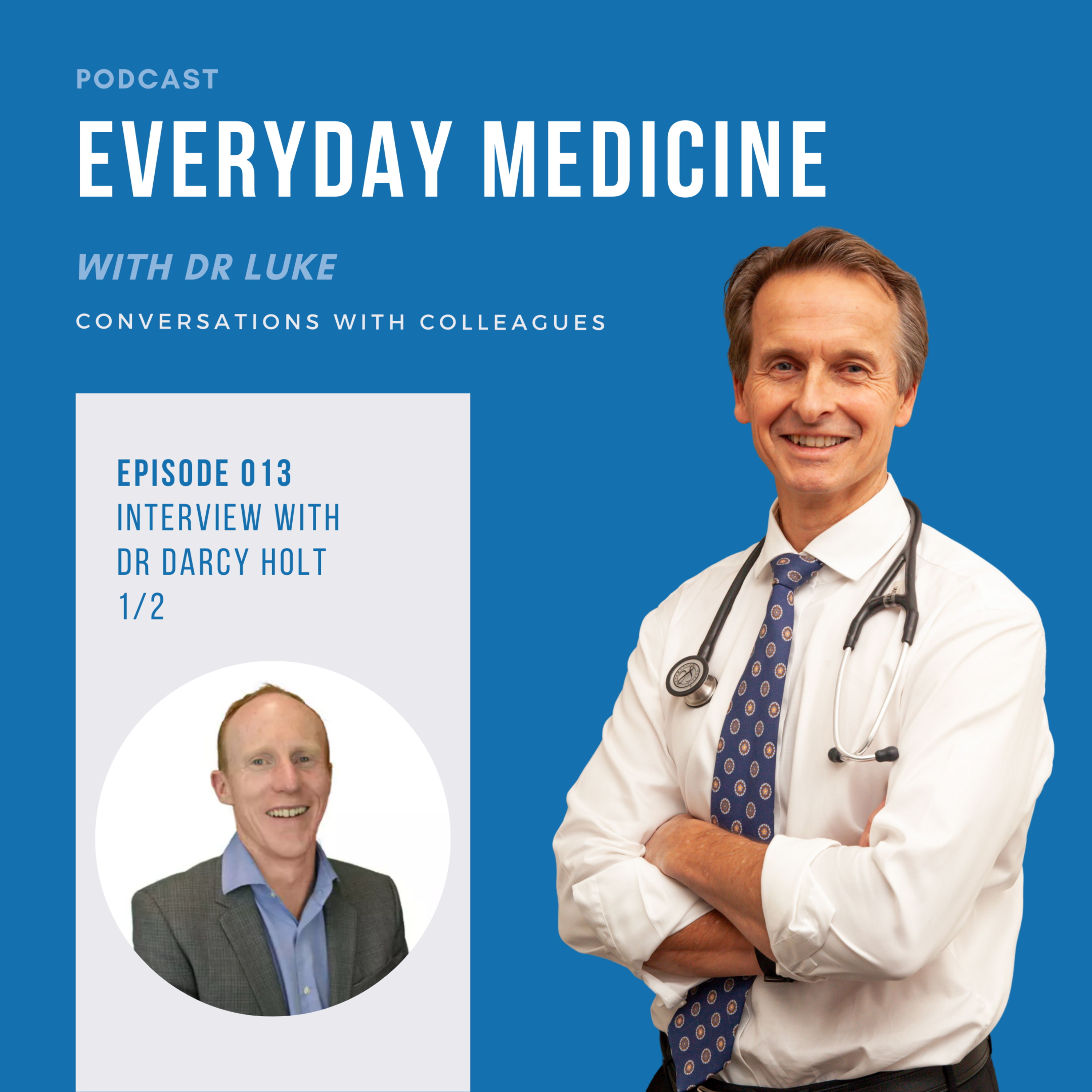
Everyday Medicine with Dr LukeEpisode 13. Biologics and Small Molecules in IBD with Dr Darcy HoltDARCY HOLT - BIOLOGICS AND SMALL MOLECULES FOR INFLAMMATORY BOWEL DISEASE
Biologic agents (produced in living organisms or containing components of living organisms) coupled with a variety of new small molecules (acting in novel ways to influence the human immune system) have dramatically improved medical management of inflammatory bowel disease. In this podcast episode, we are joined by Dr Darcy Holt, a senior gastroenterologist at Monash Health, with a special interest in inflammatory bowel disease and body composition to discuss -
· TNF inhibitors including the chimeric infliximab, fully humanised recombinant adalimumab, fully humanised monoclonal antibody g...
2020-12-2123 min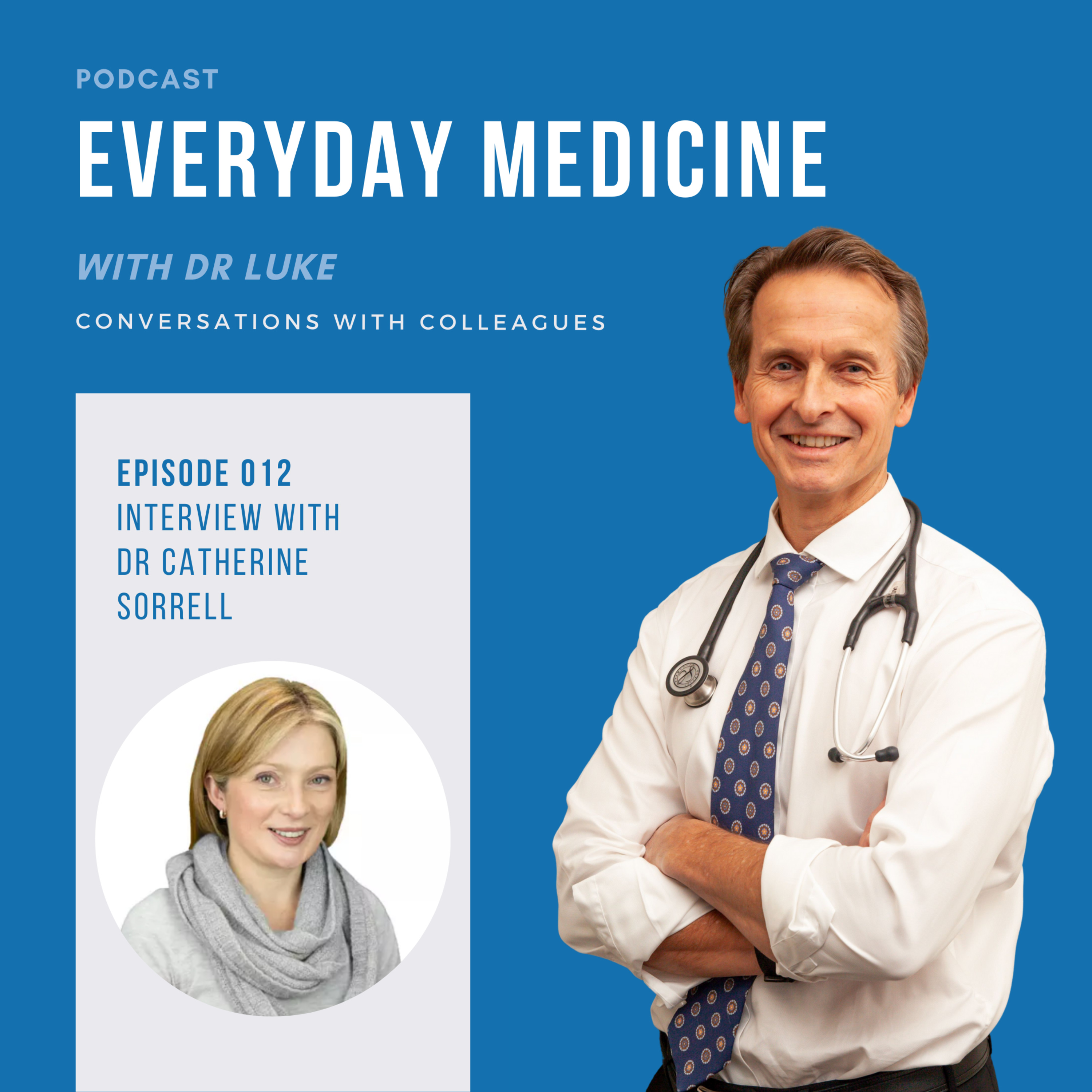
Everyday Medicine with Dr LukeEpisode 12. IBD with Dr Catherine SorrellInflammatory Bowel Disease (IBD) affects approximately 85,000 Australians and 5 million people worldwide and includes Crohn’s disease and ulcerative colitis. These conditions may have a major impact on patient’s quality of life. To discuss both ulcerative colitis and Crohn’s disease in more detail we are joined by Dr Catherine Sorrell, a very experienced and popular gastroenterologist who takes us on a fascinating journey including –
· Top down and bottom up approaches to pharmacological management
· Sharing her approach to selecting medical therapy for patients with IBD.
Catherine explains these clinical problems with great mastery. I am pleas...
2020-12-1428 min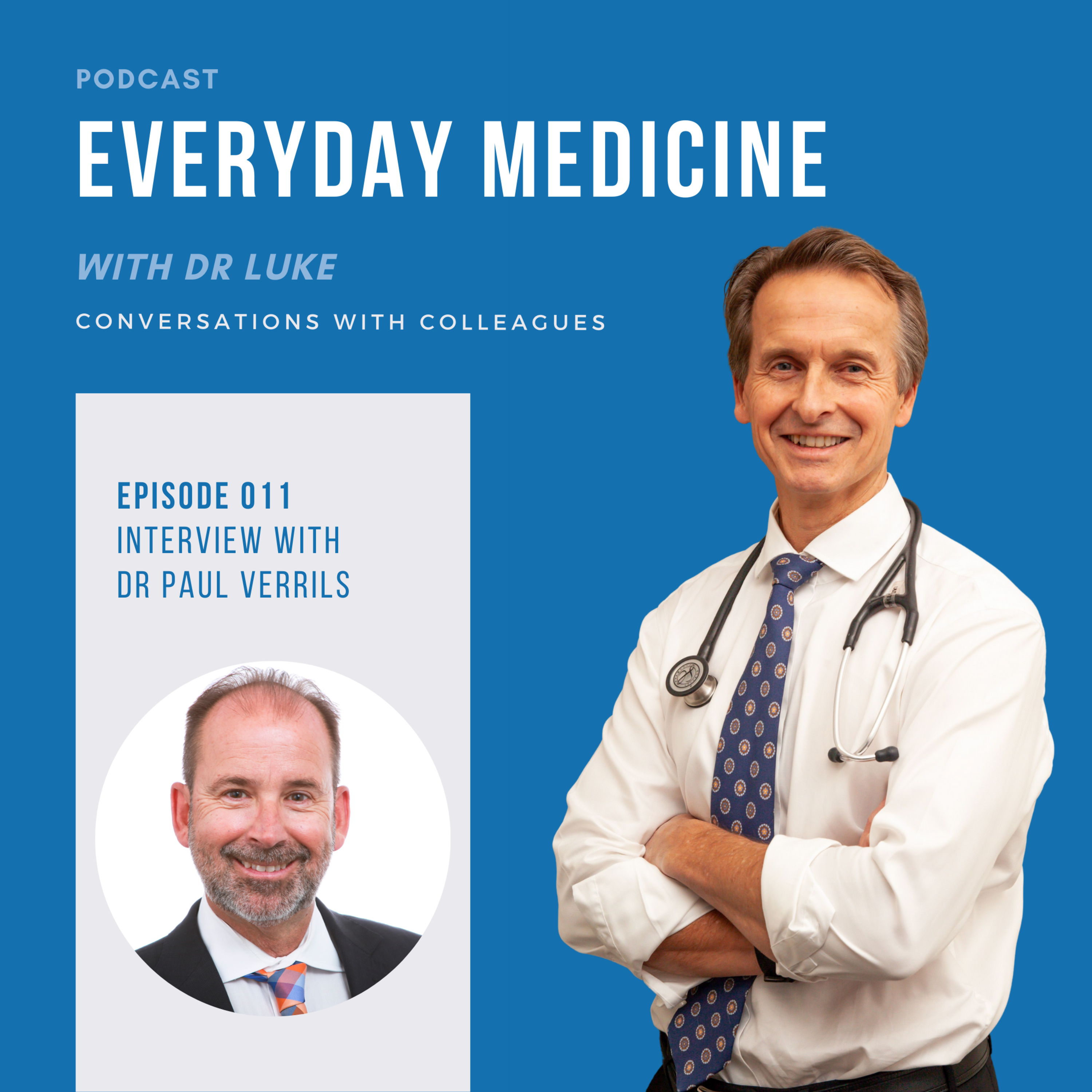
Everyday Medicine with Dr LukeEpisode 11. Spinal Chord Stimulation with Dr Paul VerrilsAustralia has led the world in pain management, interventional techniques and pain research including in the management of severe and debilitating axial and musculoskeletal pain via spinal cord and DRG stimulation as well as in several evolving techniques for the management of visceral pain.
Recently potential breakthroughs have been emerging in the application of spinal cord stimulation to control symptoms related to IBS and gastroparesis. Dr Paul Verrills entered pain management as a consultant during the dawn of the speciality and has been at the vanguard of pain management both in Australia and worldwide. He established the M...
2020-12-0725 min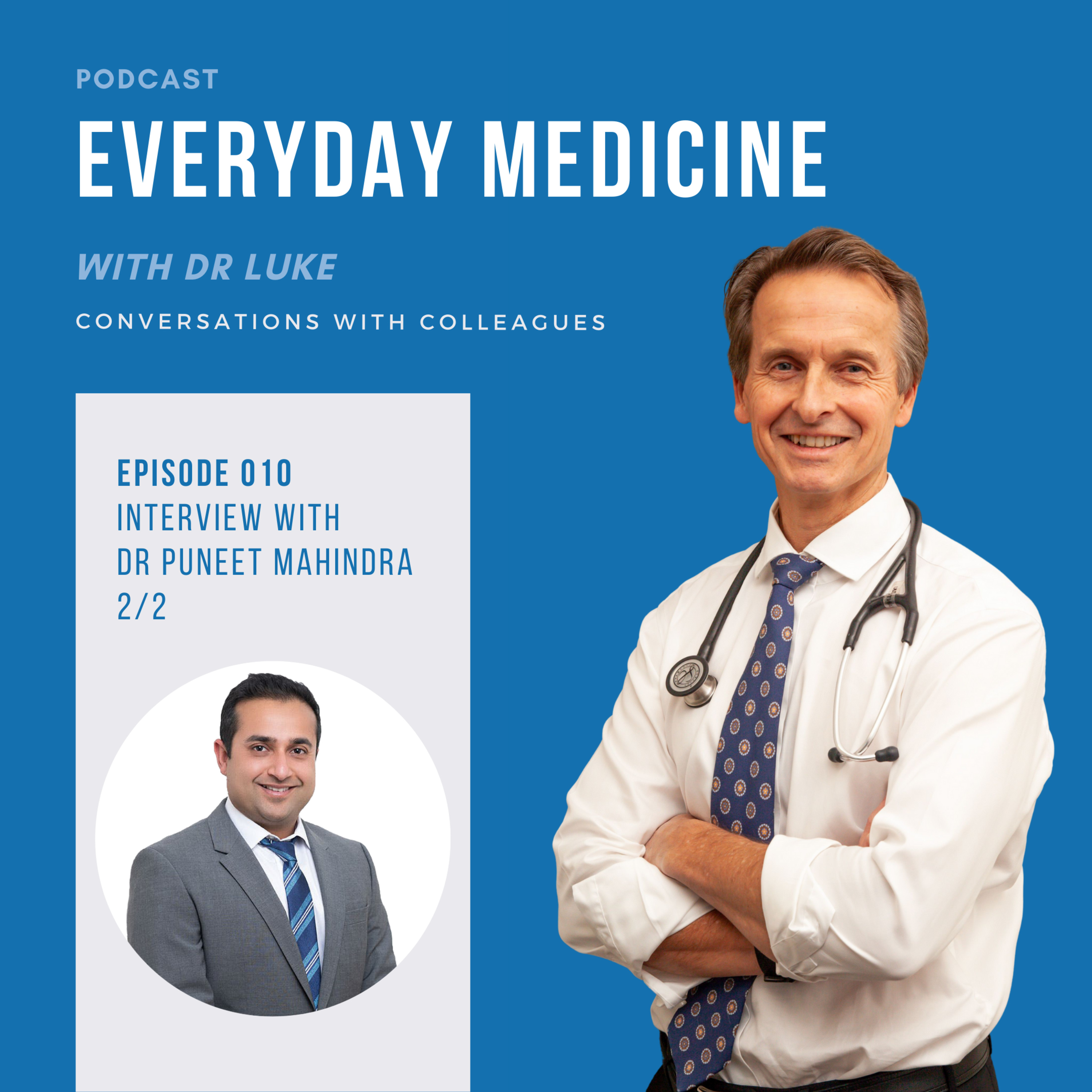
Everyday Medicine with Dr LukeEpisode 10. Barrett's Oesophagus with Dr Puneet MahindraIn this episode I have a conversation with Dr Puneet Mahindra on the subject of Barrett’s oesophagus. Puneet not only discusses the origins of this condition, named after Australian born thoracic surgeon Mr Norman Barrett, but also discusses –
· Its relationship to chronic reflux disease
· Adenocarcinoma risk
· Surveillance guidelines
· Appropriate medical management
Puneet makes the point that Barrett’s oesophagus is an important reason why we should all take gastro-oesophageal reflux disease seriously. This is an excellent introduction and overview to the subject; I hope you enjoy the conversation.
Refe...
2020-11-3017 min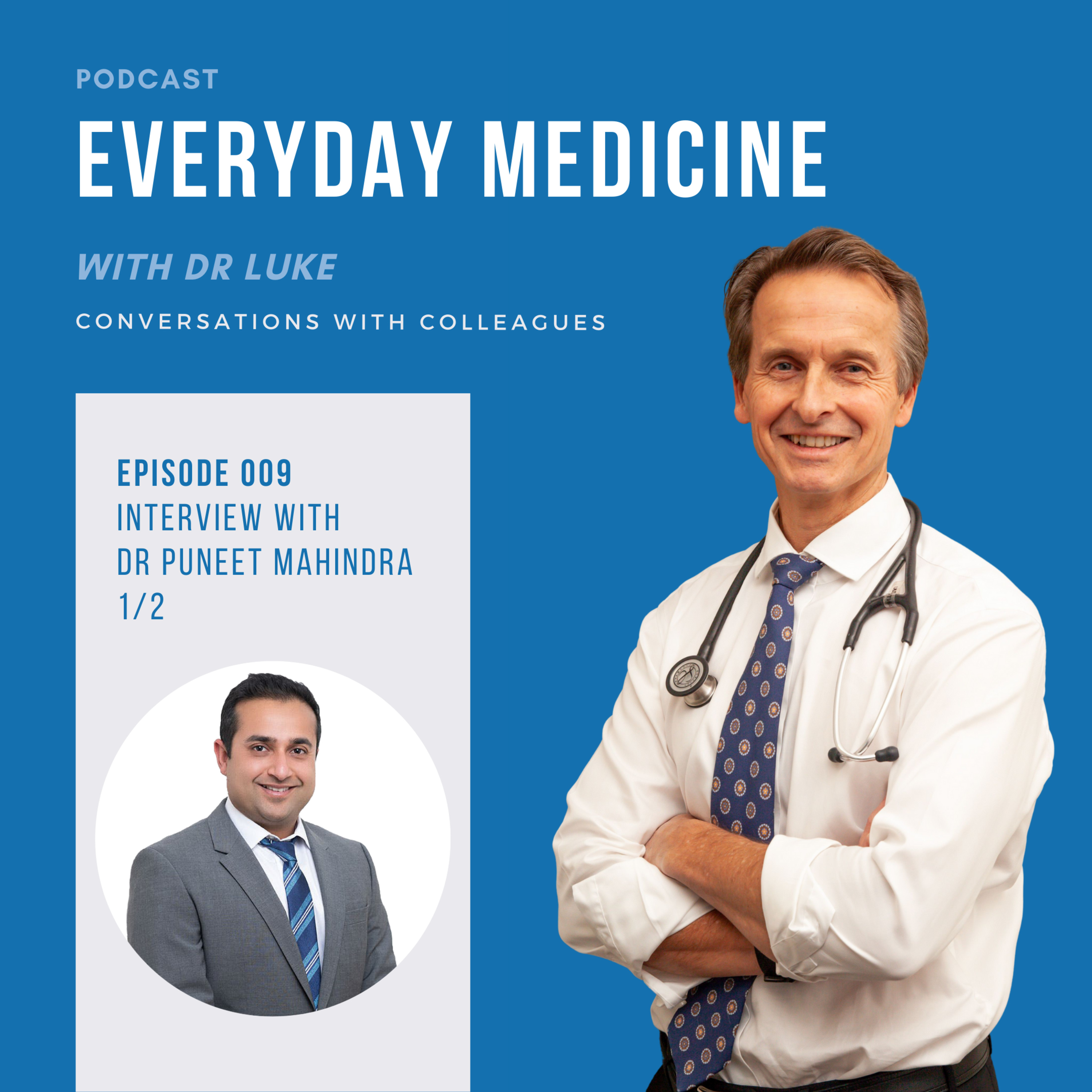
Everyday Medicine with Dr LukeEpisode 9. Gastro-Oesophageal Reflux Disease with Dr Puneet MahindraIn this episode I interview experienced gastroenterologist Dr Puneet Mahindra on the common clinical problem of gastro-oesophageal reflux disease. Puneet details –
· Risk factors
· Complications
· Approaches to management
He provides personal tips drawn from experience and the literature outlining an approach that should be helpful to everyone practicing clinical medicine.
Puneet also walks us through his journey to becoming a gastroenterologist, growing up in India, working and studying in the United Kingdom and then Australia. I hope you enjoy the conversation.
Useful references include –
www.gesa.org.au...
2020-11-2321 min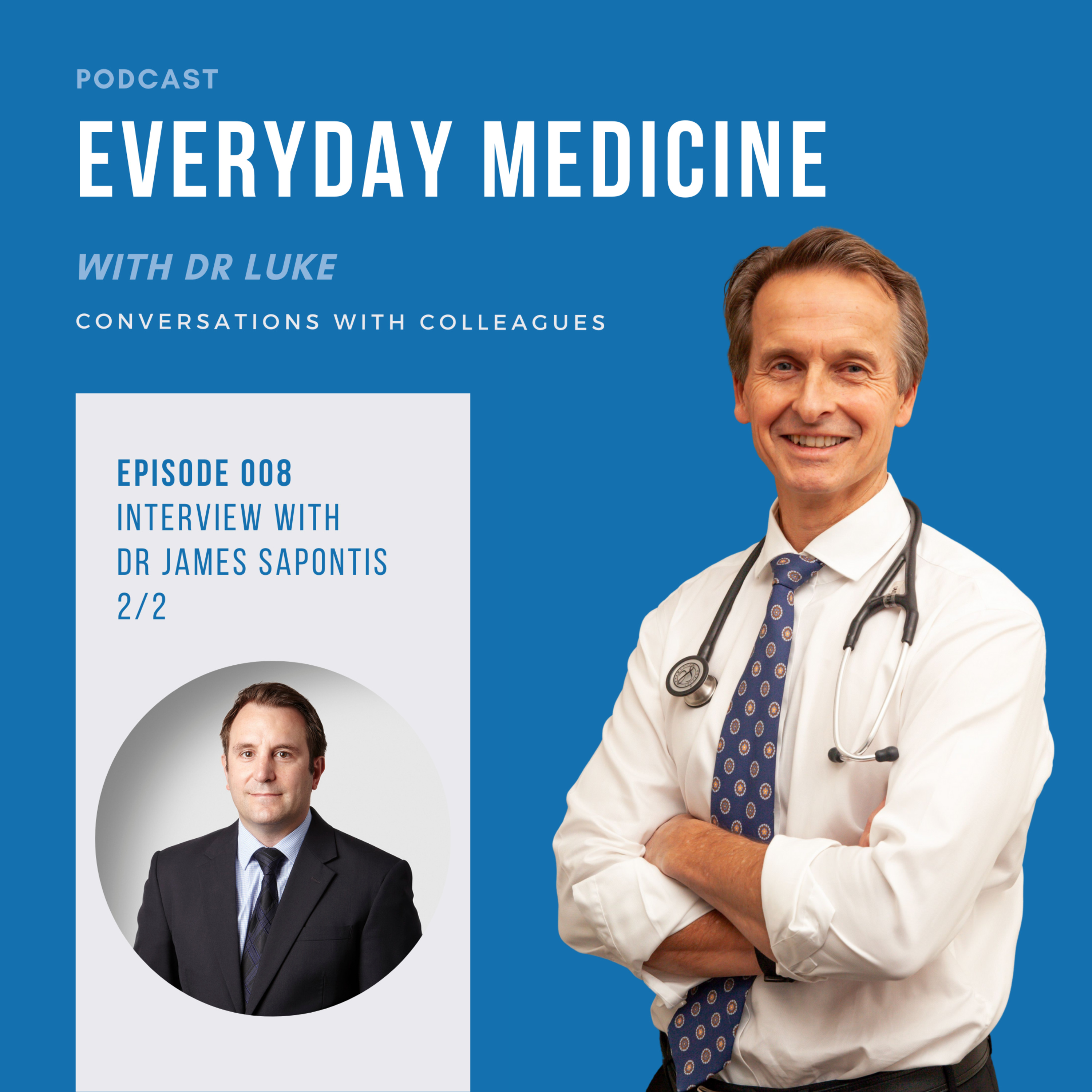
Everyday Medicine with Dr LukeEpisode 8. Heart Failure with Dr James SapontisIt is estimated that at least 300,000 Australians have chronic heart failure imposing a significant impact on the quality of life and mortality. In this podcast episode, we are joined by an experienced interventional cardiologist, Dr James Sapontis, as we explore heart failure with preserved ejection fraction (HFpEF) and heart failure with reduced ejection fraction (HFrEF). James carefully dissects and describes these two forms of heart failure by discussing –
· Diagnosis
· Risk factors
· Treatment approaches
This was a very interesting conversation that I am delighted to share with you.
Useful references inclu...
2020-11-1614 min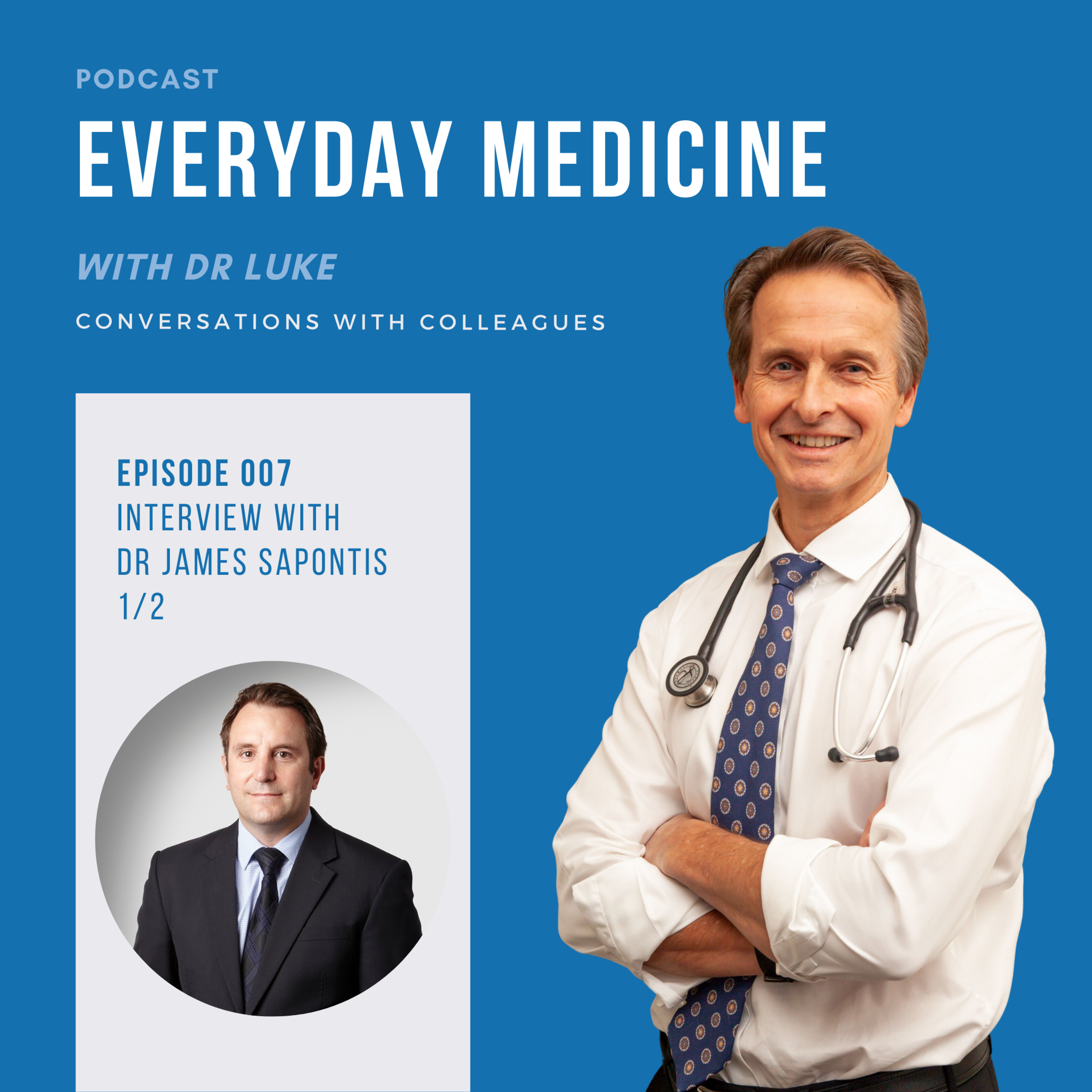
Everyday Medicine with Dr LukeEpisode 7. Coronary CT Angiography (CCTA) with Dr James SapontisIt is estimated that 1 in 4 Australian deaths relate to cardiovascular disease and that there are over 60,000 acute coronary events, including either angina or myocardial infarctions, recorded each year in Australia. In an attempt to reduce morbidity and mortality medical efforts have been directed to primary prevention and improving the selection of patients likely to require coronary intervention, such as cardiac stenting or revascularisation. To discuss the place of coronary CT angiography in the investigation and work up of a patient suspected to have coronary disease we are joined by the very impressive and knowledgeable interventional cardiologist, Dr James Sapontis...
2020-11-0922 min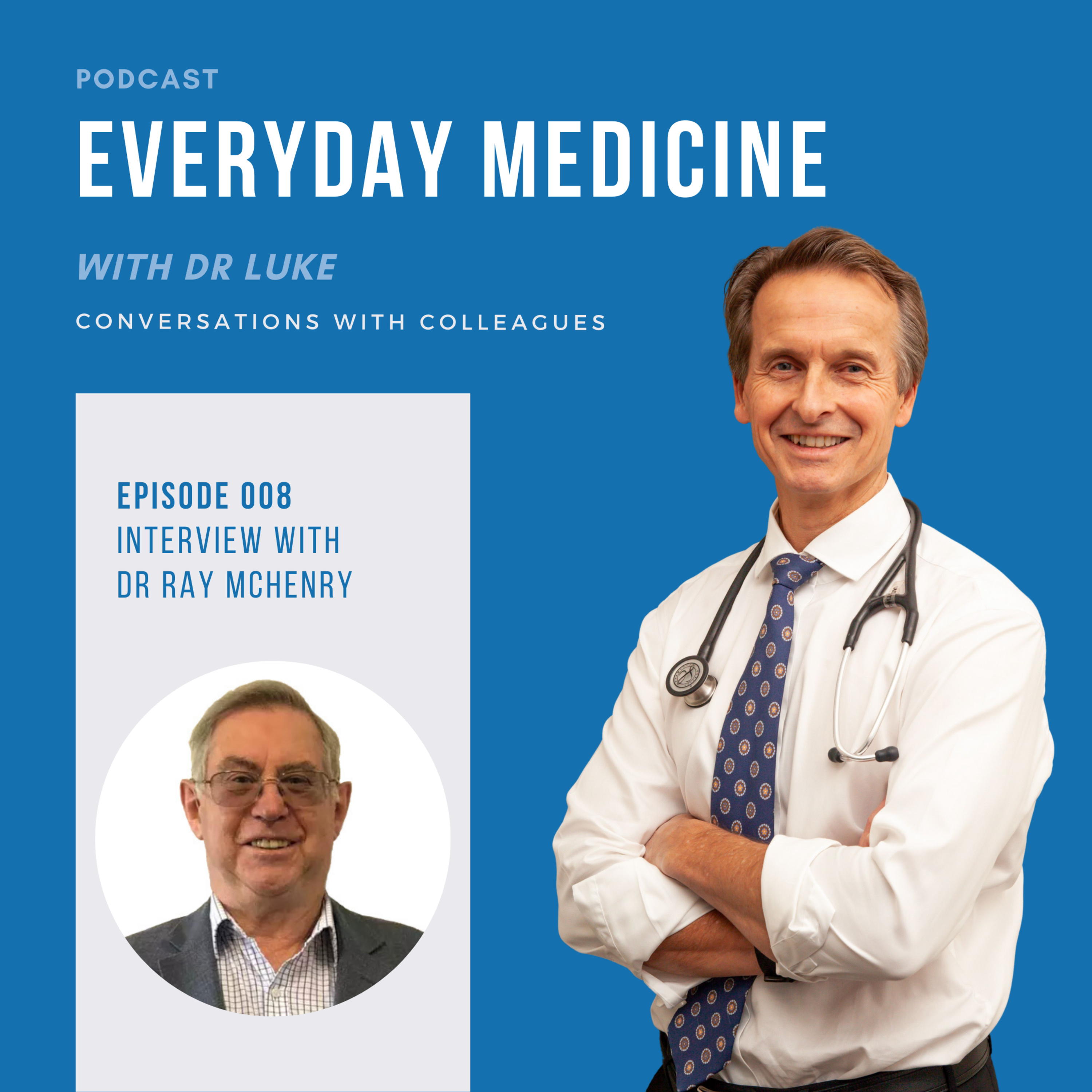
Everyday Medicine with Dr LukeEpisode 6. Bariatric Surgery with Mr Ray McHenryIn this episode we have a very interesting conversation with one of Australia’s leading bariatric surgeons, Mr Raymond McHenry, on surgical approaches to weight loss, focussing particularly on the gastric sleeve and roux-en-y gastric bypass operations.
Ray discusses –
· patient selection
· psychological profiling
· choice of operation and outcomes and
· covers some of the early experiences with other bariatric approaches
This conversation provided a very insightful discussion from one of our surgical masters.
Useful references include -
www.lapsurgeryaustralia.com.au
ww...
2020-11-0423 min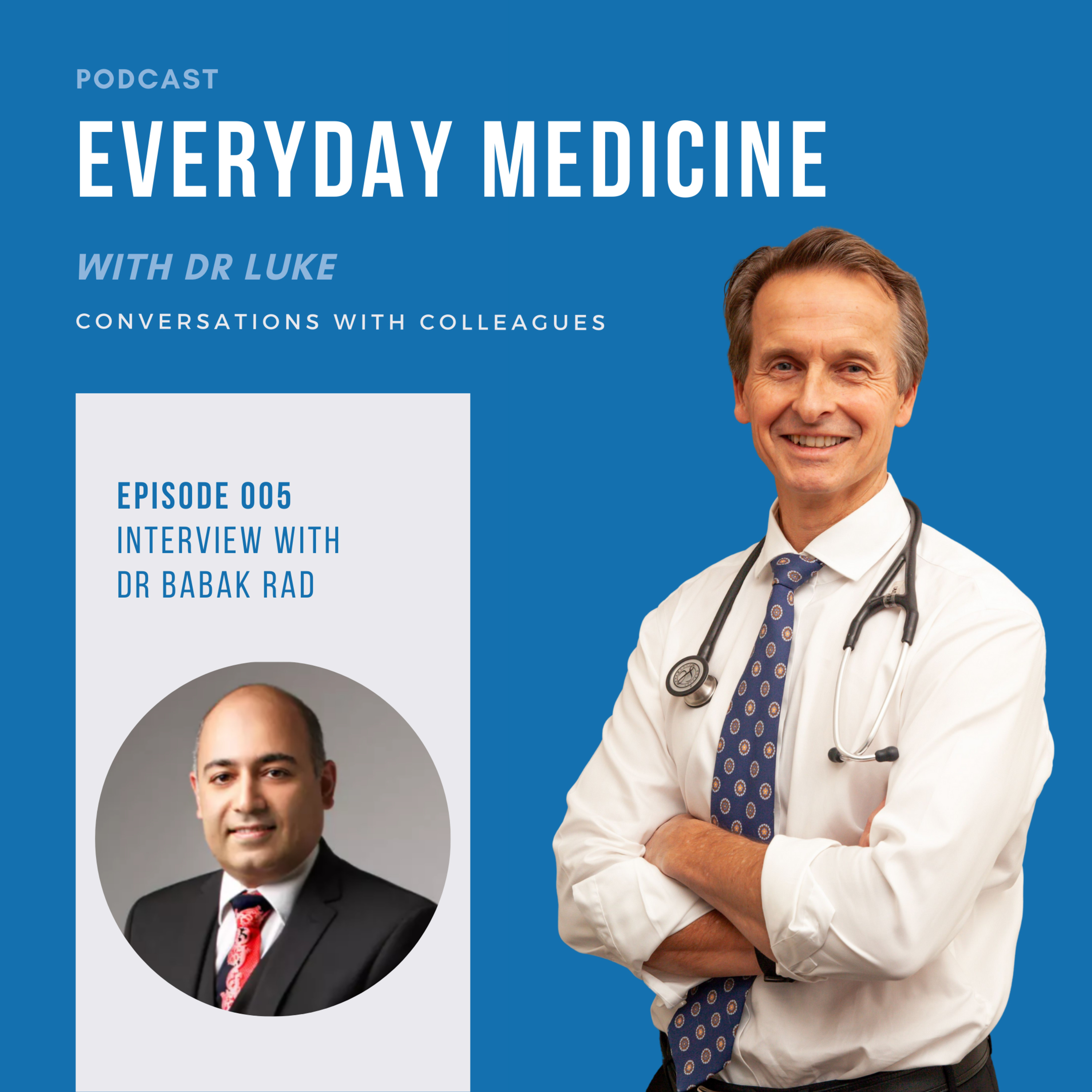
Everyday Medicine with Dr LukeEpisode 5. COVID-19 with Dr Babak RadCovid 19 has brought forth upon the world a pandemic unrivalled since the Spanish flu (1918 – 1920) caused by H1N1 influenza A. Described by Australian Treasurer Josh Frydenberg as the “new and invisible enemy”, every doctor has had to avail themselves of knowledge regarding this highly contagious virus.
Today we are joined by expert infectious disease specialist Dr Babak Rad who will discuss:
· Our knowledge regarding the incubation period of Covid 19
· Virulence
· Quality of testing
· Asymptomatic spreaders
· The immunocompromised patients
· Medical therapies
· Vaccines
Much of our k...
2020-10-2630 min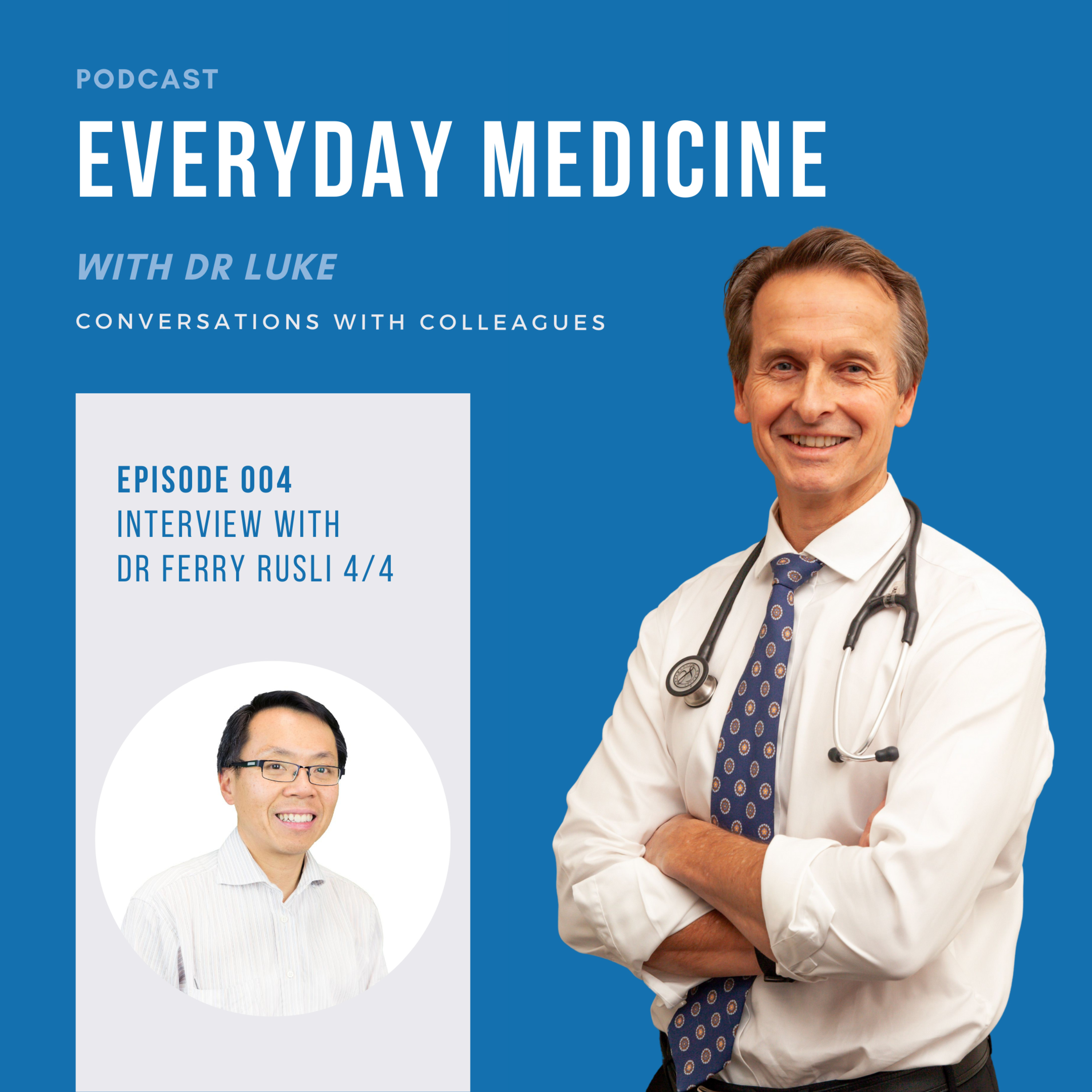
Everyday Medicine with Dr LukeEpisode 4. Hepatitis C with Dr Ferry RusliIn this episode I have a conversation with hepatologist and gastroenterologist Dr Ferry Rusli in a four-part series on liver disease where we explore chronic hepatitis C, its population reservoirs in Australia and approaches to treatment.
In particular, Ferry points out –
· The need to increase our effectiveness at treating hepatitis C in at risk populations (e.g. prison population)
· Discusses the impressive breakthrough with new antiviral therapies and their effectiveness in curing hepatitis C
· Surveillance for hepatocellular carcinoma
I really hope you find this conversation as interesting as I did.
2020-10-1913 min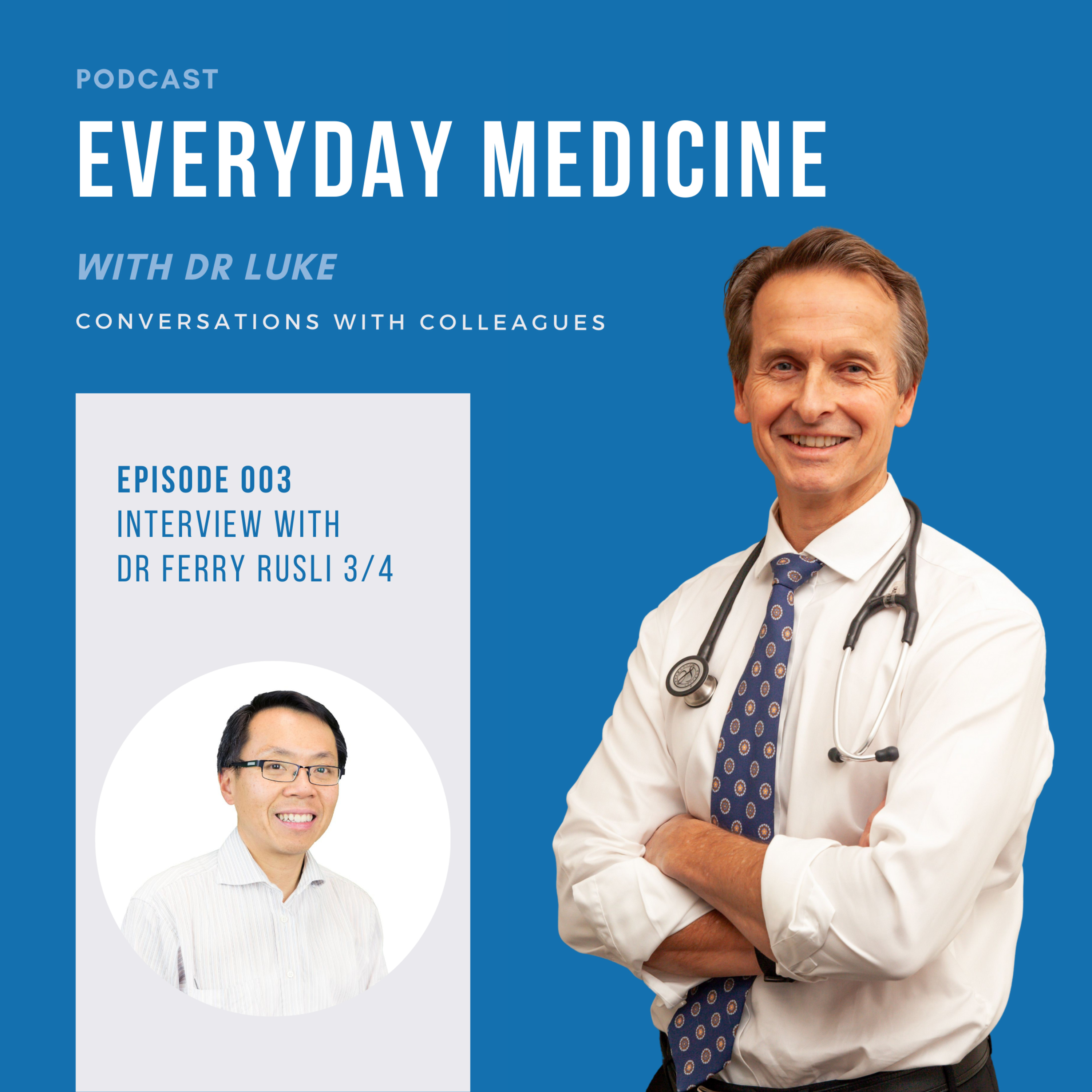
Everyday Medicine with Dr LukeEpisode 3. Hepatitis B with Dr Ferry RusliIn this episode I talk with experienced gastroenterologist and hepatologist Dr Ferry Rusli on the subject of hepatitis B in a four-part series on liver disease. Ferry discusses -
· the prevalence of hepatitis B in the Asia Pacific region
· the long-term complications and consequences of hepatitis B
· treatment options including pharmacological therapies which are currently falling short of the national target for patients receiving treatment.
This conversation provides a great introduction to current approaches to hepatitis B management. I hope you enjoy the conversation.
Useful reference are -
w...
2020-10-1216 min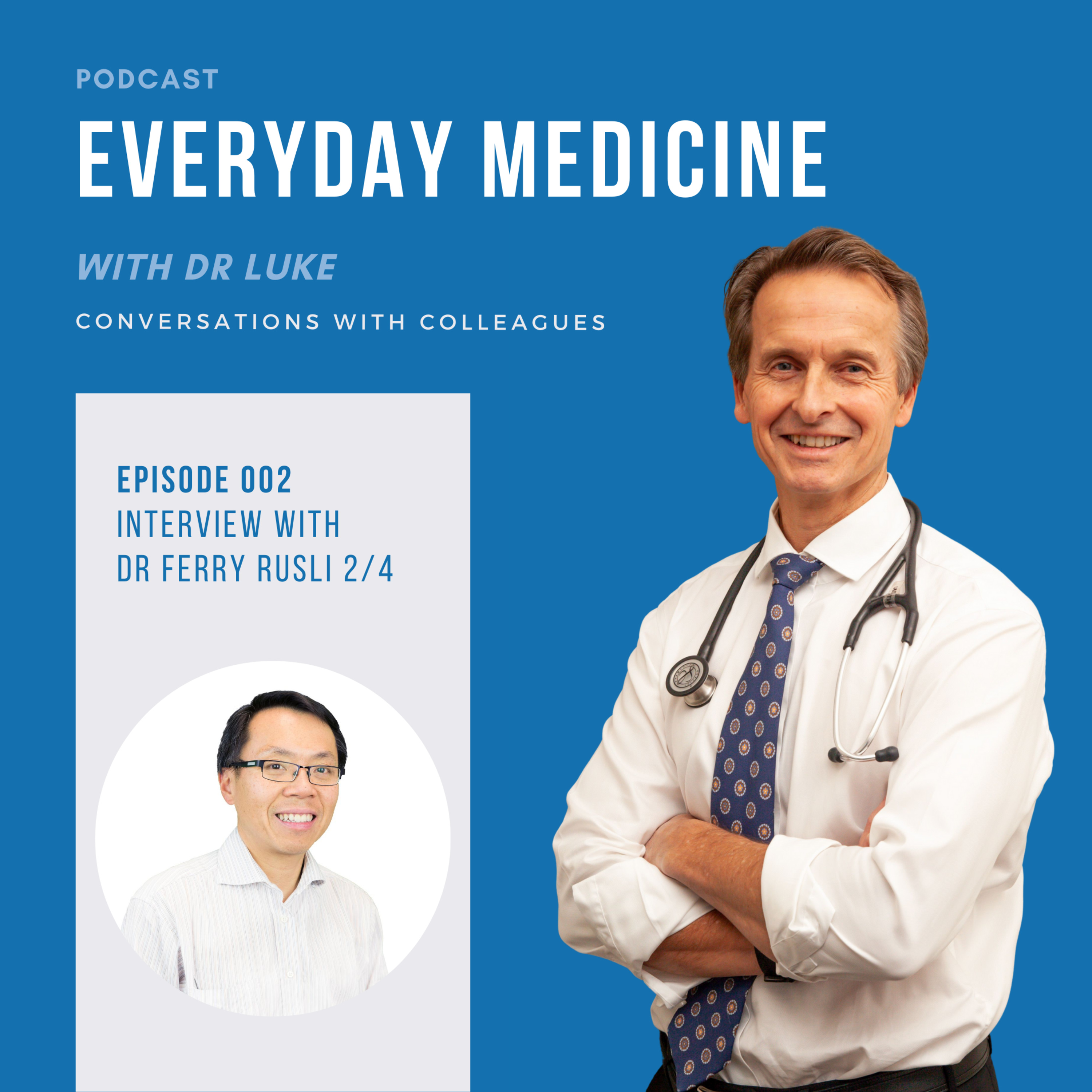
Everyday Medicine with Dr LukeEpisode 2. Non-Alcoholic Fatty Liver Disease with Dr Ferry RusliIn this episode I am joined by Dr Ferry Rusli, an experienced gastroenterologist and hepatologist to discuss non-alcoholic fatty liver disease in a four-part series on hepatology.
Ferry discusses –
· the prevalence of non-alcoholic fatty liver disease (NAFLD) as it applies to the Australian population
· non-alcoholic steatohepatitis (NASH)
· cirrhosis, hepatocellular carcinoma and liver failure as sequela of unmanaged NASH
Ferry discusses the relevance of non-alcoholic fatty liver disease to the metabolic syndrome and some key management points, in particular focussing on controlling body mass index. There is much to learn from...
2020-10-0515 min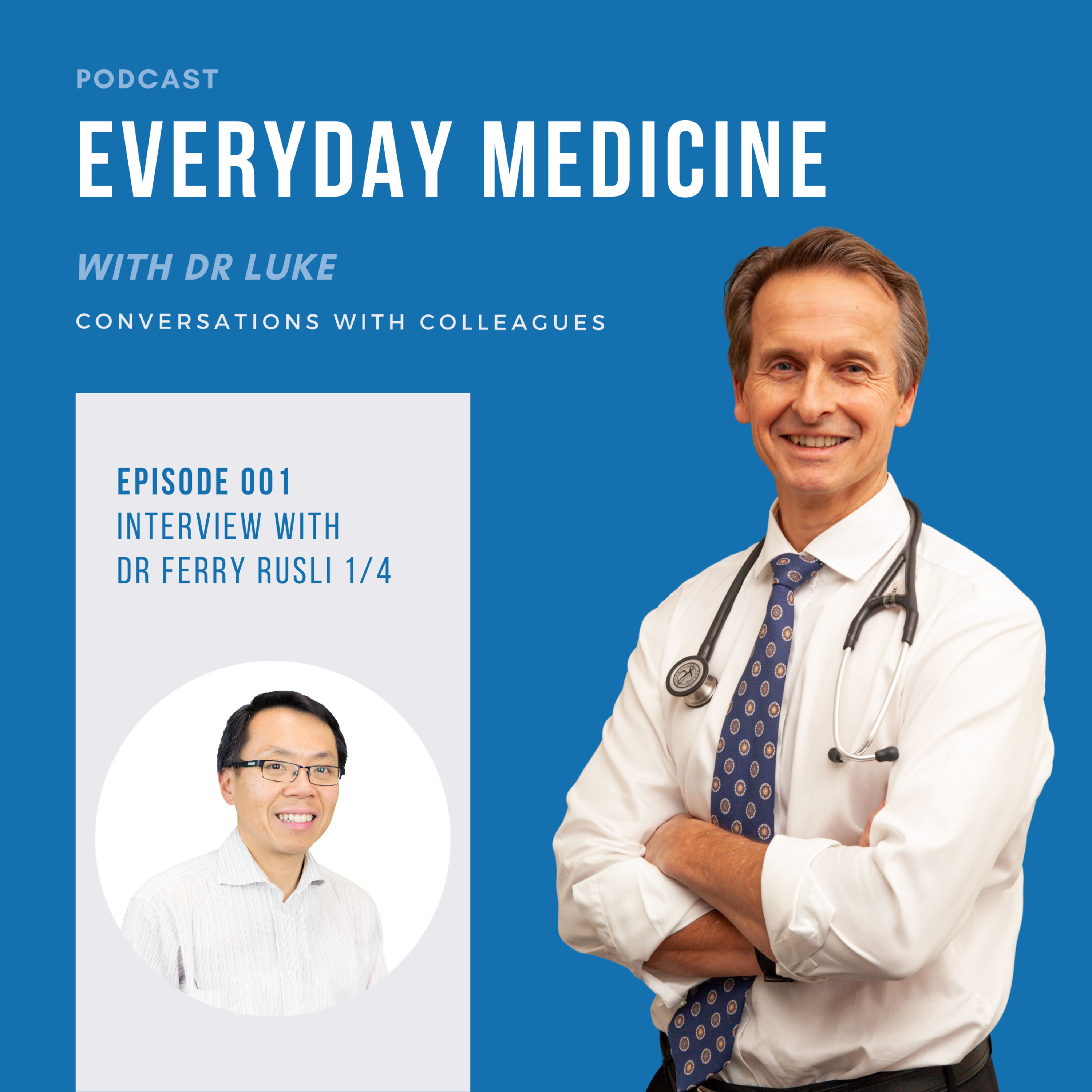
Everyday Medicine with Dr LukeEpisode 1. Abnormal Liver Function Tests with Dr Ferry RusliIn this episode I interview gastroenterologist and hepatologist Dr Ferry Rusli in the first of a four-part series on liver disease. Ferry discusses his approach to a patient presenting with abnormal liver function tests and navigates us through -
· Obstructive liver patterns
· Hepatitic patterns
Ferry will address in broad terms common aetiologies such as non-alcoholic fatty liver disease, chronic hepatitides, acute viral infections, biliary obstruction, malignancy and the possibility of drug side-effects. There are some great insights to be gained here. We also find out about Ferry’s journey into medicine growing up in In...
2020-08-2818 min